

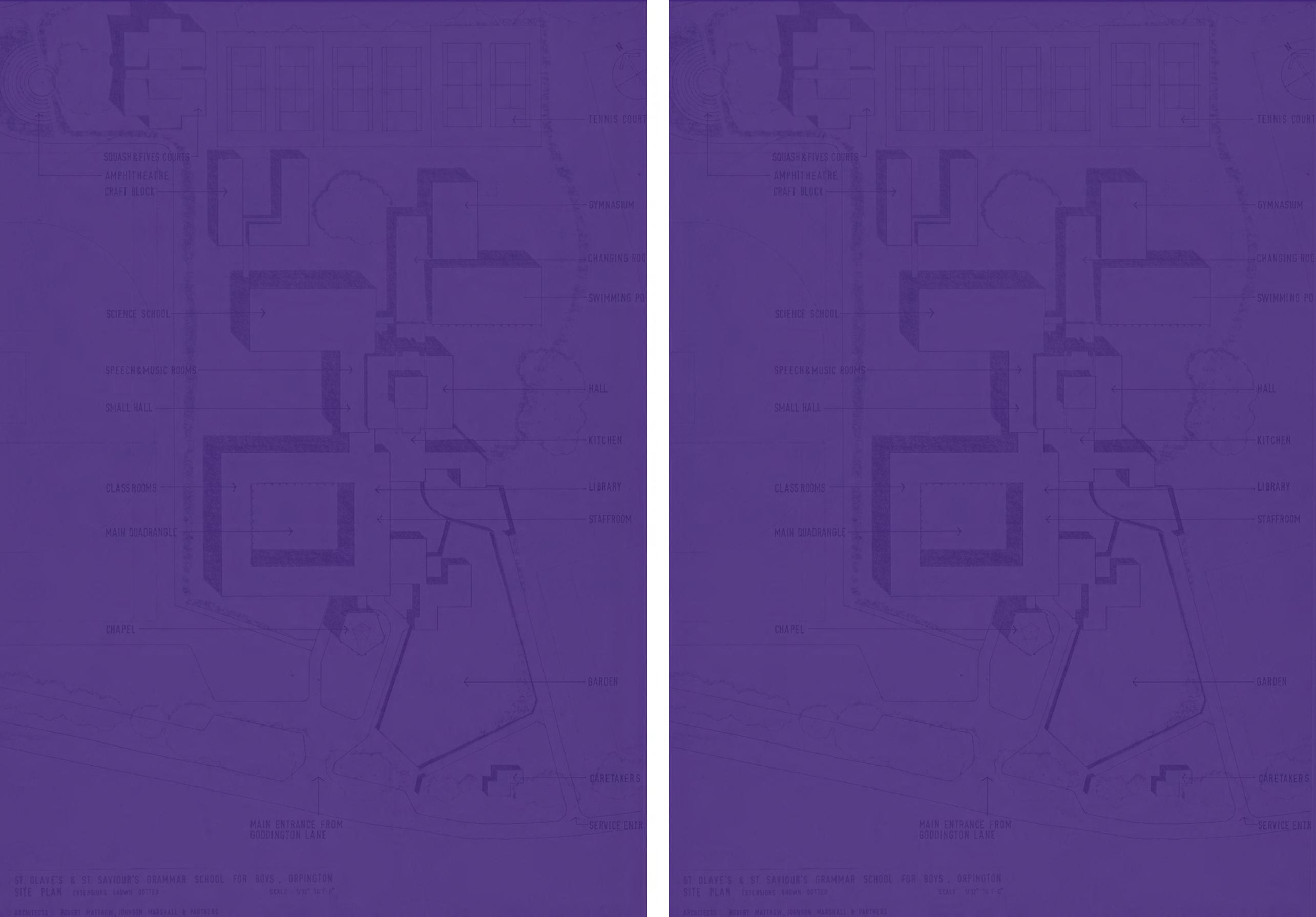
Vol. 127 2024
Olavian Editor: Tereska Taylor
Old Olavian Editor: John Brown
Assistant Editor: Michelle Sui

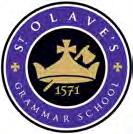


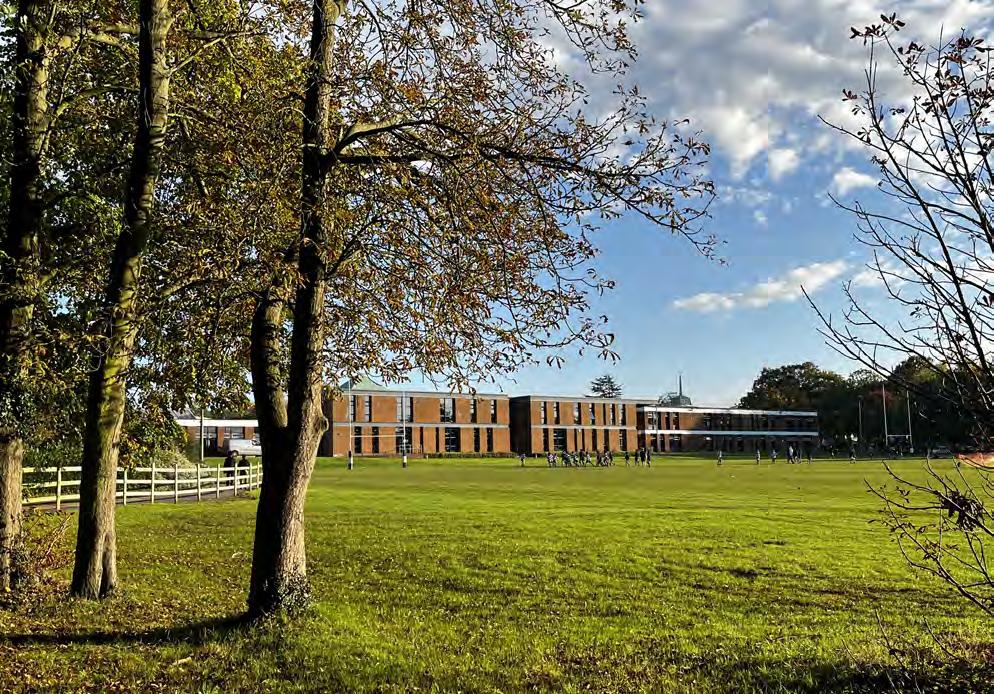





Vol. 127 2024
Olavian Editor: Tereska Taylor
Old Olavian Editor: John Brown
Assistant Editor: Michelle Sui






This magazine celebrates another remarkable year at St Olave’s, highlighting the dedication and commitment of our school community. Our diverse enrichment and co-curricular activities have significantly enhanced academic excellence.
We supported various charitable initiatives, including the Bromley Food Bank, Morocco Earthquake Appeal, and Movember. Our students and teachers participated in numerous community activities, such as singing Christmas carols, delivering postcards, and fundraising for education in India and Malawi.
Cultural and community events, such as the Cultural Evening and Inter-Faith Iftar, showcased our school’s diversity and raised significant funds for various causes. Our annual Festival in December was a resounding success, raising over £7000 for ‘Long Covid Kids’ and ‘Refuge’.
Our outreach work with local primary schools has expanded, benefiting many students. The transformation of our careers provision, thanks to contributions from Old Olavians and parents, emphasised the importance of community involvement.
Our vision of happiness and wellbeing is a daily practice, ensuring every student can succeed and become the best version of themselves. As you explore the highlights of St Olave’s during this academic year, I am confident you will find joy in these achievements. Thank you to everyone who contributed to making this year a success.
Andrew Rees Headteacher




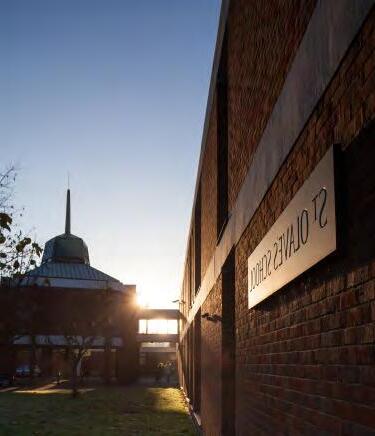
Thank you to Assistant Editor Michelle Sui for all her hard work in helping to put this publication together. Her dedication and support have been invaluable.
The Olavian is a record of the achievements of our amazing students and a true reflection of their inquisitive interest and in-depth knowledge across so many areas. As ever, a myriad of events and activities have taken place throughout the year, resulting in a huge number of student successes and achievements in a wide range of subject areas such as Olympiads, competitions, sports and music.
Thank you, once again, to the Headteacher, Senior Leadership Team and staff for all their hard work and for ensuring the smooth running of the school. Congratulations to all the students on their fantastic achievements.
Tereska Taylor Editor
Editor - The Olavian
Editor - The Old Olavian

Mrs. T. Taylor
St. Olave’s & St. Saviour’s Grammar School, Goddington Lane, Orpington, Kent BR6 9SH
ttaylor@saintolaves.net
John M Brown, Esq.

johnmbrown60@gmail.com

Chairman of the Governors
A. Boyd, M.A., M.Eng., A.C.A.
Foundation Governors
Appointed by the Lord Bishop of Rochester:
P. Bassett, B.Sc., F.S.A
Appointed by the Rochester Diocesan Board of Education:
Dr. M. Fallaha, MBBS, B.Sc, MRCS
The Revd. G. Rogers
S. Sharma
M. F. Sullivan, B.A.
Appointed by the Chapter of Southwark Cathedral:
S. Rose, C.Q.S.W.
Appointed by the St Olave’s and St Saviour’s Schools Foundation:
Dr D. Ryall. Ph.D., B.A.
D. McBride, B.A.
Appointed by the Dulwich Estate:
A. Fabian, M.A. (Oxon)
Appointed by the London Borough of Bromley:
R. Evans, B.Sc., DipEd
Elected Parent Governors:
A. Baldwin-Webb, LLB, CAMS, INT.AML
R. Bhatnagar, MBA
Elected Staff Governor:
Dr A. Abbattista, B.A., M.A., Ph.D.
Co-opted Governor:
S. Chaudhary, M.A., B.Ed.
S. Lambert, B.A. (Hons.)
Clerk to the Governors
R. Walters, M.A.(Cantab), A.C.A.
Senior Staff
Headteacher
A.J. Rees, B.Sc., University of Bristol
Deputy Headteacher
D.J. Budds, M.A., St. Peter’s College, University of Oxford (Curriculum)
R. Maxwell, B.A., University of Manchester (Pastoral)
Assistant Headteachers
M.D. Birtchnell, B.A. (Hons.), University of Exeter, M.A., Canterbury Christ Church University
Dr. A. Sidhu, B.Sc., UCL, M.Sc. University of Exeter, Ph. D University of Warwick
Chaplain
The Revd. Dr. J.E. Bowen, D.D. (UIC, Delaware), B.A. (Hons), Canterbury Christ Church University, B.Ed. (Hons), South Glamorgan Institute
Headteacher’s P.A.
T. Taylor, M.A., Swansea University
P.E. Holland, B.Ed. (Hons), Brunel University London
A.M. Kenward, B.A.(Ed.) (Hons), University of Exeter
C.E. Marwood, B.Sc., The Open University; L.R.A.M., Dip. R.A.M.
M.F. Sullivan, B.A., Westfield College, University of London
Dr. J. Bradley, B.Sc., Ph.D. King’s College & Royal Free School of Medicine, University of London
C. Johnson, B.Sc., University of Nottingham
K.A. Hodges, M.Eng., St. Catherine’s College, University of Oxford
M.G. Price, M.A., Trinity College, University of Cambridge
P. Vasileva, B.Sc., University of Sussex
V.E. Watson, B.A., University of Sussex
L.D. Espejo, M.A., University of St. Andrews
E.A. Goodman, B.A., University of York
R.E. Hawley, B.A., Middlesex University London
A. Wilkie, B.A., University of Warwick, M.A., Goldsmiths’ College, University of London
J.M. Munday, M.A., University of Cambridge
H. McPartland, B.Sc., University of Bristol
A. Lake, B.A., University of Nottingham
A.K.J. Carroll, M.A., University of Cambridge, M.A. University of London
P.J. Metcalfe, B.A., University of Warwick, M.A., School of Oriental and African Studies, University of London
S. Lands, B.A. (Hons), Ravensbourne College of Design and Communication, University of London
J. Morrell, B.Sc., University of Reading
R. Smith, B.Sc., University of Leeds
S. Difford, B.Sc., University of London
M.C.M. Twose, M.Eng., University of Nottingham
C.A. Benham, B.A., London School of Economics
K. Bishop, B.Sc., M.Sc., University of Bologna
Dr M. Ashford, M.Math, D.Phil., University of Oxford
R. Boyden, B.A., University of Surrey
Dr J. Carpenter, B.A., University of Cambridge, D.Phil., University of Oxford, M.Sci., Imperial College, London
N. Clegg, M.A., M.Sci., University of Cambridge
Dr S. Corlett, B.Sc., Ph.D., University of Liverpool
E. Pourjam, B.Sc., Sharif University of Technology, M.Sc., University of Tehran
H. Attwood, B.Mus. (Hons), Birmingham Conservatoire, M.Mus., Guildhall School of Music and Drama
S. Senaratne, B.Sc., Royal Holloway College, University of London
R. Zeshan, B.Sc., National University of Computer and Emerging Sciences-FAST-Nuces, Lahore
A. Clark, B.A., University of Plymouth
M. Wearn, B.A., University of Leicester
L. Probodziak, B.A., M.A., Somerville College, University of Oxford
Dr A. Abbattista, B.A., M.A., University of Bologna, Ph.D., University of Roehampton London
F. Affram, B.A., University of Ghana
A. Fasoranti, B.Sc., University of Ife Nigeria, M.Sc., Newcastle University, P.G.C.E., University of Greenwich
S. King, B.Sc., Queen Mary University of London
E. Roye, B.Sc., Kingston University London
I. Saunders, Licence es Lettres, University of Lille
J. Savage, B.Sc., University of Warwick
A. Shah, B.Sc. (Hons), University of Glasgow, B.Sc. (Hons), University of East London, M.Sc., University of Oxford
H. Smith, B.A., University of Bristol
T. Smialowski, M.Sc., King’s College London
M. Whiteside, B.Sc., University of York
M. Maugueret-Minerve, B.Sc. (Hons), King’s College London, M.Sc., Birkbeck College
K. Brown, B.A., University of Stirling
J. Napier, B.A.,( Hons), University College London
M. Pickett, B.A. (Hons), Aston University, Ph.D., University of Portsmouth
H. Scholefield, B.A., University of Exeter
A. Lay, B.A., University of Warwick
E. Foster, B.Sc. (Hons), University of Liverpool
M. Chung-Faye, B.Sc. (Hons), University of Birmingham
M. Johnson, B.Sc. (Hons), St Mary’s University, Twickenham
L. Prestipino, B.A. (Hons), Universita’ Cattolica de Sacro Cuore, Milan
A. Willmott, B.A. (Hons), Northumbria University
A. Alsaadi, M.Eng., Imperial College London
C. Cox, B.A., Ravensbourne College of Design and Communication
H. Le Roux, M.Sc., Ecole National des arts et Metiers
D. Lewis, B.Sc., University of Portsmouth
M. McCartney, B.Sc., University of Loughborough, M.A., University of Leeds
W. Morton, B.Eng., Brunel University
L. Rawe, B.Sc., University of Southampton
K. Tavares, B.Sc., M.Sc., University of Dar Es Salaam

Caroline Marwood, Head of Biology

Joanna Munday, Part-time Teacher of Mathematics/Head of KS5 Mathematics/STEP 2&3/Timetabling and Options
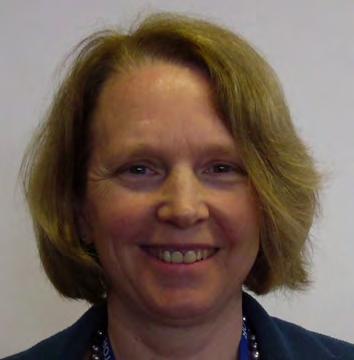
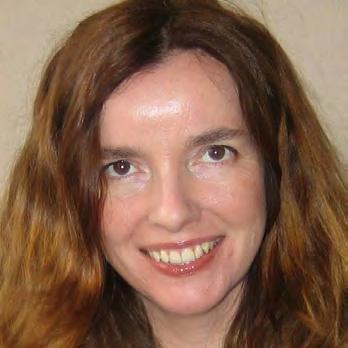

Daniel Espejo, Head of Humanities/Head of History

Hannah McPartland, Part-time Teacher of Science
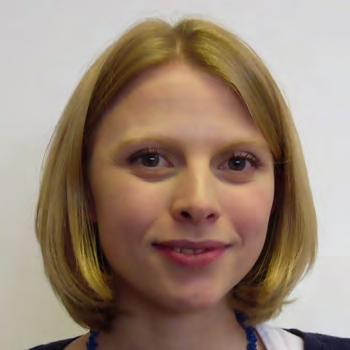
Esmat Pourjam, Part-time Teacher of Computing








Mr Andrew Jewson returns as a member of the Physics Department after a year’s sabbatical/ travelling. Andrew was educated at Steyning Grammar School and went on to the University of Bristol where he gained a BEng in Aerospace Engineering. After 26 years’ experience working in industry, Andrew decided on a change of career and accepted a Schools Direct training position with Qualitied Teacher Status at Canterbury Christ Church University. Andrew is a keen sportsman, both playing and coaching Hockey. He has developed extensive ICT skills and experience throughout his professional career. Andrew is a French speaker and plays the piano and flute.

Mrs Zoulfia Hall was educated in Russia where she gained a BSc in Russian Language and Literature at the Pedagogical Institute of Russian Language and Literature, followed by a Diploma in Arabic and Persian Languages at Moscow State University. Zoulfia has a BSc in Internet Computing from SBU and an MSc in Computer science from Queen Mary’s University of London. Zoulfia completed her PGCE at University College London. She has extensive knowledge of computer programming and systems and has applied these skills across many commercial companies. She has also been involved with the British Informatics Olympiad, the Amazon Challenge for Innovative Ideas in Technology and has led a Computer Programming Club.
Receptionist
Mrs Katy Smith
Teacher and KS5 coordinator of MathematicsMr David Asfu Adjaye
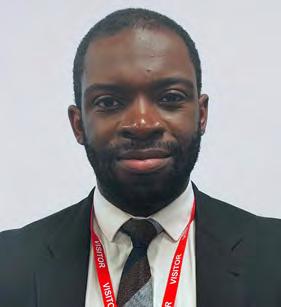
Mr David AsafuAdjaye was educated at St Olave’s Grammar School and went on Brunel University where he gained a BSc in Financial Mathematics. David worked in the private sector prior to a change of career and accepting an Equalitas training position. David completed his teacher training at St Olave’s, and has worked in a variety of schools including Chislehurst and Sidcup Grammar School and most recently as Head of Maths at Wilmington Grammar School for Boys. He has a keen interest in Music and is proficient on the drums, bass, guitar and keyboard. He enjoys athletics and is a rugby coach and referee.
Teacher of Mathematics - Dr Gareth Williams

Dr Gareth Williams was educated at Llantarnam Comprehensive School and went onto King’s College, London where he gained an MSci in Mathematics and Physics with Astrophysics. He then attended Queen Mary University of London where he gained a PhD in Astronomy which included working as an astronomy academic researcher where he worked as a programmer on the NSAS-ESA-ASI Cassini space mission. He has experience as Head of Mathematics, Stage 5 Maths Lead and Data Co-ordinator, has mentored trainees and was a member of the coaching team delivering CPD to staff across the school.
Part-time Rugby Coach/Cover Supervisor
Old Olavian Mr Ciaran Corcoran (Autumn/Spring Terms only).
Part-time Sports Coach
Old Olavian Matthew Okonji (Autumn Term only).
Part-time Teacher of Mathematics - Mr Sami Choudhary (Apprenticeship/Teach in Kent).
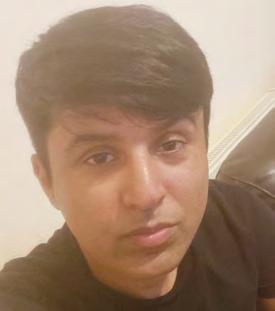
Mr Sami Choudhary attended St Francis Xavier Sixth Form College and went on to Warwick University where he gained a BSc in Mathematics. This was followed by a Postgraduate Diploma in Mathematics from King’s College London and an MSc in Mathematics from Queen Mary, University of London. Sami completed his teacher training at the Institute of Education, UCL London. He is proficient in the use of MS Excel and is a cricket and athletics coach.

Miss Molly Wade was educated at Darrick Wood School and went on to the University of Greenwich where she gained a BSc in Mathematics. Molly then attended King’s College, London where she completed her PGCE. Molly has been involved with the Duke of Edinburgh Award Scheme and is keen to pursue this further.


Ms Danja Sanovic was educated at Onslow College, New Zealand and went on to Massey University where she gained a BA in Education and in Sport Event Management. Danja relocated to the UK in 2004 and has recently graduated with an MA in Creative Writing and Education at Goldsmith’s University. Danja has experience of writing UCAS applications, has been involved with the organisation of external trips/activities and with the supervision of EPQ presentations.
Head of History - Mr Alexander O’Halloran

Mrs Joanne Anderson was educated at Bromley High School and went on to the University of Bath where she gained a BSc in Biology. Joanne worked in the private sector prior to a change of career. She completed her PGCE in Secondary Science at King’s College, London. Joanne has been involved with inter-form competitions and the writing of UCAS references. She is a CCF Civilian Instructor and has been involved with Duke of Edinburgh expeditions.
Mr Alexander O’Halloran was educated at St Olave’s Grammar School and went on to the University of Warwick where he gained a BA in History and Politics, followed by an MEd from Cambridge University. Alexander then completed his PGCE at Cambridge University Faculty of Education. He has organised external trips and visits across all year groups and has represented his school at PTI events.
Alexander is a keen sportsman and is both a rugby and American football coach. He has close ties with the NFL Academy and has coached multiple National title winning teams.
Teacher of Art (trainee)
Miss Natalie Todd joins us as a Teacher of Art through Teach in Kent.
Teacher of Biology (trainee)
Old Olavian Mr Maciej Szczyrba joins us as a Teacher of Biology through Teach in Kent.
Teacher of Computing (trainee).
Miss Samantha Hawkins joins us as a Teacher of Computing through Teach in Kent.
Teacher of English (trainee)
Miss Emily Edmunds joins us as a Teacher of English through Teach in Kent.
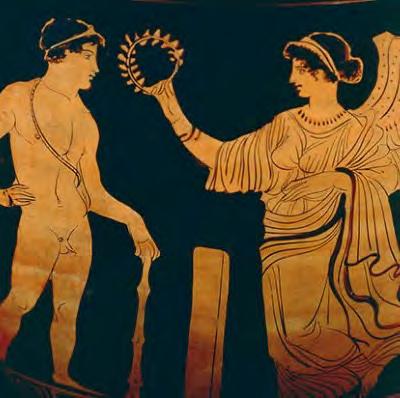


Prize Day Speech by the Headteacher
Honoured guest, Senior Provost of the Woodard Corporation, Justin White, Chair, Warden of the Foundation, Students, Parents, Members of Staff, Governors. It is a pleasure to welcome you to this celebration of the achievements of our prize winners as we reflect on another excellent year.
Nelson Mandela said that “Education is the most powerful weapon which you can use to change the world.” This quote emphasizes the immense power of education in creating a thriving and successful community. It reflects the goal of nurturing young people to be happy and successful contributors to society.
My speech this evening will look at our ongoing mission to produce young people who are happy and successful within a flourishing community. I will touch on happiness and success, but I want to look deeper at St Olave’s as a community because a school is not just the buildings, the pupils, and the teachers we see here today.
Our commitment to the wider community is evident through various initiatives. We have supported the Bromley Food Bank with our Harvest Collection, organized a bake sale for the Morocco Earthquake Appeal, and participated in Movember to raise awareness for men’s mental health. Our Chapel and Gospel choirs brought joy by singing Christmas carols at Christ Church, Orpington, and our students contributed to Bromley’s Christmas Card Project to support those experiencing loneliness.
Year 10 students embraced the Christmas spirit by delivering handwritten postcards to the residents of Goddington Lane and fundraising for the education of young people in India and Malawi through the Wings of Hope Award by organizing events, such as a Movie Night. We also celebrated the life of Old Olavian Harry McAleer with a morning of social rugby, raising funds for the Wellbeing Garden.
Our students’ outstanding contributions were recognised at the Bromley Rotary Club Youth Awards ceremony. Special congratulations to Year 11 student Sahishnu for his incredible fundraising efforts for Mencap Marvels and swimming achievements being part of a team, which swam the English Channel, and to Year 13 student and Vice-Captain, Wafi, who received the Edward Alleyn Award for demonstrating creativity, enterprise, and philanthropy.
Our teachers have also shown immense dedication, participating in a charity basketball match to raise money for the education of children in Malawi and India. English teacher Mrs Metcalfe and Languages teacher Mrs Probodziak raised funds for Oxfam and Cats Protection, respectively, by running the London Marathon.
We hosted a Cultural Evening event, with proceeds benefiting our Wellbeing Garden and community endeavours run by the Yog Foundation. The Black History Month Show was another amazing celebration of the school’s diversity, and our Inter-Faith Iftar event, themed around science and religion, brought together members of Jewish, Muslim, Hindu, and Christian faiths for a meaningful dialogue, and helped raise over £1700 for Médecins Sans Frontières.
Our annual Festival in December was a resounding success, raising over £7000 for ‘Long Covid Kids’ and ‘Refuge’. The event was filled with entertainment and enjoyment, showcasing the spirit of our community.
Thank you to everyone who has contributed to these incredible efforts.
I am delighted to share the remarkable progress we have made through our outreach work with local primary schools. Our efforts have not only continued but expanded, and still include inviting primary students to participate in our Maths and Science Day. The work has now grown beyond just supporting students in Maths and Science, and we offer English, Languages, and History as part of our outreach work.
It is heartening to hear from Headteachers who have shared how their children have benefitted immensely from our expertise. They have experienced a broader curriculum, enriched by the challenges and breadth of knowledge we have shared with them. The focus on disadvantaged students has provided a real opportunity for these children to learn in an exciting and challenging environment, leading to enhanced attainment and progress.
Our careers provision has undergone a transformation, thanks to the invaluable contributions of Old Olavians and parents. They have spoken to our students about a wide range of careers, from setting world land speed records to the life of a classical opera singer. This truly emphasizes the importance of community involvement
beyond the school.
I want to highlight another cornerstone of our school’s identity: outstanding pastoral care. This is not just a phrase we use; it is a commitment that demands time, energy, planning, and coordination from our dedicated teachers and pastoral staff.
Let me share a story that exemplifies this commitment. In 2023, a student in Year 13 faced significant personal challenges and could not sit for his exams. We were deeply concerned, but we knew that continuing to support him after he left was the right thing to do to achieve his academic potential. Throughout the year, our staff provided unwavering academic and emotional support. On the day he finally sat his exams in July 2024, friends from his year group who were on holiday from university were there to meet him at school to support him further. When he returned on results day, he was understandably anxious. Mrs Ward, our pastoral support worker, stayed with him and his mum as he checked his results. Despite the challenges, he succeeded and is now on his way to university to study law. His resilience was immense, and before he left, he expressed heartfelt gratitude to our staff, saying, “I cannot thank you enough for the support you and the school have given me over the years. I could not have done this without the people around me.”
This story underscores the essence of pastoral care: knowing our pupils’ unique circumstances, building strong relationships, and responding to their needs with high expectations and unwavering support. Our vision of happiness and wellbeing is not just an ideal; it is a daily practice. Our staff go above and beyond to ensure that every student can be successful and become the best version of themselves.
Our students have embraced opportunities far and wide, from international exchanges and battlefield visits to exploring the stunning landscapes of Iceland with Year 12. Language visits took us to France, Spain, and Germany, while nationally, we explored Hadrian’s Wall on a Classics Trip and celebrated a triumphant cricket tour to Bath. Our students’ engagement in the Duke of Edinburgh’s Award has been impressive, with expeditions across Kent and Wales.
For those with musical talents, there have been ample opportunities to shine. Our music concerts and royal performances, including the Wakeham Choristers singing for a Service of Praise, Remembrance, and Dedication, have been truly memorable. The school production of Arabian Nights showcased the incredible talent of our students, supported brilliantly by performers throughout the school.
Sport continues to enrich our curriculum, with Saturday morning rugby fixtures, netball matches, an outstanding Fives season, and competitive hockey fixtures on our All Weather Pitch. Our U19 Football Squad’s hard work paid off as they became runners-up in the North Kent Division 1 League, and our cricket teams achieved success at county level.
It would be amiss of me not to mention Old Olavian Aaron Grandidier, who left in 2017 and became the first British athlete to win a Gold medal at the 2024 Olympics – but representing host nation France.
Aaron played a crucial role for France’s rugby sevens team as they won their final against Fiji. If you look at the replay as he scores a try in the quarter-final you can see the St Olave’s crest on the back of his boots. Having this crest as he played was crucial to him so he could reflect on where his rugby career had started, which was on the rugby pitches around the school. He contacted me a week after the triumph saying: ‘The past week has been a bit blurry but I still can’t believe what we’ve just done.’
It was lovely to see a photo of him in the stands with his gold medal but also with his old teammates from St Olave’s after the final. Another example of the importance of community, belonging, and being there for each other through good and bad times.
We are dedicated to maximising student outcomes through high-quality teaching. Congratulations to our pupils on their outstanding examination results!
• 93% of grades at A Level were A* to B
• 49 pupils achieved 3 A* grades or more
• 95% of grades at GCSE were 9-7
• 12 students secured all 9s
St Olave’s was prominent in league tables both at A Level and GCSE in the Times, and with other similar academic grammar schools. Our external exam results were truly superb. Well done to our amazing pupils!
So, our outgoing Year 13, as you stand on the brink of a new part of your life, I want you to remember that you are stepping into a world where platforms are being built for the next phase of technology, where research is leading to groundbreaking medical advances—perhaps even cures for cancer, MND, or dementia. We really need our amazing pupils to be part of this future.
• To run companies and make decisions ensuring diversity is celebrated, equality is championed, and equity is prioritised.
• To serve at the highest levels of government and guide our country.
• To work in our hospitals and classrooms, and hopefully return to St Olave’s to support future Olavians.
• To shape the future of technology.
Your perspective will make our communities stronger. Be true to yourself, hold close the values instilled in you by your parents, family, and this school.
Remember, you are never alone. You will always be part of an amazing caring and considerate community, as current Olavians or as Old Olavians. The school was founded 463 years ago and I hope our community shines as strong and as bright as ever!
Thank you for being an amazing bunch of young people. Thank you to the parents. We are immensely grateful that you have trusted us to look after your child. Thank you to my colleagues who have supported you since you joined St Olave’s. Finally, leading this school is the greatest honour. With records numbers applying for places in Year 7 and Year 12, record exam results, a Gold medal winner, Olavians swimming across the channel, I really feel the school continues to evolve and go from strength to strength. I wish you every success as you move onto the next stage of your education, and ask that you continue to honour the enduring legacy of this remarkable institution, which continues to produce young people who are happy and successful within a flourishing community.
Prize Day Speech by Director Of Sixth Form, Matthew Birtchnell
Honoured guest, Students, Parents and Carers, Members of Staff and Governors. As always, the last academic year passed incredibly quickly and was once again incredibly busy in the Sixth Form, with a schedule of events incorporating music, drama, sport, societies, trips, as well as lectures, talks and fundraising. The students threw themselves in to every opportunity given to them and really benefitted from the personal development opportunities that the Sixth Form here offers.
The exam results achieved by Year 13 were impressive. As we have already heard, 93% were at grades A* to B, a phenomenal achievement for the year group. But all the grades issued this summer are a reflection of
hard work and dedication. The path is not smooth for everyone, with some facing more challenges than others, however every student in Year 13 should be commended for their resilience and for their determination, and congratulated for what they have achieved. The students in the Sixth Form are talented and ambitious and I would like to congratulate them all. I know that they will continue to go on and develop both personally and academically, achieving great things in the future. To our prize winners, your families will be proud of you and the school community is too. Well done on your successes.
The achievements of the Sixth Form are not just exam based. They were the first cohort to complete EPQs as part of the elective programme in Year 12. The essays and presentations produced for this qualification were, as ever, truly exceptional with the usual impressive range of well researched topics, reflecting the wide and varied interests of our students. The presentations which form a key part of the qualification were this time delivered in class, allowing everyone in the cohort to share their research findings and question each other. The support offered to one another during these presentations was pleasing to see. The grades achieved reflect the efforts that went into this qualification and the experience has given students an insight into the research and writing skills they will need in the future. Engagement on this academic level really is one of the hallmarks of the Sixth Form here.
Clubs and societies within the Sixth Form go from strength to strength, and last year saw a drive to create more opportunities for younger students. As always, the Year 13s took over the leadership of the societies and did an expert job at developing what is on offer. Talks were as broad and as inspiring as ever and the range of external speakers also continued to increase, with a notable variety of former students coming back to share their expertise with the cohort. These societies give so much to our students - they allow them to engage with topics of interest, they develop academic skills such as research and presenting, but they also give independence and confidence. Thank you to all those who are involved, be it as president or vice-president or as a regular attendee. We were also fortunate to see the revival of the Olavian Lecture series, championed by the Senior Prefect Team. The talks varied from science to history and we were fortunate to be joined by students from other local Sixth Forms.
There were many other achievements beyond the curriculum. Numerous individuals and groups took part in many competitions and achieved highly in these. For example, William was successful in the prestigious Anthea Bell Translation Competition run by Queen’s College Oxford. Olivia was awarded Silver in the incredibly challenging UK Linguistics Olympiad.
Anusha was rewarded for her excellent performance in the Mathematical Olympiad for Girls. Numerous students were highly awarded in the Maths, Physics, Biology, Chemistry and Computing Competitions that run each year. This is just a small selection of the many super-curricular activities that our students get involved with.
The students have also demonstrated great commitment and determination in sport. They have also shown exceptional leadership and have been excellent role models for younger students in their roles as Sports Prefects. There have been some incredible personal achievements in a wide range of sports, such as Raphael in modern pentathlon and Nilay in table tennis. Last week, many in the year group came back to play against the current Year 12 and 13 during our Young Olavians’ Day. It was great to see them back in school once again and I would like to thank Tommy, Patrick, Mr Kenward and all others who were involved in organising this. We must also extend our thanks to the staff who freely give up their time outside of school to work with students and give them opportunities outside of the curriculum. This does not of course apply solely to sport, but to the many other activities that are on offer throughout the year. A further example that stands out was the school play, the Arabian Nights, which saw many students across the school give excellent performances, but had a significant number of Sixth Formers take up lead roles and captivate the audience with their acting skills. There are then of course the many music concerts throughout the year which have seen excellent performances from the outgoing Year 13.
A key event on the Sixth Form calendar is Cabaret, which was once again an excellent event, with many fantastic performances over the evening. Alongside Festival, the students showed their abilities to plan and run large scale events and raise several thousand pounds for charity as a result.
The Sixth Form provides students with many opportunities to develop their skills beyond the academic. A large number serve as prefects and therefore have the opportunity to develop their leadership skills. Well over 100 students took up prefect positions and were once again able to engage with tutor groups in the younger years and organise events within academic departments. The Senior Prefect Team of Aditi, Thaddeus, Olivia, Wafi, Isla and Tommy achieved a great deal throughout their time in post, not least taking a leading role in the events mentioned above. Alongside the Sixth Form Association, the voice of the Sixth Form students could be fed into the work of the school and many initiatives were introduced which will benefit future generations of students. The school is incredibly thankful for the work of all prefects and the developments that they leave
behind.
Every student in Year 13 has very much risen to the challenge of Sixth Form and all of them have made the school proud. You have shown empathy, resilience and good humour. It has been a pleasure to work with you. You have demonstrated the skills and qualities that we would hope for our students to have and that will allow you to make great contributions to the world around you in the future. On behalf of the whole school, I would like to thank you for everything you have done, congratulate you for everything you have achieved, and I wish you every success as you embark on the next stage of your lives.
“To
right the wrong”. That is your motto. To right the wrong.
However, to know right from wrong requires you to know what is right, which requires you to know what is true. Because you can’t very well be said to know something if it is false. Therefore, if you are true to your motto, you are a school engaged in a serious seeking after truth. From what I have seen of your excellent school, that is certainly true!
I want to ask an even bigger question this evening: What is truth? It’s a noun, isn’t it? Truth is some-thing. But in urging you to be true to your motto, I’m using ‘true’ more in the sense of a verb. Not some-thing, but a process, an enterprise, an activity, something done together.
Which is a truer sense of truth? No, truly, I ask you!
Philosophers have different theories of truth. The most common-sense one is the correspondence theory of truth. A statement is true if it corresponds to a state of affairs about the world out there which is the case. “The world is round” is true because it corresponds to the fact that the world out there is indeed spherical and round. (Apologies to any flat-earthers in the room. I’m sorry –you’re wrong! That’s not true.)
The problem with the correspondence view lies in the phrase ‘out there’ – referring to something beyond me, beyond my utterance of the statement “the world is round”, and beyond my mind. If we pause to consider it, we realize we have no direct access to this ‘out there”. Our knowledge is never independent of the mind; we can only know what we experience as we know it through our five senses. So, does a world that exists entirely ‘out there’, completely independent of the mind, actually exist? I believe it does, but I cannot know it for certain.
Another theory is the coherence theory of truth.
Something can be said to be true if it coheres with and agrees with other things that we hold to be true. “The sun orbits the earth” is not a true statement under the correspondence theory, because the sun does not orbit the earth; the earth orbits the sun. But were we living in an age before the astronomers Copernicus or Galileo, in the age of Ptolomy, say, “the sun orbits the earth” would be a true statement under the coherence theory of truth because it is a statement which cohered with all the other mathematical and astronomical and religious beliefs of the time.
And before you say, well now we know that “the sun orbits the earth” is wrong thanks to our modern enlightened understanding of astrophysics and astronomy … well, who’s to say that our ‘established’ scientific truths are themselves not going to be overturned by new scientific discoveries – as happened with Copernicus and Galileo, and in the 20th Century with the shift from a Newtonian to a relativistic quantum paradigm? What makes our truth truer, more coherent? Are we converging upon truth as time goes by? Who knows?
I was struck by this while watching the presidential debate between presidential hopefuls Donald Trump and Kamala Harris. Trump was being fact-checked by the moderators and commentators in real time. Perhaps “Democrats murder babies” is true. Perhaps “Immigrants eat cats and dogs” is true. Perhaps “Trump won the 2020 election” is true. Because all these things cohere with a wider suite of beliefs of those who inhabit the MAGA world.
So, what about the consensus theory of truth? It suggests that what is true is simply what most people agree upon. But this idea seems unconvincing, as I think you’d agree. For one thing, if people generally rejected the consensus theory (which many do), it would be self-defeating, since by its own definition, it would be untrue. Moreover, determining what’s true would require an endless series of referenda. And of course, the majority can be wrong – just as they were when most people believed the world was flat or that the sun orbited the Earth.
Another issue with the consensus theory of truth is that it would prevent the discovery of anything new. When someone first proposed the radical idea that the Earth is round and orbits the sun, the consensus at the time would have been: “Nope, that’s false!” According to the theory, those statements would be false by definition. But, of course, they aren’t!
What about a relativist theory of truth? There is no one clear truth; everything is context-dependent. Or the social constructivist theory of truth: truth is simply made up by society, probably by some powerful elite to disenfranchise others.
Help! Perhaps we need to give up on the idea of truth completely.
Truth, I believe, is rarely pure, and never simple, but it does exist. It is, though, not certain. Perhaps we need to stop equating truth with certainty or correctness. Why do we insist that truth must either be certain or else not exist at all? Truth does exist, but it is not certain. This uncertainty isn’t a flaw; it reflects the complexity of what we are trying to understand. Truth is uncertain not because it lacks substance, but because it is rich, intricate, and multifaceted.
No one, regardless of their beliefs, has ever truly lived as if there were no truth. But we should let go of the idea that truth must be infallible. Outside of mathematics, there is no ironclad certainty anywhere. What we do have are varying degrees of truth, some of which carry immense weight and gain greater conviction through experience. Truth always involves personal judgment, but that judgment should, and must, consider the perspectives of others. Judgments are far from arbitrary. They are informed by experimentation, perception, reason, intuition, and imagination. This doesn’t make them less reliable than judgments based on a single source, like pure reason or logic. In fact, it makes them more reliable. The goal of developing sound judgment is to integrate perception, reason, intuition, imagination, and even instinct. That was, and still should be, the true aim of education.
And that is why you need a broad curriculum in your education. It is why we must study the humanities alongside the sciences. And I say that to you as someone who studied Double Maths, Physics, and Chemistry at A-Level and read Engineering at university … and really wish there’d been a bit more of the humanities in that mix.
What history, classics, literature, religious studies – the humanities – offer us cannot be found in the sciences, yet it is vital. Today, we seem to have lost sight of this critical understanding, even though the future of our civilization depends on it. Instead, we often reduce truth to a matter of declaring, “I’m right, you’re wrong,” and shouting louder to prove it. We must give due respect to poetry, art, music, imagination, and myth as pathways to truth. The deepest truths, in the end, can only be conveyed through the language of poetry.
If we focus on truth as a relationship rather than a fixed ‘thing’, certain aspects become clearer. It includes both parties involved – you, me and you-and-me – and does not reside in either one of us alone. This means that truth is inherently lived, dynamic, and shaped by context. But this doesn’t make it any less real; in fact, it is most real precisely because of this. Truth is deeply grounded in experience.
One of the greatest challenges you face today is determining what is true. Fake news is everywhere, though it’s not a new phenomenon. Throughout history, those in power have manipulated facts to present lies as truth. However, something different is happening now. Lies are often accepted as truth because the very concept of truth is breaking down. ‘Truth’ is increasingly reduced to statements like “This is what I believe” or “This is what I think should be true.” Society has become more polarized; drifting away from shared narratives and instead forming entrenched groups based on common interests. With social media giving everyone a platform, knowledge has become decentralized, leading to competing narratives. At the same time, traditional power structures are distancing themselves from scientific knowledge, embracing populist politics that are increasingly sceptical of expertise. A clear example of this was the last American administration’s rejection of the scientific consensus on human-caused climate change.
Where is truth in all this noise?!
Now, this isn’t a sermon, but you can see that I am a Christian priest. I want to tell you about a crucial moment in the Christian narrative.
It occurs in the Gospel according to St John in the New Testament. It’s a standoff between earthly power in the shape of Pontius Pilate, provincial administrator of the world’s superpower, Rome, and earthly powerlessness in the shape of Jesus son of Joseph, wandering Galilean carpenter-turned-rabbi. The contrast between a somebody and a nobody couldn’t have been more stark. And Pilate asks the most important question in the whole of the Bible … no, in the whole of philosophy. “What is truth?”
People, turn off your TVs, put down your phones, stop whatever you’re doing. The only question that really matters has just been put to Jesus – who is, for some of us, the Son of God. Grab a pen!
And no reply is given. At least, no verbal reply is given.
The narrative is, of course, written in Greek. And the word translated ‘truth’ is ‘alethia’. You might know what lethia means because it is the same root as that of the river in the classical underworld – the River Lethe – through which the souls of the re-incarnate pass imbibing its waters to forget their past lives. So it means to forget. Putting an ‘a’ on the front makes it negative – a-lethia. So truth, alethia, is literally a ‘not-forgetting’.
What could that possibly mean? Truth is a not-forgetting?
I suggest that Jesus’ lack of an answer means this: What is truth? You’re looking at it, Mr Pontius Pilate.
Now I’m not going to impress upon you my belief that Jesus is the Truth. (Although, it so happens that I do believe that). What I mean is: This is the truth, Mr Pontius Pilate. This situation is the truth; the situation that brings an innocent man to his knees before the powerbrokers of the age; the situation that makes the powerless the scapegoat for the conflicts of the powerful. Truth is a not-forgetting, a never-forgetting that this is how power works.
Truth is not a formula; truth is not a philosophical axiom; truth is not a political treatise; truth is not a thing. Truth is an honest not-forgetting of the lies that define our common life, and a serious taking to heart of how we are complicit in those lies.
I cannot let today’s date pass unnoticed. It is the 11th of September. Or, as the Americans say, 9-11. None of you were alive on 9-11 2001, but for any of us alive in the 21st Century, it remains an egregious date; a horrific date in our common political life. 23 years ago today, four commercial airliners were hijacked over the United States. Two were crashed into the Twin Towers of the World Trade Center in New York City. One struck the Pentagon in Virginia. The fourth crashed in rural Pennsylvania. 2,977 people were killed, making it the deadliest terrorist attack in history.
Picking out the truth from the lies of 9-11 has been almost impossible. But what we do know is that, in response to the attacks, the United States and her allies waged a multi-decade global war on terror to eliminate hostile groups deemed terrorist organizations, as well as the foreign governments purported to support them, in Afghanistan, Iraq, Syria, and several other countries. We live in the aftermath of that today, and its repercussions still fill the news cycle.
Where was truth on 9-11? Perhaps it lies in a profound not-forgetting.
There was a tiny little story that emerged on the evening of 9-11 that got completely lost in the news coverage. It’s so insignificant that it got drowned out by all the noise. A group of Christians from various Manhattan churches got together spontaneously with a bunch of Jews from local synagogues and formed a human chain that encircled the mosques of Manhattan so as to create a protecting ring around those places of worship so that Muslim worshippers going in and going out to say their prayers could pass safely and without harassment and violence.
Where was truth on 9-11? There was, to my mind, a glimpse of it in that act. And it needs to be remembered and never forgot. It wasn’t measurable, or certain. It didn’t necessarily correspond to a state of affairs, or cohere with other beliefs. It wasn’t a consensus act. But it was about a profound acknowledgement of relationship and a shared humanity.
You want to right the wrong? Well, never forget!
Never forget the gifts that a good liberal education has given you – the gifts of critical discernment of received wisdoms, of respectful attendance to alternative views, of empathic reverence for those less fortunate than you, of righteous indignation toward violence and injustice and apathy, of risky preparedness to embrace difference.
And, if I might paraphrase St Paul from my Holy Scriptures, “Finally, brothers and sisters, whatsoever things are true, whatsoever things are honest, whatsoever things are just, whatsoever things are pure, whatsoever things are lovely, whatsoever things are of good report; if there be any virtue, and if there be any praise, think on these things, and never forget them. Those things, which ye have both learned, and received, and heard, and seen in this place, do and never forget, and the God of peace shall be with you.”

Giles Pilcher Prize for Public Service
(Awarded by The Old Olavians’ Lodge)
Thaddeus Otuoze
Aditi Rai
Wafi Ali
Isla Clark
The Headteacher’s Fund Prizes
Chambers Prize for Leadership
I.W. Kirk Prize for Sportsmanship Benjamin Dakshy
Senior Victor Ludorum Chinedu Ndukwu
Ben Read Trophy Ethan Abeelack
Douglas Keeble Prize for Fives Thomas Farmer
Sidney Tweedy Chess Cup Saahil Bansal
Thomas Farmer
Olivia Tang
Thomas Farmer
The Anthony Jarvis Shield Kalyani Vishnu
The Woodard Board Prize
Michael Pugh Prize for Public Speaking
The Renshaw Shield for Debating
Headteacher’s Prize for Poetry
O.O. Lodge Prize for Contribution to School Life
The Medical Fund
Cathedral Parish Prize for Voluntary Service
Olivia Tang
Olivia Tang
Benjamin Sharp
Micah Sedghi
Joshua Miles
Mikel Emele
Kate Smith
Leslie Sanders Prize for English Literature Emy Bengtsson
French Prize
Elo-Oghene
Esalomi
A.W. Walker Prize for German Jay Osborne
Matthew Holmes Prize for Classics
The Ashley Prize for History
Antiquarian Society Prize for a History Project
The Alan H. Sainsbury Memorial Prize for History
The Sarah Beston Memorial Prize for Geography
Economics Prize
Harry Little Prize for Mathematics
Paul Slade Prize for Physics
Brian Ruth Memorial Prize for Physics
Gnaanachelvan Prize for Biology
Biology Project Prize
George Dyson Prize for Chemistry
Chemistry Experimental Skills Prize
Computing Prize
Phyllis Packer Prize for Practical Musicianship
An Old Olavian Prize for Music
Olivia Saunders
Max Acton
Thomas Farmer
Suzanna Wade
Mohammed Anas
Nuvin
Wickramasinghe
Ben Joshua Yip
Frank Gubars
Ojas Tiwari
Lydia Ho
Bhelina Banerjee
Jack He
Emily Davies
Anton Lewis
Anusha Selva-Radov
Benjamin Dakshy
Religious Studies Prize Ben Joshua Yip
Art Prize
Graphics Prize
Design Prize
Susan Owen Medal for Drama
L.W. White Prize for Sporting Activities
Laura Smolen
Amy Tu
Jake Leedham
Olivia Saunders
Raphael Huille
Gordon James Christie Prize for Cricket Vihaan Gopireddy Arnav Singh
H.G. Abel Prizes for A-Level
Ayokunmi Adebayo Devadutt Kuragayala
Mohammed Anas Jake Leedham
Bhelina Banerjee Anton Lewis
Emy Bengtsson Naman Malhotra
William Blackwood Kanishq Manocha
Edoardo Bognolo Rhaedian Maranan
Oscar Brockwell Daisy McMillan
Aditi Chakravarthi Samuel Ojeabulu
Maria Comarita Ayomide Olafimihan
Phoebe Cook Jay Osborne
Benjamin Dakshy Thaddeus Otuoze
Emily Davies Natalia Pilu
Mikel Emele Aditi Rai
Gagan Gnawali Debangshu Saha
Frank Gubars Arjan Sandhu
Lydia Ho Anusha Selva-Radov
Saumya Houji Amish Singh
Raphael Huille Kishaanth Sivathasan
Arjun Javagal Abhinav Tavva
Amitan Joseph Ojas Tiwari
Yash Joshi Amy Tu
Ben Joshua Yip Kennedy Umunna
Ray Keemer Kalyani Vishnu
Arush Kotian Nuvin Wickramasinghe
Aradhya Kunwar Sachin Wimalan
For G.C.S.E
Aryen Adhikari Shaurya Mehta
Montgomery Bowman Shreshth Mishra
Rayan Deputy Swami Nehe
Shrish Devaramani Rayyan Qureshi
Kyle Firth Eashan Rautaray
Mohit Gangi Reddy Muhammad Raza
Wessel Haartsen Abdul Rehman
Daniel Halton Daniel Rous
Edward Hawkins Aneesh Sagar
Sahishnu Jadhav Daniel Saldanha
Aayush Kampani
Taylor Kiely
Devaansh Lulla
Rahul Madavaneri
Robin Saldanha
Varun Satheswaran
Mikhail Sumygin
Remy Tanna
Aarit Maheshwari Hanming Wang
Hugo Maxwell Maya Ward
11H
Joshua Premsingh
Rajagunasingh
Adly-Charles Youssef
Veer Seedeehul
Ryan Tran 11K
Thomas Blew
Navin Mathew 11L
Kyle Firth
Michael Ikediashi
Shaurya Mehta
11M
11N
10J
10K
10L
10M
10N
9J
9K
9L
9M
9N
Daniel Saldanha
Chidiebere Chima
Aayush Kampani
Eliyas Assefaw
Ademiyoninuoluwa Olaiya
Mbong Esong
Yuvraj Tibrewal
Ashvin Aravindan
Jack Cooper
Samarth Patki
Suriya Saravanan
Om Kuravinakop
Nithilen Leninkumar
James Pallickamyalil
Sarushan
Victor-Ananthaseelan
James Stoner
Shubham Tumulu
Leon Kosaka
Arshwin Thushakaran
Jacob Mead
Aryan Sumanan
Debaditya Chatterjee
Joshua Li Rey
Governors Awards
Bhelina Banerjee
Avdesh Dagar
Thomas Howcroft
Abhinav Malladi
Michael Qu
Aneeq Weerasinghe
Neal Ye
British Biology Olympiad
F1 in Schools
Sachin Prakash International Photography
Thomas Blew
Jennifer Wells Music
Oliver Tovarlaza Skiing
St. Olave’s School Award
Amogh Bhat Gold Award
Debaditya Chatterjee
George Costin
Harshit Jagarlamudi
Shaurya Kadian
Om Kuravinakop
Chendoor
Pushpanathan
Vibhanshu Singh
Yuvraj Tibrewal Silver Award
Grants for Outward Bound, Travel and Gap Year projects
The James Burdett Memorial Prize
Josephine Marshall Gap year travel to Thailand to broaden cultural knowledge, learn a new language and to undertake a three-week voluntary work placement at the WFFT Thai Elephant Foundation in Phetchaburi.
The Potto Hicks Award
William Blackwood Inter-railing across Europe visiting Berlin, Hamburg, Prague and Vienna to broaden cultural knowledge and utilise language skills before reading Classics and German at university.
The Witton-Newmarch Award
Jay Osborne Europe visiting Dortmund, Cologne, Frankfurt am main and Wetzlar, to broaden cultural knowledge and utilise language skills before commencing studies at university. This trip will also provide an opportunity to visit family and meet German pen pal in person.
Senior Colours
Senior Prefects
Wafi Ali
Isla Clark
Thomas Farmer
Thaddeus Otuoze
Aditi Rai
Olivia Tang
Biathalon Raphael Huille
Contribution to School Life
Drama
Fives
Football
Music
Netball
Wafi Ali, Mohammed Anas, Max Capamagian, Aditi Chakravarthi, Drew Chan, Ayman Chowdhury, Joannah Jackson, Hasan Meer, Joshua Miles, Bilal Moten, Chinedu Ndukwu, Anusha SelvaRadov, Joshikka Sivabalan, Victor Shoroye, Jayda Thomas-Arnold, Kalyani Vishnu, Benecia Wong
Rami Kerwash, Chinedu Ndukwu, Pelumi Onibuje,Thaddeus Otuoze, Olivia Saunders
Aditya Anoop, Thomas Farmer, Anton Lewis, Connor McMichael, Shiv Shetty, Marko Tsioupine
Bilal Moten, David Ogbedeh, Samuel Ojeabulu, Matthew Okonji, Ayomide Olafimihan, Felipe Rodriguez, Kaleb Samuel, Arjan Sandhu, Victor Shoroye
Benjamin Dakshy, Elo-Oghene Esalomi, Natalia Pilu, Anusha Selva-Radov
Oluwafolakemi Awosusi, Elo-Oghene Esalomi
Rugby Ethan Abeelack, Emenike Mwim
Table Tennis
Volleyball
Nilay Balaji
Amish Singh, Connor McMichael
Other Clubs & Societies Max Acton, Oluwaferanmi Akodu, Ilinca Albota, Wafi Ali, Mohammed Anas, Aaravamudhan Balaji, Chinmayi Balasamudra, Bhelina Banerjee, Saahil Bansal, Paul Bartkus, Emy Bengtsson, William Blackwood, Oscar Brockwell, James Carrick-Lawson, Sree Chinta, Ayman Chowdhury, Phoebe Cook, Avdesh Dagar, Benjamin Dakshy, Emily Davies, Elo-Oghene Esalomi, Thomas Farmer, Ayush Ghosh, Frank Gubars, Jack He, Lydia Ho, Raphael Huille, Maheer Islam, Usri Iyer, Joannah Jackson, Amitan Joseph, Ben Joshua-Yip, Haris Khwaja, Renee Kumar, Devadutt Kuragayala, Sean Lee, Xulun Lu, Sai Shinjitha Maganti, Mahika Mahesh, Naman Malhotra, Kanishq Manocha, Connor McMichael, Joshua Miles, Meriel Mossman, Pelumi Onibuje, Favour Orhenomare, Jay Osborne, Maha Rahman, Aditi Rai, Isha Revindharan, Debangshu Saha, Olivia Saunders, Micah Sedghi, Benjamin Sharp, Edward Sherwood, Ayman Showkat, Laura Smolen, Athyth Suthakaran, Zaheer Taher, Olivia Tang, Ojas Tiwari, Amy Tu, Anushan Vijayakumar, Kalyani Vishnu, Suzanna Wade, Ally Wong
Intermediate Colours
Chapel
Fives
Hockey
Music
Rugby
Rugby Sevens
Thomas Blew
Montgomery Bowman
Hugo Maxwell
Daanish Ashiq
Haris Munzir
Thomas Blew
Aabhas Gupta
Navin Mathew
Daniel Rous
Other Clubs
Junior
Cricket
Fives
Music
Rugby
Swimming
Table Tennis
Other Clubs & Societies
Maxim Abou-Deeb, Montgomery Bowman, Kyle Firth, Aabhas Gupta, Edward Hawkins, Shaun Kalangi, Aayush
Kampani, Sai Sidhanth Lade, Aarit Maheshwari,
Alexey Maltsev, Kaustubh
Malviya, Hugo Maxwell, Shaurya Mehta, Taran Pradeep, Eashan
Rautaray, Abdul Rehman, Aneesh
Sagar, Som Shah, Aryaan Shaikh, Arnav Shukla, Eythan Soysa
Arnav Singh
Krivi Bhavsar
Benjamin Horton
Yifan Luo
Ayaan Shetty
Luke Whitnall
Isaac Abel
Joshua Abraham
Debaditya Chatterjee
Edward Hao
Armand Healy
William Balkwill
Ilya Evteev
Aaryan Bisht
Shekinah Olatunji
Alexei Kubzin
Sanay Godha
Shubh Gupta
Alexei Kubzin
Harvey Langworthy
Yifan Luo
Aidan Manickarajah
Rohan Pasari
Aryan Pothapregada
Sachin Prakash
Advay Rajaram
James Saldanha
Arshwin Thushakaran

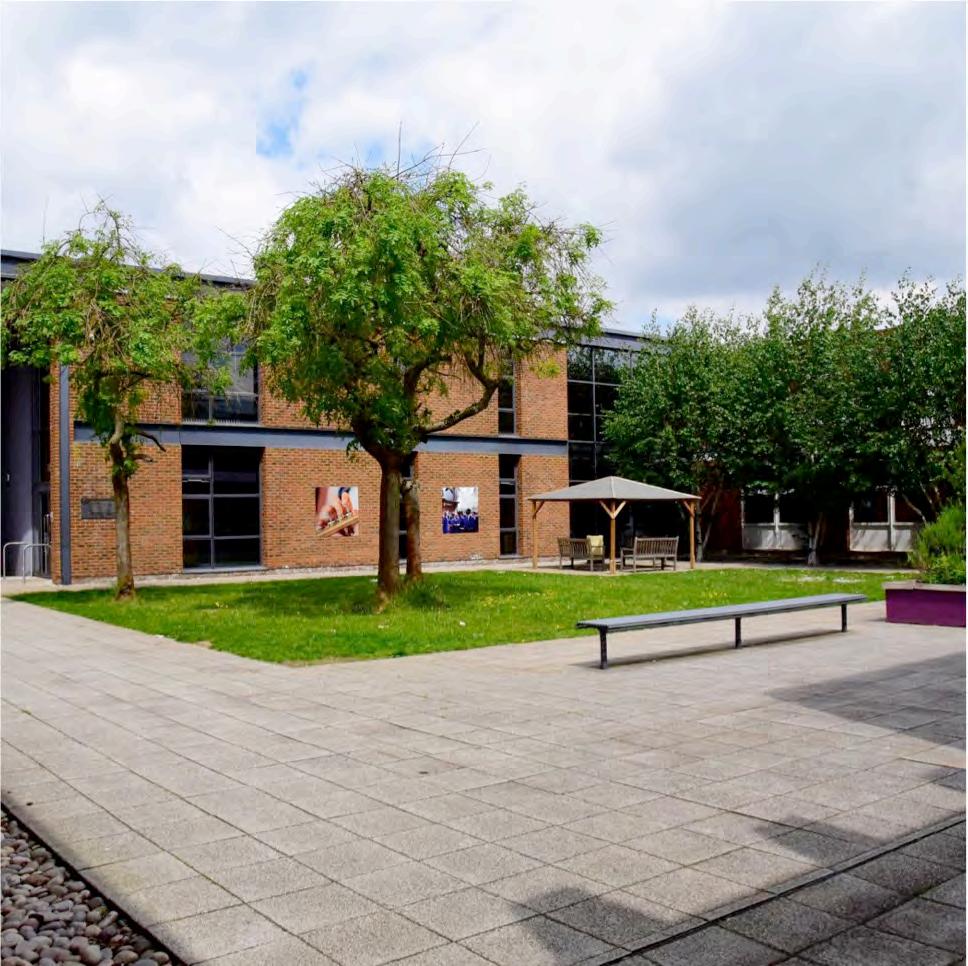


The academic year 2023/24 was, as always, a very busy year in the Sixth Form. The usual calendar of activities meant that the Sixth Form students were working hard on their academic studies, as well as getting involved with a broad range of different activities. We were joined by our new cohort of students in Year 12 who quickly settled into the ways of doing things. They enjoyed a variety of transition activities and team building events and then joined those in Year 13 to get involved in the many and varied opportunities available to them.
We started the year with our usual Year 12 teambuilding day on the top field. Students worked in groups with students they had not yet met in order to complete different tasks and challenges. This day always proves to be highly popular and this year was no exception. New friendships were forged and the new year group moved a step further along the path to finding its new identity.
For Year 13, the start of the year marks university applications, admissions tests and interviews. The Year 13 students, as ever, took all of this in their stride and achieved some particularly impressive offers, including Oxbridge and Medic offers. As part of this process, we held our annual interview preparation day where we were joined by large numbers of volunteers from the school community who gave up their time to help our students with their future academic journeys.
As the first term came to an end, we were looking at our two annual fundraising events. Cabaret was a great success, as always, showing the musical talent that exists at the school. The students organised a fantastic evening and raised significant sums of money in the process. We then had Festival at the end of the term, again organised largely by the student body. Again, large sums were raised. Combined with Cabaret, somewhere in the region of £7000 was raised and this was donated to ‘Long Covid Kids’ and ‘Refuge’, two charities proposed and voted for by the student body. These two events would not happen were it not for the dedication, organisation and hard work of the Senior Prefect Team who must be thanked for their outstanding efforts.
Societies continue to be a strength and unique aspect of the Sixth Form. This year continued to see more societies being extended so that younger students could benefit from them and it was excellent to see the Sixth Form students engage so willingly with those in younger years. The variety of talks and activities that take place really
highlights the interests and abilities of our students. What makes these societies even more special is that they are run solely by students. Many societies also continue to produce high quality journals containing articles at the highest academic level on a very impressive variety of topics. This was also seen with the EPQ which continues to be a part of the Year 12 Elective programme. The final dissertations and presentations were first-rate and on some very interesting topics, with the grades achieved by Year 12 truly reflecting the hard work that had gone into these qualifications.
The Prefects, but particularly the Senior Prefects, are vital to much of what takes place at school. They give of their time to help with tutor groups and academic departments. They cheerfully help with events such as entry tests and open evenings, showing people around and generally helping out. Particular thanks must go to the Senior Prefect Team (Thaddeus Otuoze, Aditi Rai, Thomas Farmer, Isla Clark, Olivia Tang and Wafi Ali) who brought energy and ideas to the role. As every team before them, they very much enjoyed wearing their purple gowns at official school functions and these had one last outing at the school’s annual Commemoration Service at Southwark Cathedral.
It cannot be forgotten that all of this goes on alongside the day-to-day of lessons, homework, studying and revision. Our students are committed to their studies and work hard as a result. Their outcomes reflect this and were particularly strong in 2023/24. It is astounding how much they achieve in their short time with us in the Sixth Form, and this is often whilst they are doing much more beyond the confines of the school day.
At the end of the year we said goodbye to Year 13 in typical fashion and they have gone on to do wonderful things, which is all we can hope for. I wish every student in the Sixth Form here success and happiness and hope that they leave the school with positive memories and a desire to go on and make the world a better place.
Matthew Birtchnell Director of Sixth Form
Over 1,000 prospective students and their parents attended the Sixth Form Open Evening for external applicants. Thank you to all the Sixth Form student volunteers who engaged our visitors with charm and courtesy, sharing information with them and helping them to find their way around the site. We received many positive comments about the quality of the talks taking place in departments, with parents expressing their wish to return to school to begin studying once again. Thank you also to Natalia and Anusha for welcoming all visitors into the Great Hall with a splendid piano performance.

Almost a hundred Year 13 students, aspiring to study a wide range of subjects at the nation’s most sought-after universities and courses, took part in our annual Interview Preparation Day, in which a coalition of 26 interviewers put our students through a rigorous programme of university-style interviews. The interviewers included staff, alumni, parents and the Senior Provost of the Woodard Schools Corporation, Reverend Justin White. All participants benefitted from an introductory session led by Mr Budds and Mr Birtchnell, and from access to the school’s uniquely detailed and broad-ranging interview resource bank. Thank you to all interviewers who gave so generously of their time and expertise in support of our students and their aspirations.
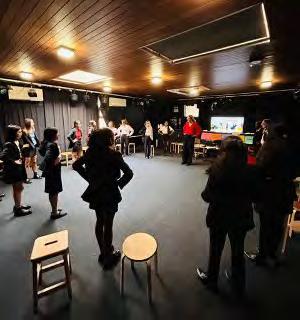
Thank you to Mr Birtchnell, Director of Sixth Form, for accompanying our School Captains to the Dulwich Picture Gallery where they took part in a Leadership Development Programme run by Alex Smith from Alleyn’s School. The group, which included members of the School Leadership Team from other schools, discussed their purpose as leaders and different styles of leadership. We hope this will lead to them maintaining links between the seven schools who are benefactors of The Dulwich Estate.

This year students decided to raise money to support the chosen charities: ‘Long Covid Kids’ and ‘AVA’. Festival was full of entertainment, enjoyment and teachers participating in ‘Would I Lie to You?’. Overall, along with Cabaret, it looks as though we shall have raised around £7000 - a fantastic achievement! Individual form groups all ran stalls including ‘Face Painting’, ‘Sumo Wrestling’ and ‘Penalty Shoot Out’; congratulations to 7H for raising an impressive £263.
New Year 12 students had a day of workshops to celebrate Girls’ Confidence Day led by Head of English and Drama, Ms Wilkie. The morning consisted of girls working in small groups in the drama studio channelling their inner ‘Wonder Woman’.
We are delighted to present the 2024 Academic Journal, a brilliant celebration of St Olave’s collective curiosity. As always, its contents represent the diversity of interests present across the school, from mathematics to artificial intelligence to medicine; modern, historical, and even ancient politics; articles attacking pressing contemporary concerns, and articles tackling narrower thought experiments. Thank you to everybody who has contributed to this journal, as well as every society leader and attendee who all continue to foster an inclusive, inquisitive environment.

This year’s annual Sixth Form Cabaret was a spectacular evening filled with talent, music, and festive spirit. With a dazzling Masquerade theme, the hall was transformed into an enchanting space adorned with glowing lanterns and twinkling fairy lights, setting the perfect atmosphere for a night of unforgettable performances. The audience was treated to a rich variety of musical acts, including soulful Year 12 solos, an electrifying rap, a breathtaking rendition of ‘I Will Always Love You’, and a lively band performance of ‘Last Christmas’ that had everyone in the holiday spirit. The energy in the room was electric, with every act showcasing the incredible talent and passion of our Sixth Form. It was a truly magical evening that brought our school community together in celebration of music, creativity, and camaraderie. Overall, £3540 was raised from this evening.
The evening was filled with phenomenal performances, food and magnificent cultural clothing! Performances ranged from traditional dances and music to more modern rap. A massive thank you to the Cultural Evening Committee for putting together such an amazing event. Funds raised will be donated to the Yog Foundation and the Wellbeing Garden.

Around 400 Year 12 pupils and parents attended the annual Oxbridge Information Evening. The co-presenters were Lucinda Rumsey (Senior Tutor of Mansfield College, Oxford) and Caroline Burt (Admissions Tutor of Pembroke College, Cambridge). The evening offered a wealth of information about what makes studying at these two ancient and prestigious universities different in terms of the small group tutorial/supervision system which is at the heart of teaching and learning at Oxford and Cambridge. The presentation went on to explore the ins and outs of the admissions processes, skewering unhelpful myths and offering supportive insights into what students can be doing to enhance their chances of success in admissions tests, personal statements and interviews. The twin goals of enabling pupils and parents to make an informed decision about whether or not to apply and what they could do to put forward a competitive application were delivered very thoroughly.
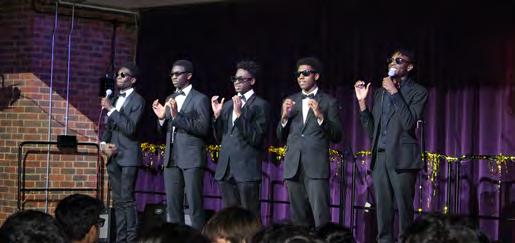
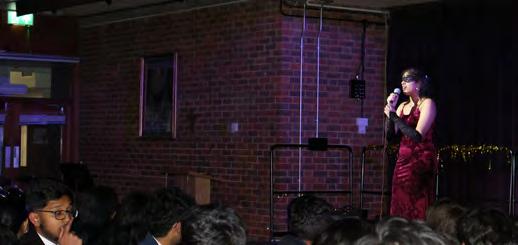
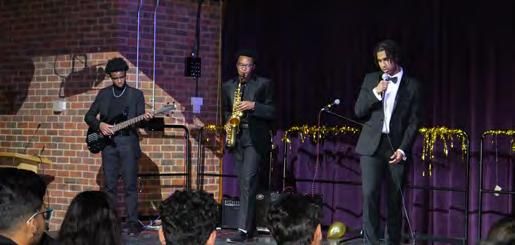
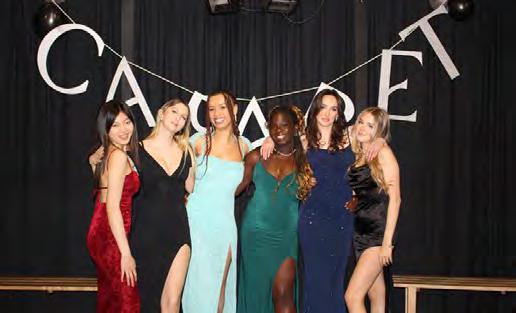
Year 12 students and their parents/carers attended our annual Higher Education Evening which launches the post-18 process for them. Guest speakers included Sara Pittmann from the University of Exeter who spoke about different courses, types of university and student finance. School Captains Aditi and Thaddeus shared their experiences of writing personal statements. We were very lucky to be joined by former students George and Kaylan who are currently in their first year completing a degree apprenticeship with Dyson. They shared their experiences and gave useful information on finding opportunities and applying for them. Students also heard about the process of applying for university. Thank you to all those who attended and to the different speakers who presented.
St Olave’s Careers Team wishes to thank all the individuals who have given up their time this academic year to enlighten our students about the wide range of future careers available to them. From the careers fair to the weekly careers talks and employer visits during activity weeks, we are privileged to have had such influential support from employers especially those from our Old Olavian network.
Mr Clegg and students in Year 12 attended a talk at Bromley High School presented by the Aerospace Careers Programme. Students listened to a talk about the industry and had time to network with representatives from different aerospace companies. Highlights included seeing Spot, the Boston Dynamics robot dog, a working commercial 3D printer, and having the opportunity to fly a plane in VR.
Joseph Barradell delivered a fascinating talk to students in Years 11, 12 and 13 on his experience at the Dyson Institute of Engineering and Technology as an Engineering Degree Apprentice, and Dr Shubham Gupta, gave advice to Olavians interested in studying medicine at university.
Old Olavian and Governor, Peter Bassett, spoke to our pupils about a career in Finance, and how pupils can prepare for this whilst at school. He shared thoughts and reflections on internships and transferable skills.
Dr Stephen Lockwood spoke about living marine resource management and conservation, and Ms Tao Huang introduced the actuarial science profession. The combination of one-to-one talks and speed networking were well received. We had some wonderful support from parents and Old Olavians, who gave up their time to provide professional careers advice to students. Thank you to Career’s Lead, Ms Tessa Molloy, and all the staff and students involved in organising this event.

Year 13 took a well-deserved break from exam preparation to try their hand at traditional Scottish Dancing on 19 and 26 April. A visiting team of experienced dancers put them through their paces, leading them through a series of turns, arches and do-si-dos and it was wonderful to see Year 13 so enthusiastically and energetically engaged. A big thank you to Mrs Johnson for organising the event, and to all the volunteers who led the sessions.
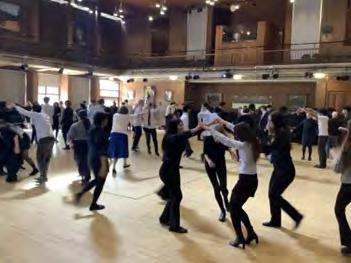
Year 12 spent the day preparing for university applications. This is an exciting point in their education as they begin to make decisions about their futures. We were joined by Sara Pittman who works for the University of Exeter who gave an interesting general overview of going to university and how to apply, highlighting the vast array of options available to students. Students then had sessions on writing a personal statement and on how to complete their applications. In the afternoon, we were joined by former students, Victor, Grace, Varun, Jaydn, Hephzibah, Rohini, Anupam, Pelumi and Luis who held a Q&A session with the year group. Questions ranged from how to best prepare for Oxbridge exams to what societies are there at university. We would like to thank the former students who gave up their time to help - it is always a pleasure to see Old Olavians coming back to help the next cohort.

Congratulations to both sides this year as our annual Young Olavians’ Day competition ended in a draw. The Young Olavians won netball and the volleyball, with the School winning the football and the rugby. Thank you to last year’s Vice-Captain, George O’Connor, for co-ordinating the Young Olavian teams.
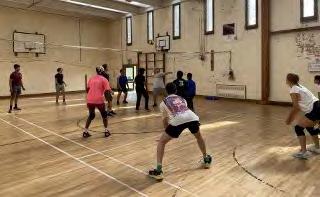
It was great to see Year 12 bonding with their new forms and form tutors during the team building day. Students took part in a series of problem-solving games which required them to use their team working skills to reach solutions efficiently and collaboratively. The whole year group worked together in their houses, and were involved in a range of games which required them at a couple of points to quite literally stretch themselves to the limit and jump over hurdles as they attempted to come out as winners. Our thanks to the external provider, ‘Wise Up Team Building’, who came into school and ran this event for us.

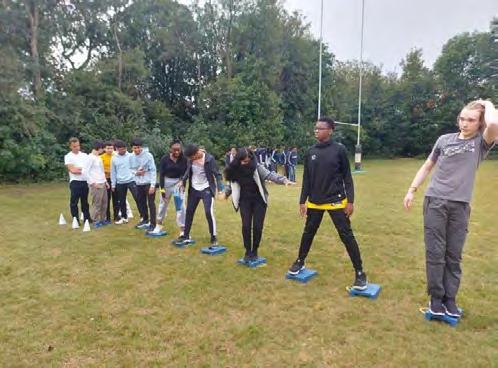

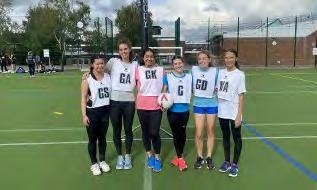

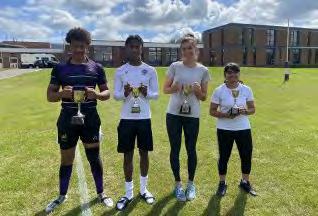
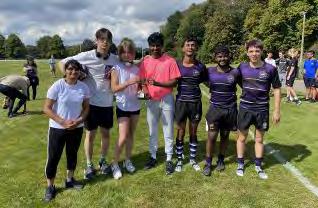
Our thanks to Catherine Costley, Old Olavian and Partner at law firm Payne Hicks Beach, who spoke at the Oxford Women in Law event at Christ Church College, Oxford. Ms Costley invited two Year 13 student - Jeffny and Favour to join her on the evening. The young women enjoyed the inspirational talks that took place and we are grateful to Ms Costley for extending the invitation to current pupils at St Olave’s.

Congratulations to Year 13 student and Vice-Captain, Wafi, who received the Edward Alleyn Award. Wafi was presented with this award, with his parents in attendance, by the Chair of the Dulwich Estate Trustees, Irene Bishop, for demonstrating the Alleynian virtues of creativity, enterprise and philanthropy.

We see this as a great opportunity to actively support and celebrate our diverse community. We commenced the celebrations with the hoisting of the Pride flag. There were educational displays and activities around school, some excellent book suggestions organised by the Library, and Pride themed sweet treats in the canteen.

We were joined by Stuart Gordon, Harvard University’s Head of Outreach in the UK. Initially he did some staff training on the American system and then delivered an informative presentation to interested Year 12s. A number of St Olave’s students apply to American universities each year and in this cycle, two students are holding offers for the next academic year

Our Sixth Form Sports Day was a resounding success, filled with excitement, teamwork and unforgettable moments. Students participated enthusiastically in a variety of events, from the challenging three-legged race to the fast-paced relays and impressive long jump competitions. The spirit of camaraderie and sportsmanship was obvious, as everyone cheered each other on and celebrated their achievements. Thank you to the staff, whose planning and organisation made this event possible.

Leavers’ Reception
This was a splendid ‘end-of-era’ occasion for parents and students to mix with staff in the relaxed environment of the Quad and to enjoy a glass of champagne before moving into The Great Hall for speeches from the Headteacher, the Director of Sixth Form and outgoing Captains of School, Thaddeus and Aditi. The Leavers’ Ball continued at Chelsfield Lake Golf Club with a band, a buffet and the mind-blowing tricks of the illusionist. It was a reflective evening for a fantastic year group who we hope will keep in close contact with the school for many years to come.
Year 13 student, and Vice Captain, Wafi Ali, ran Reigate 10K with a few friends, and raised over £600 for the Aga Khan Foundation, a charity which supports a variety of development initiatives across several sectors including agriculture, civil society, culture, disaster preparedness, education, energy, health, and microfinance.
Year 13 student, Sophia Appleford, not only achieved a Distinction in her Grade 8 Piano examination but also two further Distinctions - one in her Grade 8 Classical Ballet, and another in her Advanced Vocational Ballet Qualification.
Year 12 student Rishihan completed his 10k AJ Bell Great North Run successfully on 7 July in Newcastle. Rishihan ran the race to raise money for PEAS.
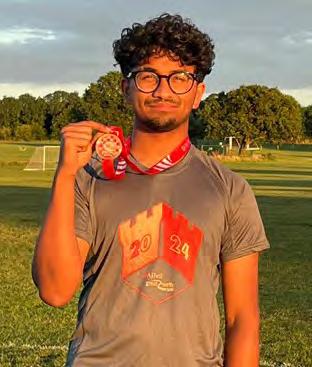
Year 13 student, Max, worked on ITV’s production team for the Tour De France. Max starts his new job with Fusion Media in August.


Ella Balkwill - Captain of School

Moving to St Olave’s this academic year felt like a massive leap of faith, I did not know what to expect or whether I would fit in. However, once I had made my decision to come, I was determined to take every opportunity that came my way and to make the most of my experience here. Right from the first week, I was blown away by the number of opportunities available to students at this school, from peer mentoring roles to the chance to nominate a charity for Festival or form your own society. As a School Captain, I hope to not only maintain these opportunities but also to create new ones, because I believe that everybody should be encouraged to step out of their comfort zone and try something new.
Throughout secondary school, I have thoroughly enjoyed Chemistry and I intend to continue it into university, and possibly pursue a career in the forensic analysis of crime scenes. In my free time, I enjoy running and reading, as well as taking countless pictures of my two cats. I can also be found filming and editing vlogs or listening to Taylor Swift’s entire discography whilst going on a long walk. Being president of Pride Society and co-founding Cross Country Club has reinforced my belief in the importance of inclusion and making everybody feel welcome. In this coming year, I aspire to create more ways for the different year groups to interact with one another and ensure that everyone can find a community, within the school, that they feel they belong to. I am so thankful to have this opportunity, and I am filled with excitement to see what this year brings. Please do not hesitate to get in touch with me on Teams, or just stop me in the corridor for a chat!
Tayo Ogunyemi – Captain of School
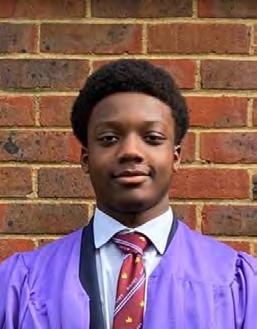
Hello all, my name is Tayo Ogunyemi and I will be School Captain for the 2024-25 period. For Years 11-13, I will also be handling the InterSchool Lecture series, so stay tuned for more on that. Having been here since Year 7, I am eager to impact the whole school with my position and
hopefully benefit everyone. Currently, I am working towards a degree in Economics since it both aligns with my goals and is an engaging subject. Aside from academics, I enjoy contributing to the school in many ways: I am on the school rugby 1st XV, I attend societies, Poli-Econ and Model UN in particular, and am a form prefect for 10L. All these activities make it easy for me to interact with the student body, but of course I cannot get to know everyone. That being said, do not hesitate to shout if you see me in the corridor, I think it is great to be able to have friendships across years, despite our differences in age. That especially is how I aim to make a mark on St Olave’s; though it may seem quite simple to merely encourage more communication, the effect of a more social and interlinked St Olave’s community will be amazing. We will understand each other better and be more respectful to one another as a result. Looking back on when I first saw the SPT in Year 7, I remember a sense of aspiration mixed with a curiosity, I hope that I, alongside the rest of the team, can make a positive impression on you all too.
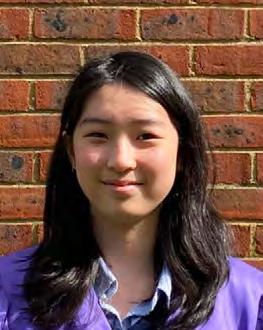
Michelle Sui - Head of Outreach and Ambassador, Form and Duty Day Prefects I can say with absolute certainty that I have never made a better decision than coming to St Olave’s. While arriving to a new school setting could have been challenging, the ease of transition thanks to the sheer number of ways to get involved and know the school better was fantastic. It has been a privilege to be involved in the plethora of clubs and societies that the school has to offer, from being the President of History Society, to attending jazz band, chamber choir, Art Society – the list could go on – all of which have been brilliant opportunities for enrichment, as well as socialising with students from all year groups. Interacting and collaborating with students from across the entire school in this year’s school production was an incredibly rewarding and enjoyable experience. Through rehearsals, I got to know so many pupils from lower years and had many engaging conversations with them in which we all got to laugh, as well as exchange questions and advice. Consequently, I believe that fostering bonds between the entire student body holds immense value in creating an even stronger sense of friendship and community at St Olave’s and means that we can all be role models to each other. As a Vice-Captain in this role, it is therefore my responsibility and aspiration to reinforce such relationships, not only
within our school, but also extend them to local primary schools with Outreach. In my spare time, drawing and painting are passions of mine, and I enjoy playing tennis and practising the organ. It goes without saying that I am really honoured to be part of the Senior Prefect Team and am very excited for the year to come. I want to encourage everyone to say hello if you spot me around school and feel free to come to me with any questions or suggestions that you may have - I am more than happy to chat to all of you!
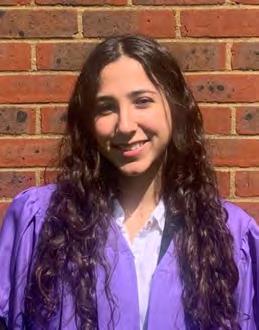
Throughout my life, I have attended several schools as a result of my family moving from country to country and city to city but, undoubtedly, St Olave’s has been the most valuable to me. Coming in September was, naturally, accompanied with feelings of worry and excitement being uncertain of what was to come. However, within a short period, I was at ease with my decision to move here because of the bright and welcoming community I was met with, both within the students and the teachers. Being surrounded by so many motivated students, and with the endless support from the staff, I am continuously being propelled to work hard academically, whilst also bettering myself as a person. The countless opportunities that have been offered to me in such a short time, include being Vice-President of Medics Society and being involved in organising school events, such as the Interfaith Iftar. These have helped me to step out of my comfort zone and interact with other students in new ways. Getting involved within the school and the community is something that I am truly grateful for, and I hope that through my role as Vice-Captain, I can help encourage more students to do the same.
Outside of school, I enjoy reading, ballet, baking, and spending time with family and friends - particularly travelling with them! Seeing the world and discovering new cultures has always been a great interest of mine, and I hope one day to explore more countries and learn about different traditions. In the past, I also engaged in debating competitions and playing tennis. All of these extracurriculars and hobbies have shaped me into the person I am today, and for which I am eternally thankful for.
Through being part of this year’s Senior Prefect Team, I am excited to give back to the school, which has been so welcoming, and support the community to the best of my abilities. And, of course, If you see me in the corridors,
please feel free to say hi, speak to me about any worries you have, or tell me about any ideas that you have that you want to see implemented within school!
Shaun Abraham - Head of Clubs, Societies, and Academic Prefects
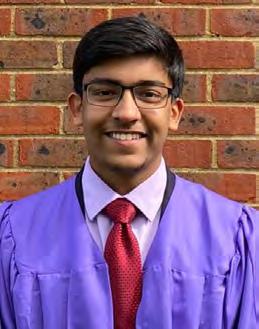
It has always been a source of great pride for me to see the instant recognition on people’s faces when they hear St Olave’s mentioned in conversation. Speaking on behalf of all students, I believe we are extremely lucky to be part of a school with such a deserved reputation for excellenceacademic, sporting, and extracurricular. As ViceCaptain of school, I feel privileged to be able to say that I am part of such a vibrant community, and hope that we in the SPT can maintain this privilege for present and future students, adding our own legacy along the way. Having grown up through the school, I can confidently say that the greatest strength that we have as Olavians is the diversity, inclusivity, and unity of our student body. No matter what your passions or talents, there is a society, event, or team in this school catering to you - and with it new friends, role models, and opportunities to explore.
Some of my biggest hobbies and interests outside of school lie in sports (cricket, tennis, and football among others), reading, and public speaking - all of which I have had ample chance to engage with within school as well. The best way which I have found to do that is through societies; being a member of a number of them myself, from Model UN to History, I can attest firsthand to their value in building skills, knowledge, and most importantly, relationships with other students. My goal as Head of Clubs and Societies will be to make sure that all of you have the same brilliant opportunities that I have had (and more!) to enjoy extracurriculars and fashion your own place in our school community. Within this, I look forward to increasing collaboration across year groups so we can become an even closer and more supportive school community.
I want to get to know as many of you as I can over the coming year, so please do approach me if you see me around - I promise I will be happy to see you! I know that it can be hard to approach older students but, from experience, I can tell you that it is always worthwhile on both sides, so feel free to give me a message or a shout in the corridor and I will be sure to come over and have a chat.
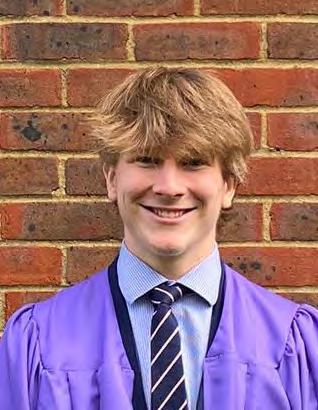
Since joining in Year 7, St Olave’s has significantly contributed to my growth as an individual: both academically inside the classroom, but also as a person. I am delighted that my role as Head of Sports and Houses will allow me to give back to the Olavian community that has opened so many doors for me, and that I am genuinely proud to be a member of. Olave’s has always kept me enthusiastic and intrigued about my subjects, leading to me taking 5 A-levels, including sitting Computer Science a year early which I then hope to study at university.
Overall though, I feel that playing sports here has brought me the most joy over the years. Olave’s introduced me to Rugby when I joined and - despite a potentially fluctuating win-rate in some years - it has given me such immense satisfaction when growing through the school. Entering my new appointment, I understand what a pivotal role sport plays in building the character of a teenager, and am eager to help promote this aspect of school life that has benefitted me so much. I am also excited to help continue rejuvenating the house system, following the work of the previous Senior Prefect Team, to try to make it as engaging, exciting, and inclusive as possible, especially expanding more into the non-sporting sides of inter-house competitions.
Outside of school, I love playing guitar, acting, and walking my two crazy cocker spaniels. Please do come up and talk to me if you see me around school, I would love to speak to all of you! If not, feel free to message me on Teams, anytime for anything. Bleed Purple!
It was a pleasure to attend the Senior Prefect Team training with Mr Birtchnell at St Benedict’s Centre in West Malling earlier. We believe it is essential for this key group to have the time and space to explore their vision and how they want to implement this over the next twelve months. The team looked at different leadership styles, what makes a great leader and what activities need to take place to achieve their vision. The day finished with them presenting their vision, which focused on identity and involvement. Thank you to Mr Birtchnell for organising the day and to the students, including outgoing School Captains, Thaddeus and Aditi, for engaging fully with the ideas they encountered. It is good to know the school is in such capable hands.
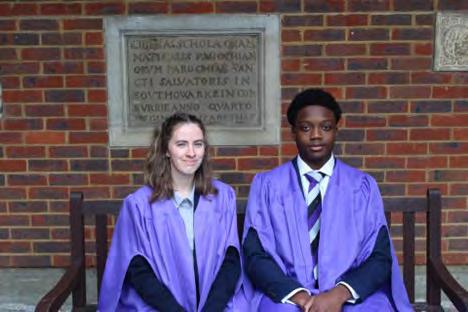

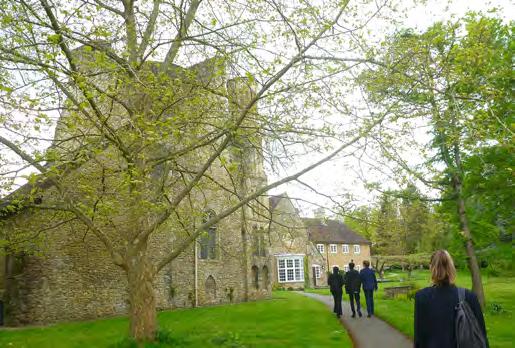

Name Destination Course
Abeelack, Ethan Warwick PPE
Abu, Micah Liverpool Computer Science
Acheampong, Rosie Bristol Dentistry
Acton, Max Cambridge, Trinity Law
Adebayo, Ayokunmi Warwick Mathematics
Adenugba, Nifemi Nottingham Economics
Akodu, Oluwaferanmi Warwick Computer Systems Engineering
Akpomuje, Daniel Gap Year
Albota, Ilinca Edinburgh Mechanical Engineering
Ali, Wafi LSE PPE
Anas, Mohammed Gap Year
Anoop, Aditya King's College London Sport and Exercise Med Sci
Appleford, Sophia Durham Combined Honours in Soc Sci
Arulrupan, Thabisan Birmingham Accounting and Finance
Awosusi, Oluwafolakemi Portsmouth Pharmacy
Azad, Aqmar City Finance
Balaji, Aaravamudhan UCL Global Humanitarian Studies
Balaji, Nilay Bristol Medicine
Balasamudra, Chinmayi Imperial Physics
Banerjee, Bhelina
Cambridge, Murray Edwards Natural Sciences
Bansil, Saahil Gap Year
Barcoe, Liam Loughborough Business Economics and Finance
Bartkus, Paulius Bath Chemical Engineering
Bengtsson, Emy Cambridge, Churchill English
Bhargava, Mehul Gap Year
Blackwood, William Oxford, Exeter Classics and German
Bognolo, Edoardo Queen's University Belfast Medicine
Brockwell, Oscar Imperial Chemistry
Calidas, Pavithra Newcastle Medicine and Surgery
Capamagian, Max Employment
Carrick-Lawson, James Southampton Computer Science
Cattermole, Henry Gap Year
Chakraborty, Tuneer Imperial Physics with Theoretical Physics
Chakravarthi, Aditi UCL Economics and Statistics
Chalamalasetti, Khyati LSE Economics
Chan, Drew Southampton Civil Engineering
Chella, Yande Lancaster Medicine and Surgery
Chhatwal, Karishma Southampton Law
Chinta, Sree Harshitha Bristol
Chowdhury, Ayman Degree Apprenticeship
Clark, Isla St Andrews
Clements, George Durham
Comarita, Maria Oxford, Keble
Economics and Management
International Relations
Economics and Politics
Economics and Management
Cook, Phoebe Bristol Neuroscience
Curran, Joseph Cardiff
Dagar, Avdesh UCL
Human Geography and Planning
Medicine
Dakshy, Benjamin Oxford, New PPE
Dalrymple-Hayfron, Nathan Gap Year
Davies, Emily
Oxford, Wadham
Dopemu, Ronald Warwick
Emele, Mikel
Oxford, Oriel
Engarshal, Mitullesh Liverpool
Esalomi, Elo Penn State
Ezeonyeasi, Ebubechukwu Queen Mary
Biochemistry
Economics
Medicine
Medicine
Computer Systems Engineering
Farmer, Thomas Oxford, St Peter's PPE
Ghosh, Ayush Imperial Medicine
Gjoni, Emma Queen Mary
International Relations
Gnaneswaran, Vithun King's College London Economics
Gnawali, Gagan Imperial Computing
Gopalkrishnan, Ananya Gap Year
Gubars, Frank Harvard
Gunuputi, Yuvan Southampton
Mathematics with Statistics
Gupta, Daksh City Accounting and Finance
He, Jack Imperial
He, Lok Ye Gap Year
Ho, Lydia Imperial
Houji, Saumya Cambridge, Churchill
Huille, Raphael Cambridge, Sidney Sussex
Ibraheem, Lutoni East Anglia UEA
Islam, Maheer King's College London
Iyer, Haran Gap Year
Chemistry
Medicine
Computer Science
Natural Sciences
Accounting and Finance
Medicine
Iyer, Usri Warwick Law with French Law
Jackson, Joannah Gap Year
Javagal, Arjun Warwick PPE
Jayagopal, Mayukh King's College London
Biomedical Engineering
Jesuthas, Jefflin Leicester Accounting and Finance
Jesuthas, Jeffny Nottingham Law
John, David Queen Mary Economics
Joseph, Amitan Cambridge, Christ's Engineering
Joshi, Yash UCL
Joshua Yip, Benjamin Cambridge, Jesus
Robotics and AI
Mathematics
Jothymanohar, Kopisan Nottingham Aerospace Engineering
Kavarthapu, Nithin Birmingham Computer Science
Keemer, Ray
Oxford, St Hugh's Mathematics and Philosophy
Keerthapongalan, Poojitha Gap Year
Kerwash, Rami SOAS LLB Law
Khwaja, Haris Gap Year
Kolte, Sakshi UCL Physics
Kostov, Nikola City Finance
Kotian, Arush Bath Mathematics and Physics
Krishna, Bhavya LSE Mathematics and Economics
Kulkarni, Rujuta UCL Medicine
Kumar, Renee Cambridge, Gonville and Caius Natural Sciences
Kumar, Hrishikesh LSE Politics and Economics
Kunwar, Aradhya King's College London Computer Science
Kuragayala, Devadutt Imperial Medicine
Lakshmanan, Akshay Southampton Economics with Data Science
Lam, Nam Exeter PPE
Lee, Sean Queen Mary Medicine
Leedham, Jake Bath Mechanical with Auto Eng
Lewis, Anton Imperial Computing
Lu, Xulun Imperial Biochemistry
Maganti, Sai Shinjitha UCL Economics
Maher, Kevin Birmingham Medicine
Mahesh, Mahika UCL Medicine
Malhotra, Naman Imperial Mathematics and Comp Sci
Malik, Ankit Queen Mary Accounting and Finance
Mandangu, Danai Leeds Accounting and Finance
Manocha, Kanishq Warwick Mathematics
Maranan, Rhaedian Imperial Civil Engineering
Marshall, Josephine Manchester Mathematics and Physics
Mathur, Akarsh Newcastle Computer Science
McMichael, Connor Degree Apprenticeship
McMillan, Daisy Leeds Medicine
Meda, Rutwik Southampton Economics and Business Mgmt
Meer, Hasan Queen Mary International Relations
Miles, Joshua Degree Apprenticeship
Mohammed, Almain Surrey Biomedical Science
Mossman, Meriel Oxford, Somerville PPE
Moten, Bilal Birmingham Law
Moyo, Mbusiwethu Gap Year
Msn, Aman Brighton and Sussex Med Sch Medicine
Muhammad Hussain, Humayl Southampton Medicine
Mwim, Emenike Nottingham Law
Nandwani, Aaditya Warwick Physics
Ndukwu, Chinedu Warwick Mechanical Engineering
Negru, Ioan Manchester Medicine
Nepal, Pracharika Gap Year
Odeyingbo, Ayomide LSE Finance
O'Donovan, Ciara Warwick Chemistry
Ogbedeh, David Greenwich Computer Science (AI)
Ojeabulu, Samuel Warwick Accounting and Finance
Okonji, Matthew Gap Year
Oladunjoye, Pipeloluwa Brighton and Sussex Med Sch Medicine
Olafimihan, Samuel Gap Year
Onibuje, Pelumi Bath Aerospace Engineering
Orhenomare, Favour Leicester Law
Osborne, Jay Cambridge, Peterhouse Mathematics
Oso, Daniel Warwick Economics
Otuoze, Thaddeus Gap Year
Padhi, Tavishi LSE
Enviro and Sust Dev with Econ
Pandey, Ritcha Warwick Chemistry
Pandey, Sanay Leicester Biological Sciences
Peddamallu, Tanvi St George's Biomedical Science
Perikala, Abhinav Bristol Medicine
Pham, Hung Exeter
Economics and Finance
Pilu, Natalia Cambridge, Robinson Medicine
Poudel, Sulav Warwick Computer Science
Powale, Rudra Southampton MORSE
Presland, Alex Gap Year
Pynadath, Sam Saji Bath Economics and Mathematics
Ragudharan, Rishi Liverpool Medicine
Rahkesh, Sharushan Goldsmiths
Psychology with Fdn Yr Rahman, Ibrahim Gap Year
Rahman, Maha Birmingham Chemical Engineering
Rai, Aditi Cambridge, Emmanuel Medicine
Rao, Aneesh LSE Accounting and Finance
Redding, Nathanial Bath Accounting and Finance
Revindharan, Isha Warwick Economics
Richardson, Daniel Employment
Rocero, Vincent Durham
Accounting and Finance
Rodriguez Cicirello, Luis Liverpool Bioveterinary Science
Rooney, Benjamin Gap Year
Saha, Debangshu Imperial Physics
Samuel, Kaleb Warwick Accounting and Finance
Sanathkumar, Sachin Birmingham Computer Science
Sandhu, Arjan Bristol Aerospace Engineering
Sandhu-Wear, Dylan Gap Year
Sanu, Mark King's College London Physics
Sarin, Anya Durham PPE
Sarvamohan, Nirros City Finance
Saunders, Olivia Durham Classics
Scott, Oliver Exeter Accounting and Finance
Sedghi, Micah UCL Comparative Literature
Selva, Tharun Southampton Computer Science
Selva-Radov, Anusha Gap Year
Selvaraj, Amrita Oxford, St Catherine's PPE
Shamil, Safiyah Gap Year
Sharma, Ria UCL Computer Science
Sharp, Benjamin Liverpool Philosophy and Politics
Sherwood, Edward Degree Apprenticeship
Shetty, Shiv Southampton Mechanical Engineering
Shiva, Surebi Gap Year
Shoroye, Victor Warwick Mechanical Engineering
Showkat, Ayman King's College London Medicine
Singh, Amish Warwick Mathematics
Singh, Aryaman Queen Mary Economics
Singh, Vaishnavi Imperial Medicine
Sivabalan, Joshikka City Finance
Sivakunalan, Shanuggan East Anglia UEA Law
Sivathasan, Kishaanth King's College London Computer Science
Smolen, Laura King's College London Physics
Sureshkumar, Tirzah Westminster, London Finance
Suryanarayanan, Antaraa Southampton Biomedical Sciences
Suthakaran, Athyth Westminster, London Interior Architecture
Taher, Zaheer King's College London Physics
Tang, Olivia Oxford, Brasenose Law
Tavva, Abhinav Imperial Computing
Taye, Aklil Birmingham Mechanical Engineering
Thayaparan, Patheesan City Accounting and Finance
Thomas-Arnold, Jayda Warwick Life Sciences and Glob Sust Dev
Thompson, Mia Queen Mary Law
Tiwari, Ojas Gap Year
Toth, Oliver Gap Year
Tsioupine, Marko UCL Economics
Tu, Amy Bath Architecture
Umunna, Kennedy Cambridge, Trinity Hall Chemical Eng and Biotech
Upadhyay, Vivan Queen Mary Medicine
Vanka, Shashank Warwick Computer Science
Venugobalan, Sobikan UCL Physics
Vijayakumar, Anushan Gap Year
Vijayakumar, Jyothsna Royal Holloway
Computer Science
Vishnu, Kalyani Cambridge, Trinity Medicine
Wade, Suzanna Nottingham Law
Wickramasinghe, Nuvin Imperial
Economics, Finance and Data Sci
Wimalan, Sachin UCL Medicine
Wong, Ally Warwick Law
Wong, Earn Qi Benecia UCL
Xia, Zhi Gap Year
Yeo, Reece Warwick
Applied Medical Sciences
Politics and Intl Stud
Yin, Ray Glasgow Finance
Yusuf, Qoyyum Leicester
Medical Biochemistry




As a school we are proud to continue to offer the Duke of Edinburgh Award Programme. This is a nationally recognised Award which seeks to encourage and recognise students’ wider interests and skills. They promote their award as, “helps to turn the things you love, and the things you’ve always wanted to try, into powerful lifelong skills that can help you get a job, change your community and take on anything life throws your way.”
(Do DofE, 2024)
We have had over 100 Year 10 students participate on the Bronze Award, 40 Year 11 students on the Silver Award and 40 students in Years 12 and 13 on their Gold Award. To complete their award, all must complete four DofE sections (with an additional fifth section at Gold level). The sections are Volunteering, Skills, Physical and Expedition. The additional Gold section is to complete a Residential. The different sections aim to diversify the skills and interests of participants, encouraging them to try out new things and to contribute to their community.
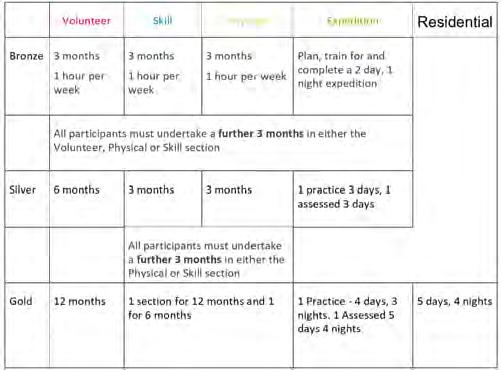
• The Volunteering section often sees students contributing their time to local charity shops, park runs, tutoring family friends, helping in the school library and even helping species counts on websites.
• Many of our students already pursue a Skill such as playing a musical instrument or LAMDA drama and public speaking lessons. However, we have seen a wide range of skills including cooking lessons, using Duolingo to improve language skills, making Lego models and competitive Rubix cube-ing.
• The Physical section is where students should hone a physical activity. Many students participate in sports, but the DofE award encourages them to focus on how they improve in their chosen activity. For example, a student doing football for their Physical section would choose
an area of improvement such as improving accuracy of passes.
• The Expedition section is the area in which the school has the most direct input. We had a great year of expeditions last year, with Bronze groups out around Sevenoaks and Silver groups heading down into the Ashdown Forest. We are very grateful for the help and hard work of Mr Holland, Mr Carroll, Miss Foster, Mrs (and Mr!) Wiltshire, Mr Whiteside, Dr Carpenter and Mrs Attwood to make these expeditions possible.
• The Residential section is only part of the Gold award level. It encourages students to be more resilient and flexible by requiring them to spend a week with people they do not know, working towards a common goal. Some notable residential sections our students have taken part in include surf school in Portugal, ski coaching in Scotland and running an activity week for students with special educational needs.
Students registered on the Duke of Edinburgh Award Scheme should all be aware of what they are doing to complete their sections. However, we are always grateful for support from home. If your son or daughter is involved in the programme you can support them by:
• Asking them about their sections – can they update you on their progress? They might even be able to show you how things are going on their DofE app.
• Giving them ideas or support to complete their sections. They might need some help to find an appropriate assessor for each section.
• Helping them organise their kit for the expedition section. Any kit which is too small for your child might be helpful for their peers and is always appreciated.
As a school we are keen to ensure your child has an enjoyable and successful (albeit challenging!) experience on their Duke of Edinburgh journey. As part of this, we will be using an expedition provider for all our expeditions going forward. They are Wild Country Consultants and should ensure your child gains a real appreciation for the outdoors during their expedition. If you have any queries about this or any other aspect of DofE then please email me on sdifford@saintolaves.net.
Stephanie Difford DofE Co-ordinator
The 2024 Duke of Edinburgh’s Award season commenced in May with seven teams out on what proved to be a very warm weekend. The teams met at the first campsite and spent the evening going through basic training, such as putting up tents and cooking. The first day of the expedition involved route planning and walking for six hours to the next camp. Teams completed their final day at lunchtime after an early start.
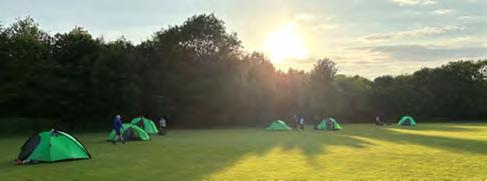
June saw the Bronze groups going out on their expedition section where they learnt the intricacies of setting up and putting away tents, use of the trangias and camp craft. Both evenings were filled with football and cricket matches. A big thank you to the staff team who supervised the expedition and redirected the groups when needed.
The Silver Duke of Edinburgh (DofE) expedition spans three full days and two nights, involving a backpacking journey through the picturesque countryside and quaint towns of Kent, East Sussex and West Sussex. This expedition offers students a valuable opportunity to hone their navigation skills while experiencing the natural beauty and charm of the countryside. This year, the boys covered over 65 kilometers during the three days, camping both in the woods and at a large campsite, enjoying favourable weather throughout. It was a fantastic three-day adventure.
Our Gold DofE students travelled to Snowdonia during Activity Week Two to complete their final expedition.
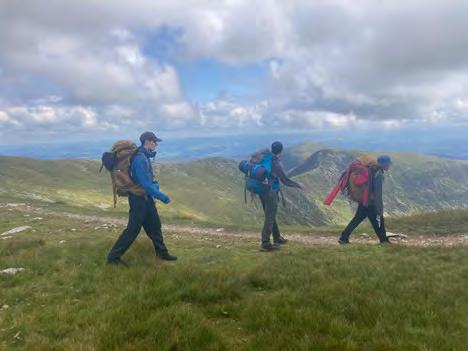


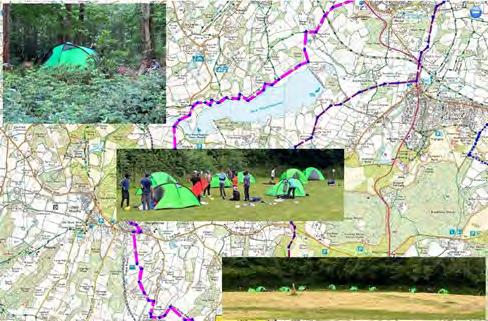
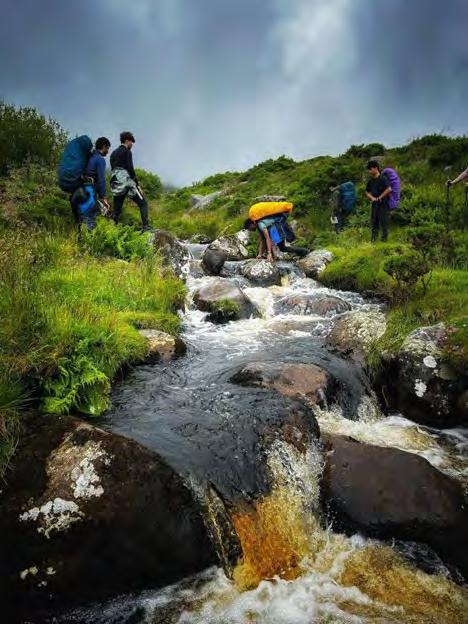
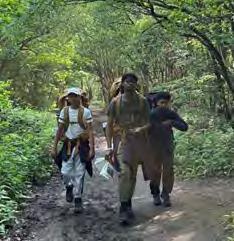
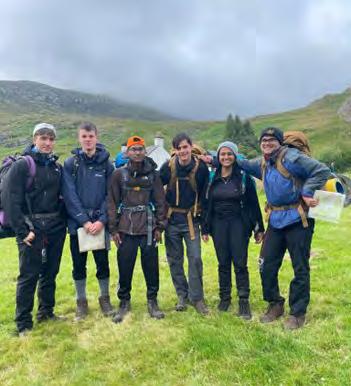
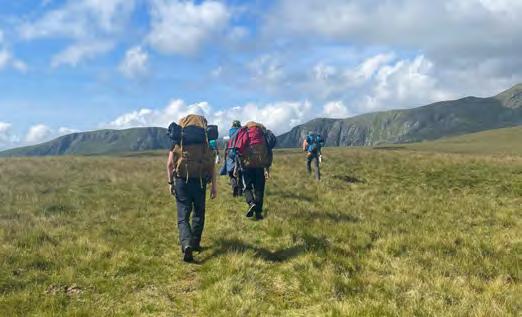









This has been a very busy year. In November, Year 11 attended the annual Maths Inspiration event, a series of talks by professional mathematicians, hearing from experts in fields from crowd flow dynamics to the birthday paradox. Student voice continues to rate this as a popular event in the calendar.
In our third year participating in the Hans Woyda competition, the team managed to reach the quarterfinals again and were narrowly beaten to a place in the semi-finals by King’s College School, the final score being 43-45. Although the students were disappointed, they fought hard and were knocked out by the eventual winners.
Olavians performed very well in the UKMT competitions this year, with many students qualifying for follow-on rounds. This includes 11 who qualified for the British Mathematical Olympiad, 2 of whom attained a Distinction in BMO1. From the IMC competition, 3 qualified for the Cayley Olympiad, 4 for the Hamilton Olympiad, and 8 for the Maclaurin Olympiad. We congratulate, in particular, Alexey Maltsev for the best Year 10 performance, Alexei Kubzin for the best Year 9 performance, and Henry Etherington for the best performance from all the school’s entrants into the Intermediate Maths Olympiad competitions.
During Activity Week 1, Year 9 enjoyed participating in the inter-house Maths competition. Teams of four competed against one another on UKMT Team Challenge questions.
We renewed last year’s initiative to integrate Olavian pupils with their confreres at Newstead Wood Girl’s School, this year hosting a group of Year 10 visitors from Newstead at St Olave’s, when our Year 10s participated in a mixed-teams friendly variant of the Maths Feast competition during the summer term.
We continued to enjoy strong results in additional maths qualifications from various Year 11 students who sat either the AQA Further Mathematics GCSE or the OCR FSMQ Level 3 Certificate in addition to their Mathematics GCSE. Our boy’s results were especially impressive in the FSMQ, with 93.3% of the entrants attaining grade A and 100% achieving either grade A or B. Furthermore, all teachers in the Department were delighted for the 100% of our Year 11 who attained a GCSE Maths grade between 7 and 9 and 98% achieving a grade between 8 and 9.
Both A Level Maths and Further Maths results this summer were very pleasing, with the cumulative pass rates at grades A* - B slightly exceeding 2023’s highly commendable figures for both Further Maths and Maths. This is a testament to marvellous impact conscientious work of our cherished Key Stage 5 Maths Coordinator Mrs Munday, who retired at the end of the 2023-24 academic year. The Department and the School owe her a great debt of thanks.
Thomas Smialowski
Head of Mathematics
Mathematics Society
Year 12 student, Aashman Kumar, gave a talk on Topological Data Analysis. While topology is an area of mathematics only covered at university level, and is notable for its purported lack of applications, Aashman was able to clearly explain its uses in data analysis, for example in dimensionality reduction in order to simplify data. The talk was challenging but also insightful and students left eager to learn more about this mysterious field of mathematics.

Hans Woyda Mathematical Tournament
Four students made the long trek to face Hampton School in the Hans Woyda Maths Competition. After a fairly even start, St Olaves managed to pull away in the final rounds to finish with a 44-32 victory and process to the quarter finals. Well done to Ben Joshua Yip, Arnav Sharma, Shaurya Mehta and Alexei Kubzin.
Mathematics Olympiad
Well done to Year 13 student, Anusha Selva-Radov, for her brilliant performance in the Mathematical Olympiad for Girls 2023.
We welcomed teams from 14 schools from around the local area to take part in the Team Mathematics Competition. After the first two rounds there were six teams all within two points of each other. However, the boys from St Olave’s showed their mettle and managed to pull away from the competition demonstrating excellent teamwork and cooperation under pressure. Well done to Alexei Kubzin, Harvey Langworthy, Sourish Proddaturi and Luke Jones who won and to Yifan Luo, Lakshajan Dayaparan, Joachim Wong and Ahash Thavaseelan who came in very close behind in 2nd place.
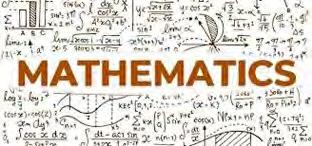
In June we took 32 of our Year 10 students to Newstead Wood for our second collaborative Team Mathematics Competition. Working in teams of four comprised of two Olavians and two Newsteadians, they worked together to tackle some fiendishly difficult maths problems. Thank you to all the students who took part, they were an asset to the school. Particularly well done to Vibhanshu Singh and Liam Butterworth who came out victorious after a tight run competition.
Congratulations to Year 9 pupils, Harvey Langworthy, Lakshajan Dayaparan and Alexei Kubzin, and Year 8 pupil Sourish Proddaturi on their fantastic performances in the Junior Mathematics Challenge. Their performances won them a medal and book prize.
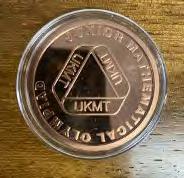
It was a pleasure to welcome over 180 Year 5s from six local Primary schools for our annual Maths and Science Outreach Day. This popular annual event involved turning our Science labs into research labs, learning about chromatography and various other analytical techniques - and having a lot of fun too. As well as solving a number of different maths puzzles, pupils learned how to prepare and launch rockets - the winning ballistic team managing to propel theirs over 50 metres!
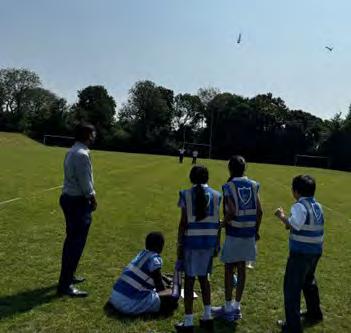
On 20 November Mr Smialowski, Mr Savage, Mr Roye, Mrs Ward and Mrs Ruben accompanied our Year 11 to the Maths Inspiration talks at the Cambridge Theatre, London. They were treated to three talks across a range of mathematical areas. Rob Eastaway showed the benefits of lateral thinking in puzzling and how humans still have a clear advantage over AI bots. Aofie Hunt demonstrated that careers exist as freelance mathematics consultants, as she described her work on crowd flow management for concert organisers and sport stadium management. Ben Sparks gave a stimulating insight into the applications of binomial probability distributions to gambling, alongside shedding light on the Birthday Paradox, before treating students to a rendition of Sting’s ‘Shape of My Heart’.

The Computer Science department at St Olave’s Grammar School stands out for its exceptional track record in both GCSE and A sLevel results, alongside a wide array of co-curricular opportunities that nurture and challenge the intellectual curiosity of students. Over recent years, the department has seen a perfect pass rate at both GCSE and A Level. At GCSE students have achieved 100% Grades 9-7 and were ranked 2nd amongst 27 BASS schools. Similarly, at A Level, the department has sustained an incredible 100% pass rate with grades A*-C.
The success of the Computer Science department is not just based on academic results, but also on a culture of excellence and support. Students are encouraged to think independently, collaborate with peers, and tackle challenges beyond their comfort zone. The department fosters a passion for problem-solving, ensuring that students leave with a solid foundation in computational thinking and programming, ready to face the rapidly evolving digital world.
Additionally, teachers provide numerous opportunities for students to deepen their knowledge through clubs, coding workshops, and one-on-one mentoring. Whether a student is preparing for an exam or an international competition, they receive the guidance and support they need to succeed.
As technology continues to shape the future, the Computer Science department is well-positioned to remain at the forefront of innovation in education. With its combination of stellar academic results and rich co-curricular offerings, the department not only prepares students for their exams but also equips them with the skills, mindset, and confidence to succeed at university, in the workforce, and beyond. The department’s success will continue to inspire the next generation of programmers, developers, and innovators, ensuring that St Olave’s remains a centre of excellence for computer science education for years to come.
Rabia Zeshan Head of Computing
Congratulations to members of our Computer Science Society for putting together the fourth issue of their journal, ‘hypertext’
The British Informatics Olympiad (BIO) is of the most prestigious competitions available to St Olave’s students. This contest challenges them to solve highly complex programming problems, often requiring advanced knowledge of algorithms, mathematics, and data structures. Students who perform exceptionally well may have the opportunity to represent the UK at the International Olympiad in Informatics (IOI), one of the highest levels of competition for young computer scientists globally. St Olave’s has a strong record of participation in the BIO and students benefit from an environment that encourages both academic rigour and creative exploration.
On 29 November 2023, KS5 Computer Science students attended the Computer Science in Action Day trip at Emmanuel Centre London. Renowned speakers (namely Lyndsey Scott- Software Engineer, Matthew Leeke - University of Birmingham, Nic HarriganPhysicist at Psi Quantum and Katrine Dargel) revealed computer science at its very best and took our students to the cutting edge in fields such as App Development, AI Ethics, Smart cities, Quantum computing race, UX Design and computer systems. It was an enlightening trip for our students to see how the future is revolutionised by the advancement in Computer Science and technology.
A collaboration between Law Society and Computer Science Society saw a talk exploring the law’s stance on artificial intelligence, especially around copyright and intellectual property. The presentation detailed the mildly absurd case of Naruto v. Slater, disputing the ownership of the ‘monkey selfies’ taken by Naruto, an Indonesian macaque – a case setting international precedent that the creations of non-humans, including artificial intelligence, are non-copyrightable. Discussion between the students provided an enriching exchange of ideas, followed by a spirited Kahoot about copyright law.
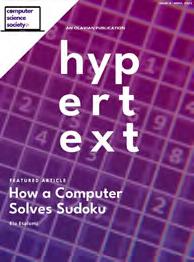

On 24 May 2024 during Activity Week 1, Year 7 students attended workshops on Minecraft, Lego, AI and Cyber Security. They enjoyed learning about coding and problem solving in a fun and engaging way using tablets and Lego robots. Students also completed Cyber security challenge and understood the role AI will play in the future of their education.

We had another year of outstanding results in the UK Bebras Computational Thinking Challenge. These include 156 Distinctions and 147 Merits which is phenomenal. Our students’ results placed us among the best in the country, and our top scorers were invited to the second stage, held in the Department of Computer Science at the University of Oxford. Special congratulations go to Aksel Lutzow, Giles Maxwell, Ayush Penumarthy, Shaurya Mehta and Sam Campbell who achieved Best in School certificates for their respective age groups.

St Olave’s also fields teams in the Perse Coding Team Challenge, a competition designed to foster teamwork and high-level programming skills. The event brings together students who collaborate to solve complex coding problems, encouraging them to think both strategically and creatively. Teams from St Olave’s have consistently performed well, further enhancing the school’s reputation as a hub for young coding talent.
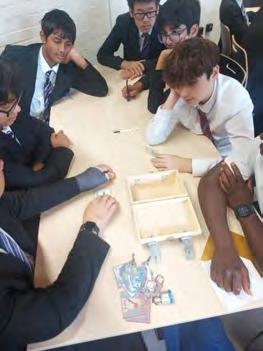
On 16 July 2024, Year 9 students visited Bletchley Park where they enjoyed a carousel of activities including a cryptography workshop and a D-Day themed tour of the grounds with a museum guide. Students participated in code breaking activities using ideas related to binary addition, the XOR operation and common language patterns. They watched clips on principles of data protection and ethics of existing controversial cyber products. They also learnt practical ways to identify weaknesses in their personal cyber security and ways to improve their cyber security.

Bletchley Park cryptography room
Computing Department ran the Cyber Centurion competition on 7 December and enjoyed a tense competition with more than 200 other teams around the world. Cyber Centurion is a cyber security competition designed by the American Air Force Association and powered by Northrop Grumman, open to 12 - 18 year olds in the UK and British Overseas Territories. Participating teams attempt to discover all the security vulnerabilities within various operating systems. Students who take part benefit from a unique chance to develop their technical expertise as well as soft skills such as communication, teamwork and leadership – essential to succeeding in any role in cyber security today.
The 2023-24 season has been successful for the St Olave’s Chess teams. We fielded 2 teams this year in the National Schools Championship. Both teams qualified for the regional stage in Spring 2024. Our B team enjoyed initial success but were knocked out in round 2. Our A team faced stiff opposition against Sevenoaks School in round 2, but unfortunately lost the match meaning we did not make it to the finals. A special thank you goes to Aaravamudhan Balaji and Saahil Bansal, who have been on the Chess A team for the last 7 years at the top boards. Their dedication (and chess skills!) will be greatly missed on the team.
In 2025 we will be fielding just one team, and we look forward to welcoming new players on the team.
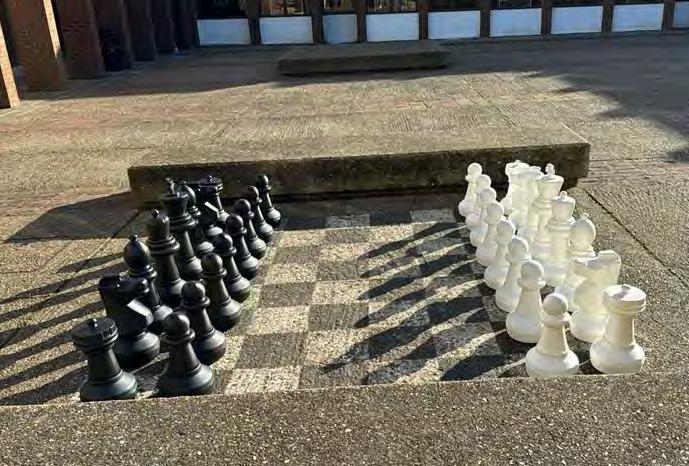


IM Norm Chess Tournament
Congratulations to Year 13 student, Aaravamudhan Balaji, who won the IM Norm Chess Tournament trophy and also secured his first International Masters Norm at one of the London tournaments consisting of Grandmasters and International Masters. He did this without losing a single game.
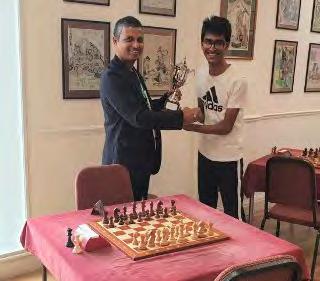



The Biology Department has enjoyed another successful and enriching year, and the commitment and enthusiasm of both students and teachers has enabled us to maintain a steady focus on the vivid and dynamic nature of the subject. We constantly strive to develop the curiosity of our students and promote higher order thinking skills, using material from the many organisations supporting the biological sciences such as the Wellcome Trust, Science and Plants in Schools, and the Nuffield Foundation.
Nowhere has this been more apparent than in the rapid development of the Sixth Form Biology Society where weekly presentations engage a large audience and visiting speakers such as Robert Bradburne, chief scientist of the Environment Agency, have spoken about their career journey, also communicating a real sense of their personal interests and passion for the subject. Medics Society has continued to thrive with the direction and support of Dr Bradley, and we celebrated many successful applications for courses in Medicine and Dentistry.
Early in the year we were excited to learn that an Olavian team, led by Haris Khwaja, were overall winners of the Cardiovascular category in the Imperial College School of Medicine Schools Competition. This success generated such interest that, when the 2024 competition was announced, 16 teams of between 4 and 6 members responded, and an internal competition was set up to select five teams to go forward to the national competition. My thanks to Mrs Morrell for her leadership and organisation of this competition.
We have also seen great appetite for the challenges posed by other national competitions: many teams of Year 12 students have responded to the Homerton College Biology Challenge, creating articulate and creative presentations in answer to challenging questions such as “Why don’t animals have wheels?”, and many of these teams are currently high on the leader board, competing with many schools around the country. In January, Avdesh Dagar and Bhelina Banerjee achieved Gold medals in the British Biology Olympiad with Avdesh progressing to the team selection stages for the International Olympiad. Later in the year, Year 12 students sat the papers for the Intermediate Biology Olympiad with 6 students gaining Gold medals, 7 Silver medals and 7 Bronze medals. Finally, Year 10 entered the national Biology Challenge where nearly 50% of the Year group achieved Gold and Silver certificates.
In July, Year 12 embarked on the annual Biology field trip at Flatford Mill in Suffolk, a wonderful opportunity to encounter biodiversity and to study fieldwork techniques in a most beautiful setting. With 84 students on site, there were certainly logistical challenges, but as always, our students rose to the occasion and gained a great deal from the experience.
A significant development in the Biology Department this year has been the broadening of our one-toone mentoring scheme. Many Year 12 students have volunteered to work on a regular basis with students in Year 11, and it has been gratifying to see the improvement in both understanding and confidence that can result from such support. These sessions run in addition to more formal support sessions and many Year 10 students are now signing up as they make the transition into Year 11.
No report would be complete without reference to the excellent results obtained by our GCSE and A level students in the 2024 exam sessions. My thanks go to all my colleagues in the Biology Department who have worked with such dedication throughout the year, bringing their enthusiasm for the subject to every lesson and continuing to inspire our students to develop their skills and understanding. I would also like to thank Miss Difford, Mr Clegg and Miss Bishop, all of whom have been outstanding colleagues in the leadership of the Science Faculty this year.
I am confident in handing over the leadership of the department to Mrs Joanne Anderson and know that staff and students will continue to thrive and progress under her guidance.
Caroline Marwood Head of Biology
This year has been a dynamic and engaging period for the Chemistry Department. We have been fortunate to welcome numerous esteemed chemists who have invigorated our students’ passion for the subject. Students have explored a variety of chemistry-related literature, broadening their understanding of where Chemistry could take them, including novel career paths available in the Green Science sector. Curious and hardworking, it has been great to see many of our students thrive by challenging themselves with wider reading and participation in competitions.
One of the highlights of the year was another visit from author and chemical engineer, Fiona Erskine. Her novel ‘Phosphate Rocks’, described by Dr Carpenter (St Olave’s teacher and avid fan) as part mystery, part history and part scientific information, provides a flavour of life in chemical engineering and is recommended reading for our Year 12 students. Fiona’s stories of working in different environments all around the globe captivated Year 10 students and it was especially interesting how her love of languages has helped her make strong working relationships in many of her roles. We extend our heartfelt thanks for her inspiring visit!
Our Year 9 students also benefited from a series of guest speakers. During their Science Days in Activity Week 2, they had the privilege of learning from Dr Barry Mitcheson and Professor Peter Hore. Dr Mitcheson is an environmental Chemist who has the unenviable task of ascertaining and solving pollution problems. Students greatly enjoyed hearing about his career, commenting that it was like a mystery of the environment. Professor Hore leads a biophysical chemistry research group at the University of Oxford. He helped students realise the connections between all the sciences they study as he outlined his research into bird migration. The students left these sessions with a newfound appreciation for the potential of chemistry in solving real-world problems.
Teams of our Year 9, 10 and 11 students also participated in the prestigious Top of the Bench Chemistry Competition, organized by the Royal Society of Chemistry. One team reached the National finals in Edinburgh, where they greatly enjoyed participating in an action-packed final requiring them to take a test and complete practical work as a team, and attended a lecture on making water potable. We also had a team competing in the Regional final who displayed excellent communication skills. It was a great opportunity for our students to get an insight into what life at University might be like, by completing practical work in a University laboratory and attending a lecture in a Lecture Hall.
Our KS3 Chemistry Club has flourished this year, with Year 7 and 8 students enthusiastically engaging in handson experiments and demonstrations led by our dedicated
Sixth Form students – the rapport and mentorship between them being rewarding to see. Activities included the “elephant’s toothpaste” experiment, making hydrogen balloons, and creating silly putty. The collaborative spirit of the Olavian community exhibited in these sessions has been uplifting.
Meanwhile, our Sixth Form students have been busy with Chemistry Society (ChemSoc), organizing a wide array of activities and engaging in hands-on practical work. The talks this year have included UltravioletVisible Spectroscopy, Melanin for Mercury, Venom and Antivenom and Chemistry Behind Teeth Whitening. Our students have demonstrated exceptional commitment in preparing informative and engaging presentations, showcasing their research and enthusiasm for their subjects. They have also started to share articles with each other – supporting continual academic growth and discussion.
Our students have excelled in competitive events such as the Chemistry Olympiad and the Cambridge Chemistry Challenge. We are proud to report that 72 students participated in the RSC Chemistry Olympiad, achieving 8 Gold, 17 Silver, and 28 Bronze awards. Even more students participated in the Cambridge Chemistry Challenge, achieving 1 Roentgenium (and invitation to a summer school at Cambridge University), 7 Gold, 14 Silver and 23 Copper awards. Our Year 10 students also participated in the National Scientific Thinking Challenge for the first time, applying their scientific and mathematic skills to a variety of novel scenarios – often based on high level research. Another new competition for us was the STEM challenge day which 12 of our Year 8 and 9 scientists entered. This was another very successful competition in which all the students demonstrated excellent problem solving. One of our teams has been invited to compete in the National Final in January.
Overall, our students have shown remarkable growth and engagement this year, taking full advantage of the myriad of opportunities available to them. The dedication and enthusiasm exhibited by the ChemSoc and KS3 Chemistry Club leaders has been commendable. We eagerly anticipate the innovative ideas and discussions that will arise in the coming academic year! A special thank you to the Chemistry Department staff for their unwavering support and commitment to our students’ success in and out of the classroom.
Stephanie Difford Head of Chemistry
2023-24 has been a bumper year for the Physics Department. We have secured record results at both GCSE and A Level. We are immensely proud of our outgoing Year 11 students, achieving 83% grade 9s, a new record for us! A Level was a similar success with 44% A* grades, our best ever excluding the post-COVID transitional grading year.
Exams do not reflect the full extent of the fabulous work that goes on in Physics. Our Sixth Form students run both Physics & Engineering Society and Space & Astronomy Society. These societies prove immensely popular and topics of talks given have ranged from Quantum Mechanics, to re-entry of Spacecraft, and everything in between. Our younger students have been equally keen, and run Junior Physics societies, taking on their own topics, including a talk entitled ‘How to Build an Orbital Cannon’.
We have enjoyed Olympiad success as well. This year we secured 1 Gold and 4 Top Golds, a new record. Students Ojas, Frank, Debangshu, and Amitan took part in Round 2 of the BPhO. Frank and Ojas both made it to the training camp and Frank was selected as the reserve for the British Olympiad team. The department is immensely proud of their accomplishments!
Neil Clegg Head of Physics
KS3 Chemistry Club had a successful start this year with very high numbers attending and enjoying learning about challenging topics through fun activities. KS3 students have been building lava lamps and lemon volcanoes learning about neutralisation reactions. They have learnt about how metal ions produce different flame colours when they are heated strongly and how to write secret messages using lemon juice and use a combustion reaction to reveal them.

‘Top
Our team of students from Year 9, 10, and 11 showcased their chemistry prowess at the regional finals. They tackled a variety of chemistry practicals including chromatography, chemical analysis, and the ‘iodine clock’ reaction, demonstrating exceptional attention to detail and teamwork. Their efforts earned them 1st place in the competition. Congratulations to Ahmed, Tharmesh, Xi, and Venoj.
Chemistry Society listened to a talk from Year 12 student, Vedant, who led an insightful discussion about why reactions occur spontaneously, with respect to entropy of substances in different physical states, and at different temperatures. It was amazing to see a large turnout for this talk, and we hope to continue hearing from students about topics that fascinate them in Chemistry in the future.


In Year 11, we had 23 entrants, five of whom achieved a Gold award. This puts them in the top 8% of physicists who took the paper. Six students achieved Silver, which puts them amongst the top 15% of physicists. Well done to all our Intermediate entrants.
The Senior challenge was undertaken by 50 Year 12s which in itself is impressive given that the extremely challenging paper is taken voluntarily during a lunchtime! This competition is designed to test the top physicists and we were very impressed that four of our students achieved Gold awards. This puts them in the top 7% of physicists who took the test. A huge number of students managed to achieve a Silver award, with 22 students achieving this and putting them in the top 20%.
Well done to all the students and thank you to Dr Corlett for organising this event.

Alice Dong, Diya Patel and Chloe Tsui in Year 12 entered the prestigious British Physics Olympiad Experimental Competition. Their brief was to investigate the motion of a slinky spring under gravity accurately by developing their own measurement techniques. They wrote a fantastically detailed explanation and analysis and were awarded Gold for their efforts. An excellent achievement, especially considering they only began the work two weeks before the hand in deadline! Very well done to all of them.
Congratulations to Ojas Tiwari who, following his success in Round 2 of the Physics Olympiad, was invited to take part in the Astro Camp, held at Oxford University over the Easter holiday. This involved a residential stay at Jesus College with intensive teaching in order to select and prepare a team for the International Astrophysics and Astronomy Olympiad competition. Ojas narrowly missed out on a place in the international team. Ojas was also invited to the British Physics Olympiad Annual Awards Day, held at the Royal Society in London, where he was formally congratulated on his fantastic achievements.

Physics and Engineering Society has had another excellent year. We have had talks from students on topics as diverse as ‘Can We Jump to Lightspeed?’ and ‘The Mechanics of Tyre Wear in Motorsport’. Each of the presentations has demonstrated our students’ exceptional research and presentation skills as well as their ability to pose (and luckily, answer!) extremely demanding questions!
We heard fascinating talks by Old Olavians, including Karo Agbro who taught us ‘How to Make your own Phone’, Rowan Wright who spoke on ‘Hidden Mathematical Structures in Quantum Computing’ and Samuel Rayner who talked about ‘Life Studying Physical Natural Sciences at Cambridge’. We also welcomed Andrew Hanson from the National Physical Laboratory to St Olave’s to give a presentation on the ‘Electromagnetic Spectrum’. This talk was attended by students from various other local schools and was much appreciated by all.
We rounded the year off with a competition to design the most stable tower using spaghetti and marshmallows. This was just as much fun as it sounds but we would not recommend these as solid building materials, as you can see from the pictures!


British Astronomy and Astrophysics Olympiad Year 11 student Devaansh Lulla took part in the Astrophysics Olympiad – a competition aimed at Year 13 students. He undertook the gruelling two-hour paper through his lunchtime in between lessons and managed to achieve a Silver Award. This is a fantastic achievement, especially given that he was sitting the exam two years early and this puts him into the top third of all students participating. Well done Devaansh.
Students in Years 11, 12 and 13 were invited to a talk about the Electromagnetic Spectrum in Metrology. It was a fascinating insight into not only the EM spectrum itself but also the way that we use these waves to understand the world around us. Students were treated to numerous interesting demonstrations including an exploding egg and the Chapel being filled with rainbows as they donned their diffraction glasses. Students from various schools attended and we had a packed audience, all eager to get involved. A fantastic time was had by all and we would like to thank Dr Andrew Hanson for coming along to speak to us, and Dr Corlett for organising the visit.

We are delighted to announce that the St Olave’s team of Pelumi, Maheer, Frank, Zaheer, Ally and leader Haris, who took part in the Lung Category of the Imperial Science in Medicine Schools Team Prize, were placed in 1st place winning the School £3000 to spend on science related activities. This is an enormous and very welldeserved achievement. They designed a product called ‘AirAware’ to help in the early detection of Lung Cancer. They worked as a team to produce an e-poster which was submitted to Imperial College. Congratulations must however go to both Year 13 teams Lung and Cardiovascular (Athyth, Joannah, Kanishq, Naman and led by Ayman and Sean) who were shortlisted for the finals. Both teams gave impressive presentations in their respective final which were heard by a large panel of academic and lay judges. Each team presented for seven minutes and then answered challenging questions about
their product. Over 50 schools entered each category of the competition and ten schools were shortlisted for each category final. Well done to all our students who participated in this exciting, multidisciplinary competition and thank you to Imperial College for organising the event.

A group of dedicated Year 12 students and science teachers volunteered their time to lead engaging workshops for Years 3, 4, and 5 at St Paul’s Primary School to celebrate British Science Week. The focus of these workshops was to ignite a passion for science in younger students. Through interactive activities exploring light and shadows, food testing, learning how to use a microscope and captivating chemical reactions, our teachers and Year 12 students effectively demonstrated the wonder and accessibility of scientific concepts. The feedback from both the primary school and our own students has been overwhelmingly positive. This initiative exemplifies the value of fostering a collaborative learning environment within our school community. It is a testament to the leadership and enthusiasm of our Year 12, who have inspired a love of science in the next generation.

Lectures
We welcomed Old Olavian, James Kempton, who has had a fascinating career as a biologist at the University of Oxford, where he led the scientific research expedition (Expedition Cyclops) to the Cyclops Mountains of Indonesian New Guinea and has also specialised in the epidemiology of malaria. Students attending the talk were enthralled listening to details of James’ gruelling fieldwork and he and his team’s rediscovery of Sir David Attenborough’s long-beaked echidna, a species of egg-laying mammal not seen by science for 62 years.
Professor Carolyn Moores from Birkbeck University came to speak to our students about her research into microtubules and the electron microscopes that she uses to image them. We were pleased to welcome students from various different schools and everybody agreed it was an extremely interesting presentation. Professor Moores was impressed by the standard of questions at the end and a few students spoke about how they were inspired to go away and conduct further research.
Year 13, student, Amy Tu, was awarded a Gold certificate for her participation in the STEM SMART team programme at Cambridge.



We had another busy year in the English Faculty. Year 7 made an excellent start to their time at St Olave’s, working hard and with enthusiasm. We enjoyed a trip to The Globe to see ‘Romeo and Juliet’ which allowed students to experience the play they were studying in that setting. Year 7 and 8 also had the opportunity to see ‘Life of Pi’ at The Churchill Theatre, and during Activity Week Year 8 enjoyed ‘Guys and Dolls’ at The Bridge theatre, and loved it despite having to stand. It was a real pleasure to see former student Eamonn Cox in one of the key roles. On the same day students had a tour and a series of mini art history lectures at The Tate Modern. In March Year 8 took part in a cross curricular day with Chemistry, working with writer and chemical engineer Fiona Erskine to write their own escape stories. In Drama Year 7 learned a variety of performance skills and Year 8 worked on scripted plays culminating in our Year 8 Drama festival performances. We ended the year with our Lower School Summer show which featured a fantastic musical number from each Year 7 form, and a selection of duologues. Students in Year 8 performed some scripted pieces and we also enjoyed a fantastic devised piece about ‘Captain Custard Cream and the biscuit wars’.
Year 9 students had the opportunity to see a production of ‘The Merchant of Venice’ to complement their studies and in the Summer term had a day at The Globe doing drama workshops to prepare them for studying ‘Macbeth’ in Year 10. Year 9 also enjoyed a cross-curricular day with Art, learning illustration techniques from the GCSE Art students to explore the poem ‘Jabberwocky’. We also worked on their debating skills with a day led by senior debating students, teaching the skills and rules of formal debating. Year 10 participated in the Speak Up, Speak Out public speaking training day. Year 10 also enjoyed a talk from local writer Tia Fisher on her verse novel ‘Crossing the Line’ about a teenage boy caught up in county lines, and some students took part in her creative writing workshop. To support their studies Year 10 and 11 were invited to a screening of ‘Macbeth’ and an ‘Aim Higher’ webinar exploring different ideas in the play. Year 11 took part in an ‘Improving Writing’ day in November and had a series of Sunday revision sessions from Easter until their exams.
Key Stage 5 students engaged with workshops led by professional journalists and editors, helping them write their own articles. We also enjoyed another year of Theatre Society seeing three productions over the year. Our A level students also benefitted from a fascinating
Gothic webinar with talks from a university lecturer and a former student who has completed her degree in English and volunteers at Strawberry Hill House in her spare time.
Lower School Debating and Feminist Society are still thriving with enthusiastic and engaged participants. The Black History Month Show was superb and we will miss our Year 13s who have excelled in ‘The Barbershop Chronicles’ and singing in the Gospel choir. The School Production of ‘Arabian Nights’ showcased the talents of our students and provided an entertaining evening. We had a fantastic and lovely cast, with special mention going to Olivia Saunders who played Scherazade.
A big thank you to the English team for all their hard work this year. We said a sad farewell to Maire Sullivan after over twenty years of teaching at St Olave’s. She has moved to a school closer to where she lives and we wish her well there. She has been a valued member of the department, and we hope she will be very happy in her new school. We are delighted to welcome Danja Sanovic to the team. She is a very experienced teacher and will no doubt contribute a lot to St Olave’s and our students. We hope she will be very happy here and look forward to working with her.
Alexandra Wilkie S___Head of Faculty
Congratulations to all our students for their fantastic results in the LAMDA exams. Over 200 students have achieved a range of grades and qualifications this year. The LAMDA team at St Olave’s offers the opportunity for all years to take part in an after-school Elocution Club or lunchtime classes, with skills taught in a fun and exciting curriculum through a number of creative disciplines.
After enjoying two workshops delivered by Wendy Cooper on short articles and feature articles, our Young Journalist Society launched their first newspaper with a range of articles on topics as diverse as ‘Dementia socks’ and ‘Vertical Farming’.
Congratulations to Year 11 student, Wei Hong, who successfully completed the Future Ready Programme at Homerton College, University of Cambridge and collected his prize at the start of the summer holidays. This included six online sessions and completing an essay to university standard. An impressive achievement. Well done Wei Hong.
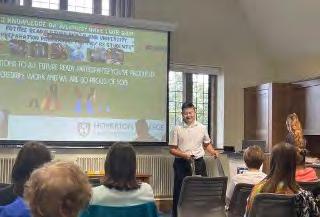
Our library display in March and April was dedicated to two key William Shakespeare events: 18 to 24 March (Shakespeare Week) and 23 April the Bard’s birthday – highlighting the annual celebration of the iconic playwright, whose works continue to captivate audiences and shape language over four centuries later. His legacy extends beyond literature - everyday, we use countless phrases and words coined by Shakespeare in his plays, such as ‘break the ice’, ‘spotless reputation’, ‘good riddance’, ‘not slept a wink’ and many more.

‘Everyman’
Year 13 English literature students visited the National Theatre Archives to see a recording of their set text ‘Everyman’. The show was performed at the National Theatre in 2015 with Chiwetel Ejiofor in the lead role of this updated morality play. Everyman, or Ev to his friends, pays for a hedonistic lifestyle as he faces death having fallen from a party on a rooftop on his fortieth birthday. The action takes place as he falls and reviews his contribution to this world. The show is glitzy, but unsettling, and brings to life a very challenging and modern version of the story.
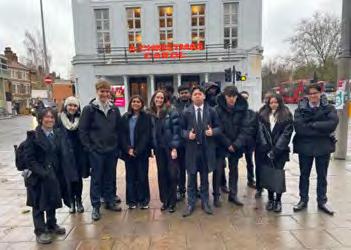
‘Dear England’
Year 10 were captivated by the screening at Orpington Cinema of James Graham’s play charting Gareth Southgate’s transformation of the England football team from individuals to a team. A group that faced their fears and conquered them. The show touched on many inspiring lessons for the students from resilience, through managing image and social media, to gender parity and tackling racism. The boys were enthused both by football and the theatre experience.

Year 7 and 8 students competed in their inter-house English finals. Year 7 students delivered speeches for the Balloon Debate. Each student chose an influential person from history, or alive today and argued that their contribution to society had resulted in the biggest
impact. Students chose a wide range of figures including: Obama, Napolean and Hamilton and impressed with their research, writing and presentational skills. Congratulations to 7H for being the winning form, and to individual winner, Sparsh from 7B for his particularly entertaining and lively speech.
Year 8s delivered speeches on something they wanted to complain about. Topics ranged from Vapes, to the way the British are viewed around the world, to people treading on the back of your shoe. Speeches were imaginative and engaging, utilising a range of features and structural techniques that they have been learning about in lessons. Their delivery was confident and animated, making the speeches a pleasure to listen to. Particular congratulations to winning form, 8H, and to the individual winner, Jaden in 8C.


It was great to see Year 9 getting stuck into interhouse debating, with our Sixth Form mentors providing them with top tips on how to be keen debaters. Students debated a number of cross-curricular topics, and excelled in their demonstration of intellectual curiosity. The final came down to Harvard versus Bingham with Bingham taking the win. Congratulations to Anesu, Vish and Jacob who made up the winning team.

Students must work together to answer a series of questions on various topics, the winning team receiving a packet of biscuits. Rounds included Roman names of modern day countries and the cast of Oppenheimer. Every week has its own unique rounds, half of which are chosen by the losing teams from the previous week.

Well done to all the Year 8 students who put on a fantastic display of drama performances for parents from an array of plays including: ‘King’s New Clothes’, ‘The Pardoner’s Tale’, ‘Unman Wittering and Zigo’ and ‘Ink and Incapability’.

Year 10 student, Om Kuravinakop, will have his essay published in the 2024 Academy Book. He was invited to the 2024 Academy Book Launch Party hosted by Savills in the West End of London to join other student winners of the third annual essay competition – “In 2050, Cities Will Be…”
With the aim of celebrating black artists, we enjoyed a range of poetry, music, dance and acting. There were poems from the Year 7 and Year 8 forms, spoken word from Year 13 students Samuel and Rami, and the ‘Barbershop Chronicles’ play from Year 13 students. There were also a number of musical acts, including raps from Michael in Year 11 and Eghosa in Year 12,
Afrobeats, and performances from our Gospel Choir and the Teachers’ Choir. It was great to see students from every year group involved, many performing on stage for the first time. It was also a pleasure to see so many students enjoying poetry and delivering their poems effectively. Thank you to Ms Wilkie for co-ordinating the show.

The sun was shining in the Wellbeing Garden as students in Years 7 and 8 performed a variety of plays and extracts from musicals. In addition to a selection of duologues from across the year group, 7B performed ‘Revolting Children’ from ‘Matilda’, 7C performed ‘My Shot’ from ‘Hamilton’, 7H performed ‘Pick A Pocket or Two’ from ‘Oliver!’ and 7L performed ‘Naughty’ from ‘Matilda’. In Year 8, Sashank sang ‘Proud of Your Boy’ from ‘Aladdin’. Students performed scripted plays: ‘The Pardoner’s Tale’, ‘Sense and Senility’ and ‘Unman, Wittering and Zigo’. The students showcased their talents and we look forward to seeing their future performances. Thank you to our Head of English and Drama Faculty, Ms Wilkie, and all the staff involved in making the Lower School Showcase such a fabulous event.


Congratulations to Shubh, Eshan, Aagat, Rayyan, James and Ifti in Year 9 for their success in the ‘Poetry by Heart’ competition. Students were asked to choose a poem to learn by heart and perform it dramatically. Rayyan and Eshan were highly commended as a great comedy duo, and the brilliant potential of all our students was noted with their performances which were commended – a fantastic achievement. Amrita in Year 13 was also highly commended for her performances, and Jack, Reyaansh and Debaditya in Year 9 similarly deserve to be celebrated for their commitment to learning a poem by heart.

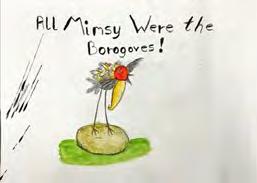
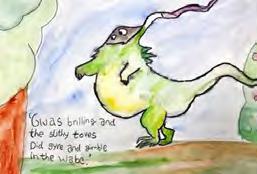


This whole school production told the story of Shahrazad who saves her own life, and those of other young women, through the magic of storytelling. Students performed ‘Ali Baba and the Forty Thieves’, ‘The Bottomless Bag’, ‘The Stolen Donkey’, ‘The Three Swindlers’, ‘Sinibad the Sailor, ‘The Wife who Wouldn’t Eat’ and ‘The Envious Sisters’. For many of our performers this was their first time being part of a drama production and performing in front of an audience, and they excelled. This was very much an ensemble production, but special mention must go to our Year 13 students Olivia Saunders and Rami Kerwash. Congratulations to everyone involved. Thank you to the music department and Thomas Blew for organising music to accompany the production, and to all the staff and PA who contributed in various other ways.

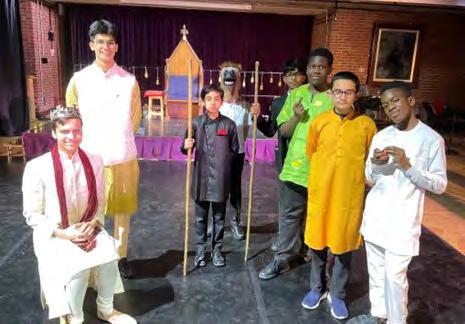




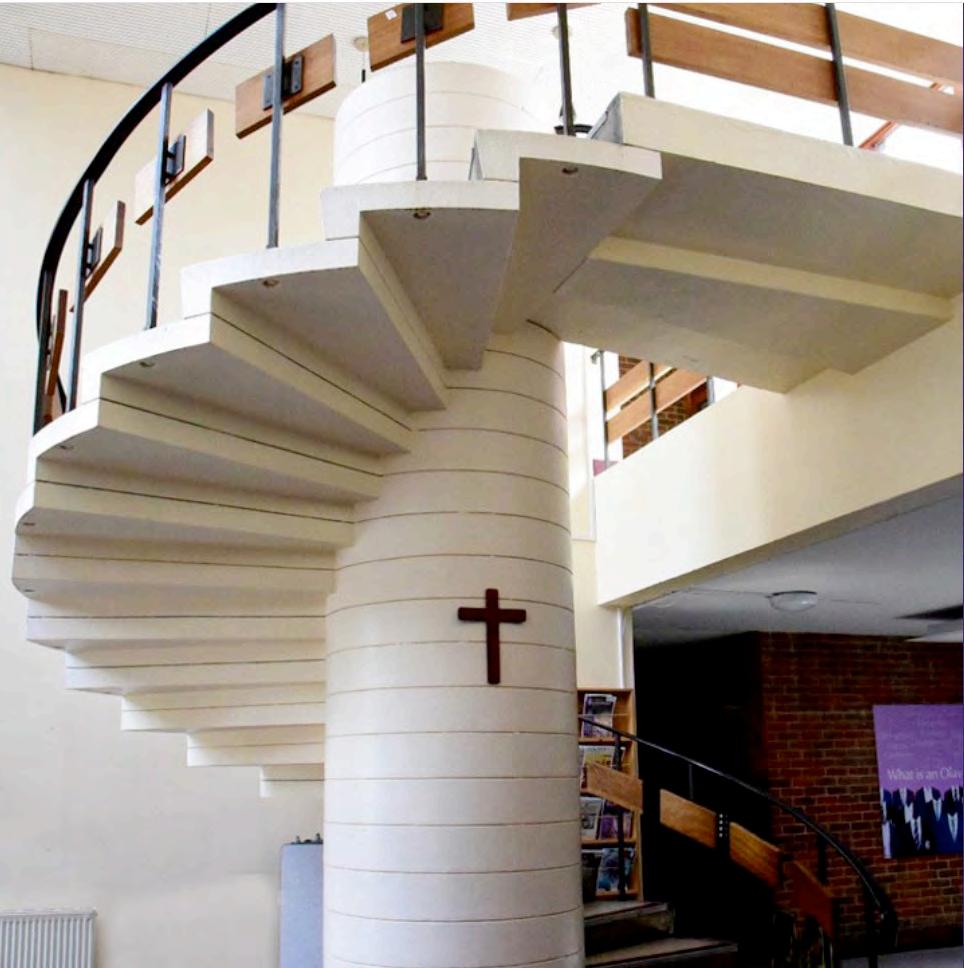


Another year comes round again. I am still here, as is the Chapel. I often wonder what the Chapel has seen and heard over the years. The quote “If these walls could speak” enthrals me. What prayers have been offered here, what challenges discussed, what answers have been found, what despair has been heard? These things make a place what it is. You can feel it when you walk in, you just sense that this place is something special, something different and it has become a place of sanctuary from a busy school life where one can find peace.
Through this year Chapel numbers have increased and settled around 40 students with good numbers in the Chapel Choir and usually about 25 to 30 taking Communion. This Chapel area of the school is now fully invested in wellbeing, with comfortable seating, resources, a room and the Chapel as places to seek comfort, help, counsel and peace. It is a place where many come, both students and staff and where they find solace and comfort.
This year I decided to ask the students and staff what they think about the Chapel, anything you see in italics and within quotes comes from them:
“The Chapel is a place I like to associate with peace, a safe haven, and somewhere I can relax among the busyness and stress of day-to-day life. I find it very inviting, particularly about how it encourages lessons in self-reflection and gratitude, and as a way to commemorate Christ’s sacrifice for humanity.”
“For me Chapel is a place for healing, to connect with your creator and for self-reflection.”
“Our Chapel is a safe and sacred space where I can either enjoy quiet reflection and peace from the troubles of the day or from which I can often hear beautiful, joyful music. We are all blessed as a school community to have such a space.”
“I find the Chapel a place where as soon as I enter, I have a sense of calm, warmth and serenity. The beautiful stain glass windows never fail to strike me no matter how many times I see them and think how fortunate we are to have a Chapel in our School building.”
“I have been attending Chapel for a very long time now, but I think I first came as a complement to church and just for a gathering of people. Nowadays, I very rarely go to church on Sundays, and this service really helps to keep up my faith, and that is why I continue to come now.”
“The Chapel provides a place of real peace and serenity amongst the hustle and bustle and academic pressures of school life, where everyone is welcome to shrug off some of the stress and concerns of daily life and to experience and think about the presence of God, even for a few minutes.”
“To me, the Chapel is a safe and reassuring space – a peaceful place to find comfort and calm in difficult moments.”
As you see the Chapel offers so much to the life of the school. Very few state schools have a Chapel and ours is a reflection on the more than 450-year history of this school. Its founding vision: For the good education and bringing up of youth in the love, fear and knowledge of God and His most Holy word, expresses exactly why we are here and why a Chapel is central to our school.
A great part of the Chapel tradition is music, we have a Chapel Choir who sing at weekly Chapel services and special events, this is run by the students. The Chapel also holds rehearsals for the Wakeham Choristers, those who sing at the King’s Chapel of the Savoy in London each Sunday. The School Chamber Choir also rehearses here each week encouraging both students and staff to come and sing. In the past couple of years, it has also been a space for the Gospel Choir to rehearse. Many Chapel Choir music directors and members have gone on to be choir directors and organists in colleges, choirs and churches across the land. Here are some thoughts about music in the Chapel.
“The Chapel provides an opportunity for the school’s thriving choral tradition to continue to stretch itself, introducing younger singers to learning music quickly and sight-reading, and more experienced singers to greater detail and to singing a harmony part.”
“Having been part of the school Chapel Community since Year 7, I was always enthralled by the traditional hymns and anthems sung, particularly by the Chapel Choir. No matter the year, they always possess a great depth of musical talent and proficiency, and the delicate way they sing reminds me of my time as a treble at the King’s Chapel of the Savoy. It brings a dimension of nostalgia and reinforces the lesson of gratefulness. The music they provide therefore holds some emotional weight and is perfect after the communion I take.”
“Friday lunchtime Choir rehearsals in the Chapel are a haven at the end of the week: a wide variety of students and staff mix with the simple aims of rehearsing for a concert and improving themselves. It is thirty minutes where secular and
sacred music, good humour and challenge blend, allowing us to escape from other pressures.”
“I’d also like to thank you for the opportunity Chapel has given me and many others to direct choirs so regularly, something I’m sure many privately educated and top-level young organists would be jealous of.”
The Chapel provides a basis for the Christian Distinctiveness of St Olave’s. Its Church of England designation means we welcome all faiths and none, that we base our Assembly themes around Christian characteristics, with a theological base, but we also find the links between faiths, those things common to us that we can share. Our Olavian Characteristics are rooted in our Christian base but reflect the attributes that everyone needs to be ready for the world and our place in it.
Throughout the school year we celebrate festivals such as Remembrance and Harvest, we celebrate our diversity and inclusivity. We work to help varying charities and challenge both local and national government to do the right thing. Year 12 have the opportunity to give back to society through the Le Chavetois voluntary community service programme. In this past year we have had several students working in hospitals and care homes, several in primary schools, as well as in chemists, charity shops, animal shelters, tutoring, park runs, youth organisations and hospices. The value of this work for them, but more so for those they help, can never be measured. It is another facet of this school’s history of reaching out to and serving its community.
The school is supported by a regular prayer meeting where parents and carers gather either in the Chapel or over zoom to pray for the school, its students, staff and families. This support can be felt, especially during those crucial times of the year, when exams and results centre the mind for the future. When bereavement comes, when illness strikes and when days seem dark, and support is needed.
We had another wonderful and well attended Commemoration Service at Southwark where we were led by the new Dean and had a wonderful address from The Reverend Canon Justin White, Senior Provost of Woodard Schools, to whom St Olave’s is affiliated. Once again, the essence of that service was one of grateful thanks to our benefactors and to God for all His rich blessings to us over the years.
We continue to give all our new students a school hymn book. It contains many helps, our Olavian Characteristics and our school prayer. It offers a pocket size treasure chest of wise words and great insight. Good News for Everyone also present all our new Year 7’s with a New Testament and Psalms, this also includes guides
and helps for young people, and proves valuable for RE lessons.
As I give thanks for another wonderful year, I am going to give the final words to my colleague who has been part of this school family for many years.
“The Chapel is a key part of the school, providing a ‘family’ feeling in the services and more. It is especially great to hear the singing, both during services and rehearsals.”
Every blessing,
School Chaplain
Congratulations to Year 10 students Eliyas, Kyal, Ademiyo and Mobolaji on raising an impressive £271 from their bake sale in aid of their ongoing fundraising for the education of children in Malawi and India.

Students from our Chapel and Gospel choirs sung Christmas carols at a Community Club lunch at Christ Church, Orpington. The students were thrilled to have the opportunity to sing for members of the church’s Community Club and were well received by a delighted audience, many of whom came up to thank the boys afterwards and told staff attending just how much they enjoyed listening to the carol singing.
Congratulations to Vedant Agarwal, Samarth Patki, Anish Ghosh, Ayaan Shetty, Oluwabukunmi Oloyede, Rayyan Rahman, Jayda Thomas-Arnold and Taiwo Akinsanya who won Jack Petchey Awards. The Jack Petchey Achievement Award Scheme recognises outstanding young people across London and Essex and our students are worthy prizewinners.
Old Olavian, Mr Graham Milne, laid the wreath together with Captains of School, Aditi Rai and Thaddeus Otuoze. Thank you to the Chaplain, Reverend Dr Julie Bowen, for leading the Service and to Mr Price for overseeing the music, which included a performance of ‘The Last Post’ movingly played by Year 13 student, Mikel Emele. It was also good to see governors and guests, including members of the Old Olavians, joining us for the service.

Congratulations to Vivan Upadhyay, Nithilen Leninkumar, Seyon Jeyakanthan, Vedant Agarwal, Sahishnu Jadhav and Thinesh Sachithanandam who won the Bromley Rotary Youth Award for their voluntary activities and community spirit. They were presented with their award on Friday 26 January at Langley Park School for Boys. Congratulations also to Amogh Bhat, James Stoner, Ishan Shanmukha Durbhaka, Maheer Islam and Suhayb Choudhury who received Commendations.
Warm congratulations to Vedant, Sahishnu, Seyon, Nithilen, Thinesh and Vivan, who all received full awards, and in particular to Sahishnu who was the inaugural recipient of the Stuart Jack Trophy, the highest honour of the evening, named after the founder of the award scheme; this was awarded in recognition of the £1175 which Sahishnu raised in support of Mencap by swimming the English channel in September 2023, and for the determination he showed in preparing for and undertaking this feat. Congratulations also to Amogh, Suhayb, Maheer, Ishan and James, the five Olavian pupils who were nominated and who just missed out on a full award, instead receiving certificates of commendation for their contributions to the local community; only eleven certificates of commendation were awarded in total across all participating schools, so it really was a night to be incredibly proud of the many generous and remarkable things which Olavian pupils do in the service of others in their lives beyond school.


Thank you to all students who were involved in Bromley’s Christmas Card Project to support those experiencing loneliness this Christmas. Special mention and thanks to Rhys (7B), Chiderah (8H), and Roshaan (10K) for the cards that they made and to Year 12 student Amogh, a member of the St Olaves’s Hindu Society and part of the Bromley Sanskaar Shakha, Hindu Swayamsevak Sangh, UK, for their generous donation of Christmas cards too.
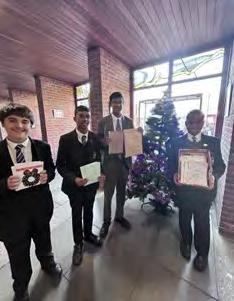
Our Annual Service of Commemoration and Thanksgiving took place on 2 May in the splendid setting of Southwark Cathedral. The Reverend Justin White, Senior Provost, Woodard Schools, gave an inspiring address to a packed cathedral of guests, including the Mayor of Bromley, governors, students, staff, parents and Old Olavians. The outgoing Senior Prefect Team and members of staff read the traditional verses before the whole Cathedral resounded to the final hymn, ‘Jerusalem’. I hope that, particularly for our Year 13s, this will have been a memorable and emotional occasion to look back on in years to come. Thank you to our Chaplain, Reverend Dr Julie Bowen for overseeing the organisation of this wonderful occasion.

Year 10 embraced their Christmas spirit by delivering handwritten postcards to the residents of Goddington Lane. Students even stopped for a chat with local residents about the Christmas period and the importance of coming together as part of the Olavian community at this festive time of year.
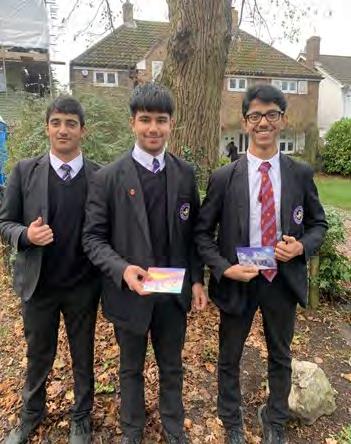
Congratulations to Eliyas, Mobolaji, Ademiyo and Kyal in Year 10 for reaching the semi-finals of the Wings of Hope challenge. The students visited Westminster Central Hall where they delivered a presentation to a panel of judges summarising the work they have done to raise over £2000 for the education of children in Malawi and India. Their fundraisers have taken a range of forms including two bake sales and a sponsored journey over London whereby they visited all locations on the monopoly board (and during which they travelled over 20km). They should be proud of their Olavian commitment to making the world a better place for others.

It was great to see Year 10 continue their ongoing fundraising for the education of Children in India and Malawi with another successful bake sale as part of the Wings of Hope Award. Well done to Kyal, Eliyas, Mobolaji and Ademiyo in Year 10 for organising sand hosting a very successful charity concert at The Blackheath Conservatoire. The event featured a range of performances from students and raised £325 as part of the school’s ongoing work with the Wings of Hope Charity.

During our penultimate assembly of the academic year, we were delighted to welcome representatives of Mercy to Humanity to receive a cheque for £1600 towards their humanitarian work supporting the victims of war. They, together with Médecins Sans Frontières, were the chosen beneficiary charities for the inter-faith Iftar held earlier in the year.

Congratulations to Year 11 student, Sahishnu, who was awarded a Certificate of Excellence for his matchless contribution to swimming and providing vital assistance to individuals with learning disabilities to serve mankind at the House of Commons by Joy Morrissey MP and Bob Blackman MP.
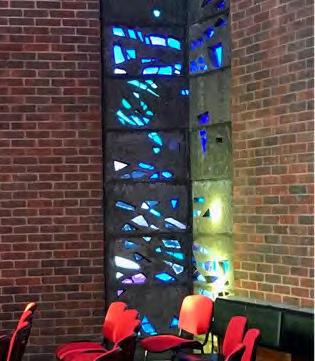

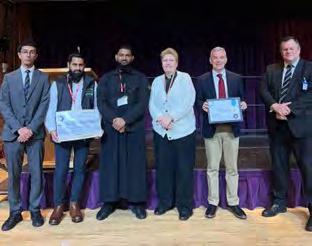
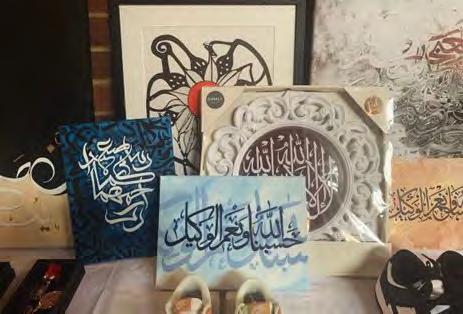




Itis strange to think the current Year 12s were in Year 8 when the pandemic took place. The impact on society and young people is well documented and their education was significantly impacted. However, the GCSE results are testament to the resilience, dedication and talent of this group of young people who have been supported by a committed staff. To see their faces on results day, achieving the best examined GCSE results for St Olave’s, was wonderful. This though reflected only a small snippet of their achievements. Students in this year group put together a second Political Awareness Week with much success. Being held just prior to the announcement of the General Election it served to inform many about the democratic process and the views of different parties and people. In younger years other achievements were also significant. There has been success on the rugby pitch, the cricket field, in debating, chess and the F1 in Schools competition. It was wonderful to see so many younger students in the drama production displaying confidence and commitment to things beyond the classroom.
Rochelle Maxwell Deputy Headteacher (Pastoral)
‘Insight’
Our thanks go out to the Sixth Formers whose interest in this topic has enabled the journal to be produced. When the journal began several years ago the hope was it was another way of reaching out to people whether through contributing an article or by reading it. We have made it freely available on the school website to capture a wider audience. We are very grateful to all of those who contributed, including staff, external speakers or students.
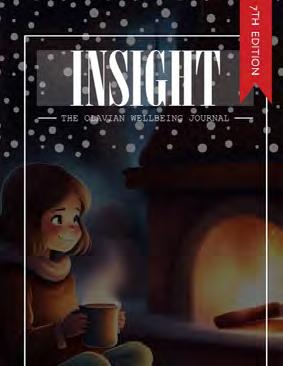

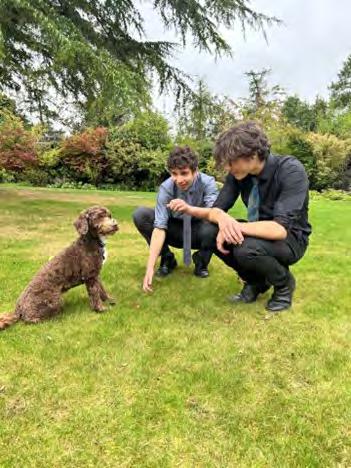
Year 12 students with Shelby, our wellbeing dog in the Wellbeing Garden
Wellbeing Week provides a targeted event which reminds our community about the importance of good mental health. We had several external speakers this year. Money raised, whether it be during this week, on World Mental Health Day, in Movember or Festival, remind us of the support of parents and the engagement of students, in raising the profile of wellbeing and mental health.
It has been an inspiring year to look back on and we are excited to see what unfolds this year. We strive, in all that we do, to prepare our young people for the next stage in their education and a successful and happy life beyond school.

Students in Year 9 and Year 10 were visited by upcoming Indie Pop band ‘The Mercians’. As well as giving students a taste of their live music, band members Matt and Harry spoke candidly about masculinity, mental health and misogyny, offering students an honest insight into the challenges young men sometimes face, and how important it is to reach out to others if you need to.

It is superb so many students in Year 8 achieved the St Olave’s Bronze Award at this event. Part of this achievement is having to demonstrate Olavian characteristics. These values are seen consistently throughout the school, whether it be for example, determination or respect. This event at the end of the school year serves to remind us of the fantastic achievements of those in Lower School. It was lovely to welcome back to school Teddy McAleer. His family have close ties with the school as both he and his brother were school captains. The money raised in memory of Harry, his brother, has enabled the Wellbeing Garden to flourish and be a permanent reminder of the links with this family. Teddy spoke powerfully about his time at school and his career to date. Working as an Operations Manager for a multi-national company demonstrated how one can diversify from a typical Engineering degree pathway. His speech was inspiring.
This is a day to talk about mental health and show everyone that mental health matters. It is also an opportunity to let people know that it is okay to ask for help, no matter what you are going through. Thank you to staff for showing their support for the day.


Movember is a leading charity for men’s health and students led an assembly highlighting this organisation which focuses on men’s mental health, prostate cancer, and testicular cancer. Student voice has seen over the last couple of years a change in uniform policy which has enabled students not to be clean shaven. As a result, we felt it was possible to support this charity more directly.
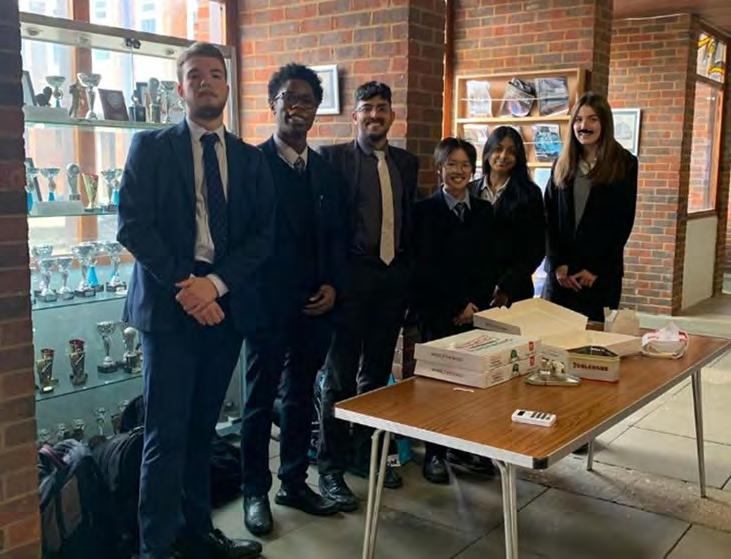
We were delighted with the number of Year 7 pupils who signed up for Bikeability cycle training before half term. Pupils not only learn to cycle but importantly also how to gain independence, social skills and a sense of wellbeing.

We have been raising money to create a Wellbeing Garden as a legacy for Old Olavian, Harry McAleer and the garden was officially opened by Harry’s mother, Sarah McAleer, with members of his family in attendance, on 17 June. It really is a beautifully peaceful place that we hope brings calmness to those who spend time in it in the future.
During collective worship, pupils heard about this year’s Anti-Bullying Week theme - ‘Make A Noise About Bullying’. Mr Birtchnell, Director of Sixth Form and Deputy Designated Safeguarding Lead, talked about always being kind and respectful to others and the issues surrounding playful ‘banter’. Also, Headteacher, Mr Rees spoke about the safe use of mobile phones and how phones can be used to make people feel hurt, threatened and left out. There is a wide range of support and pastoral care in school and students are encouraged to speak to someone and get help if they need to in the knowledge they will be supported.

Congratulations to Year 11 student, Hugo Maxwell, who was elected the new Deputy Chair of the Bromley Youth Council. He was also elected as a new member of the London Youth Assembly (a forum for representatives from different youth councils across London to collaborate) and will be attending meetings up at City Hall and working with a whole range of different people. Each year, the Bromley Youth Council has two foci for its campaigns, and this year they will be Mental Health and Bullying - chosen by young people in the borough.


To celebrate Pride Month, our school library hosted a vibrant display from 1 June to 30 June, showcasing a diverse collection of books that highlight LGBT+ stories and voices. Our aim is to inspire students by presenting a wide range of literature reflecting the experiences and contributions of the LGBT+ community. We are proud to support inclusivity and understanding through the power of reading and hope that the display encourages everyone to explore these important narratives.

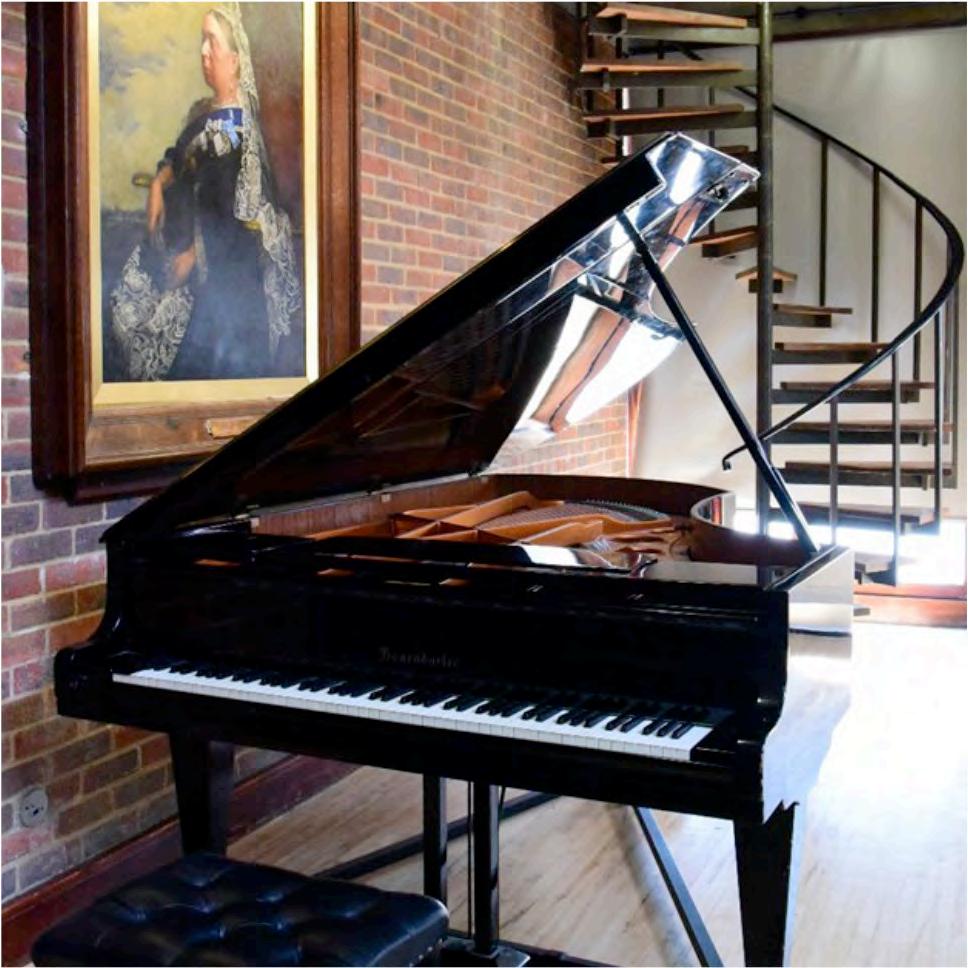

Olavian musicians are independent thinkers, innovators and problem-solvers. They not only have impressive technical skills, but also know how to listen, communicate, present, collaborate and lead. Their superpowers can unite people, inspire, create, support wellbeing, challenge, change minds and enhance almost any other real-world experience. All Olavians benefit daily from music, in some form, from recorded sounds to live performance, consciously and unconsciously. Let’s appreciate what music adds to our lives!
A busy programme of performances and showcases forms the backbone of the music calendar. This year included three mid-term concerts, where a large number of soloists and ensembles presented items in front of parents and friends. These inclusive events saw students as young as Year 7 bravely take the stage to display their instrumental and vocal talents. The Christmas Concert was another highlight, featuring all the school’s larger ensembles and solo items from the most experienced musicians. It was a pleasure to work alongside Miss Wilkie and the actors in the drama production ‘Arabian Nights’. Much of the music was arranged or composed especially for this show, demonstrating the value of Olavian innovation.
As always, the Choristers carried out their duties at the King’s Chapel of the Savoy with admirable dedication and sincerity. The boys sing weekly there, at the Sunday services throughout the year. Additionally, they are called upon for several special services, including some in front of members of the Royal Family. There are numerous carol services for associated organisations, plus weddings and occasionally concerts too. It should never be underestimated the time and energy that the Choristers and their families invest in upholding this busy schedule, nor how valuable and important a scheme it is to be partnered with such a prestigious Chapel.
There were of course individual musical achievements, in such great number as to be impractical to try and list each one separately. One such achievement in particular I would like to mention, however, is that Jenny and Thomas both secured places as string players in the National Youth Orchestra. This organisation is worldrenowned for the remarkably high standard its young musicians reach.
Mr Blew once again organised for ABRSM examiner visits at the school, enabling Olavians to take their exams in familiar surroundings, with some excellent outcomes.

The school enjoyed a bumper year of student organists, with three at Grade 8 standard. Many students also had successes in Trinity Guildhall and Rock School exams at other centres. A programme of student solo performances was also incorporated into the collective worship rota. An excellent performing opportunity for the musicians themselves, these occasions would also highlight the impressive discipline and skill involved and be an inspiration to their peers.
Matthew Price Director of Music
Over the summer holidays, Year 11 student Thomas attended The Organ Student Experience, which is run annually by the Royal College of Organists. This is an opportunity for young organists to work with internationally renowned music tutors, play a variety of first-class pipe organs and experience rehearsing and conducting a choir. During the course, the participants stayed in an Oxford college for six days, played the different Oxford University chapel organs and had the chance to perform two evensongs and a concert at Merton College. It was a fantastic experience integrated with fun social opportunities, which developed the playing technique and musicality of aspiring organists from around the UK.

The St Olave’s community welcomed new Year 12 student Jenny who, during the summer, spent two weeks in Keele with the National Youth Orchestra, preparing for a performance at the BBC Proms. This was an exciting experience for all the highly talented young members of the world-class ensemble. The rehearsals were intense and challenging, but the rewards came in the form of an exhilarating performance and an electric atmosphere at the concert. Jenny also assumed the leader’s chair of the South London Youth Orchestra, another group of gifted musicians this time drawn from areas nearer to home. The course was held at the James Allen Girls’ School in Dulwich, where more than 120 young musicians gathered to make music together, culminating in a showcase at the end of the programme.
Year 9’s trip to the Horniman Museum incorporated a programme which showcased humanity’s diverse cultures and traditions alongside the natural world. Year 9 Olavians participated in a carousel of activities, including an opportunity to play authentic Balinese musical instruments as part of a gamelan ensemble. One of the museum’s most impressive galleries is dedicated to musical instruments, spanning centuries and from every part of the planet. Students also had time in the tropical butterfly house and aquarium, where every colour of the light spectrum was reflected somewhere in the wings or fins of these amazing creatures.
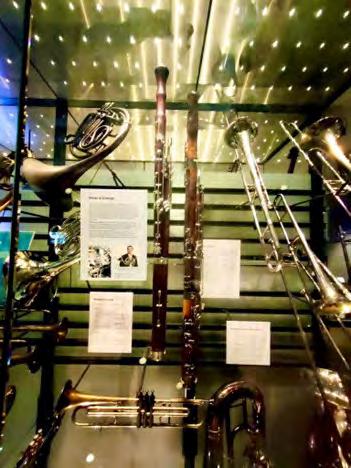

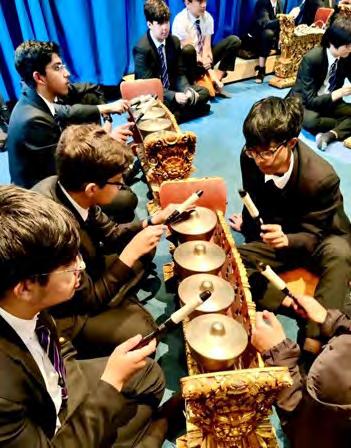
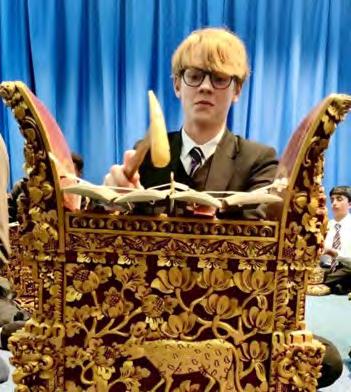
The King’s Chapel of the Savoy was sold out on Wednesday 20 March for a choral concert which included our choristers. Part of the prestigious annual London Handel Festival, the programme featured five of the composer’s large-scale works, written for the Chapel Royal in the 18th Century. This evening of royal music was made particularly special, being held in one of the four present-day Chapels Royal and it was a triumph. The treble choristers’ singing as part of the choir was outstanding. They were also privileged to sing alongside some of the country’s top professional Baroque-specialist singers and instrumentalists. Some of Handel’s polyphonic writing is highly intricate and the boys still delivered an excellent top line in the choruses, for which they received the praise of, among others, the event’s organiser and highly acclaimed conductor Adrian Butterfield. Thanks must go to Philip Berg, Master of the Music and The Reverend Canon Thomas Woodhouse, Chaplain, for enabling this superb concert to take place and for our choristers to have the opportunity to take part. Congratulations to the boys and all the other musicians for a first-rate performance and an uplifting evening for all.
The musical contributions of past and present Olavians were celebrated at the King’s Chapel of the Savoy on Sunday 8 October at the Former Choristers’ Service. Many attended this service to reunite with other Olavians from across the generations. The 11 current choristers sang music by Stanford for this service of Matins. It was obvious that many of the former choristers were keen to join in with this popular perennial setting of the ‘Te Deum Laudamus’ although they restrained themselves! Instead, the congregation made up for it by singing the three hymns with great gusto.
On Saturday 25 November, Year 7 student, Andrew Hick, played trombone in the Bromley Youth Music Trust (BYMT) Pops Band concert, held at Langley Park Boys’ School Performing Arts Centre. It was a busy week, as he also played with the St Olave’s wind band at the Mid-Term concert on 22 November, as well as rehearsing in the St Olave’s orchestra!
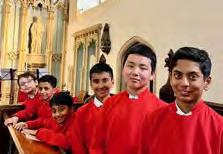

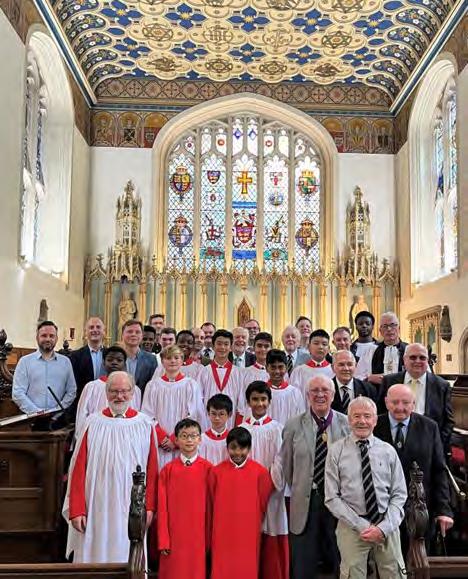
The concert featured a diverse range of solo and ensemble performances, including not only Debussy, but also the Muppets Theme. Once again, the standard was very high. Many congratulations to everyone involved in performing, directing and organising the evening’s entertainment, especially members of the Music Department.
The Great Hall was alive with music and singing with an outstanding Christmas Concert. The Chamber Choir, Chamber Orchestra, Jazz Band, Wind Band, individual singers and instrumentalists each gave high quality performances, with the outstanding Symphony Orchestra rounding off the evening in style. With a blend of choral and orchestral favourites, as well as festivethemed items on the programme, the event was a superb send-off at the end of term, starting the countdown to a well-earned rest over the approaching holiday period. Congratulations to the musicians involved and sincere thanks to everyone, especially our Director of Music, Mr Price, supported by Mrs Attwood and Mr Blew who helped put together such a memorable event.
Jazz Ensemble opened the event with a toe-tapping rendition of ‘Cold Duck Time’. This set the mood for the rest of the concert, seeing more contemporary musical representation, particularly from the rock and pop genre, than many of the previous Mid-Term concerts. The Music Department would like to congratulate all the performers, thank everyone who came along to support this concert, thank Mr Blew, Mr Birch and Mr Robinson for coaching and directing their ensembles and thank the Parents’ Association for providing refreshments during the interval.
The Great Hall was alive with music with an excellent Summer Mid-Term Concert. The hard work of all student and staff participants was richly rewarded in what was a first-rate evening, enjoyed by all. Congratulations to the musicians involved and sincere thanks to everyone, especially our Director of Music Mr Price, Mrs Attwood who led the evening and Mr Blew as they put together a memorable event.
The Music Department is very proud to announce that three Olavian organ pupils of Mr Blew - Thomas, Ben and Yiming - all achieved Distinctions in their Grade 8 ABRSM exams. A huge congratulations to them.
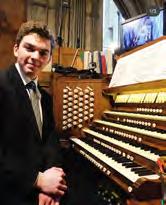
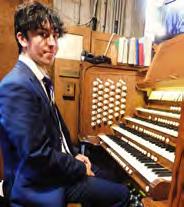




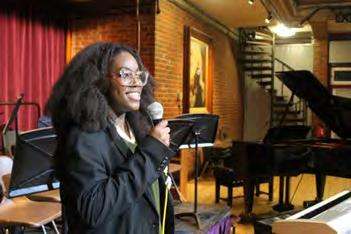








many more events than usual have taken place in the last academic year in the French Department that students and staff have not seen time fly by, culminating with our huge success in GCSE, AS and A levels.
It began with a very successful European Day of Languages, supported by the two Languages Prefects: Elo Esalomi for French and Jay Osborne for German. They both delivered an informative assembly, followed by a very popular face-painting breaktime, while Dr Pickett ran an International Karaoke and Frau Probodziak had organised the yearly Bake sale which raised £330 for the ‘Red Cross Morocco earthquake Appeal’. The Language Prefects also organised a House competition Quiz and a Teachers versus Sixth Formers Quiz.
Hard on the heels of this day of celebrations, came our traditional trip to the Cinéma Lumière in South Kensington, where the Year 13 students of French meet the newcomers in Year 12. This coincided with the cinema’s Black History Month programme, so we all watched Omar Sy in ‘Les Tirailleurs’, a poignant film that retraced the dilemma of a Senegalese father wanting to follow his son, taken from Senegal to reinforce the French troops on the battlefields of WW1.
In November, Elo, Shreya, Freya and Eli from Year 12 and 13, gave up their day off school in November (INSET) to lead a whole morning of French language activities for different year groups at Bishop Challoner School in Bromley. They were complimented by Mrs Ryall, Head of French, and by the Headteacher due to the very positive response received from their students.
January saw the participation of four very brave Year 12 students in the Regional Heat of ‘Les Joutes Oratoires’ (the National French Debating competition) at the London School for Girls. It takes determination, stamina and aplomb to debate in French which deserves our admiration, even if they did not go forward to the semifinals. Our two teams were Freya Keable and Michelle Sui, as well as Azizah Olatunji and Mikael Kyriakos; they faced well-rehearsed teams from Colfe’s, City of London Girls School, Hampton and Queen Elizabeth School.
Two events took place in February, starting with the yearly UK Linguistics Olympiads in which 20 of our Sixth Form linguists: Latinists, Germanists and students of French sat a 2½ hour linguistics paper for the first round. We were very proud to see several Bronze winners
and winning Silver: Olivia Saunders, Michelle Sui and Arjun Jadhav.
Then students in 7B, 8B and the Year 8 French Fast Track class attended the Onatti Theatre Company performing their bilingual play in school, a very engaging play, depicting so well the language difficulties encountered by travellers when needing to stay abroad. Another French play was performed to KS4 students: ‘le cours d’art’ which coincided with the Semaine de la Francophonie. All classes were able for one week to experience the language in different ways: taking part in an Escape Room in Year 7, watching a French detective animation film in Year 8, researching information on different French-speaking countries in Year 9, watching ‘Les Intouchables’ in Year 10, reading about ‘Francophonie’ in Year 12. French Prefect, Freya, created quizzes for the whole school and a school assembly. She also organised a five-a-side football match to replicate the ‘Francophone countries Games’. A new event: an online meeting with a class in Martinique marked the beginning of a second pen pal scheme, coupled with our existing scheme with our partner School: L’Institution de la Croix Blanche.
Early March, Owen in 7B was selected for French to compete in the National Spelling Bee Competition first heat, a new competition lead by Frau Probodziak. There were very many schools who had extremely fast spelling boys and girls and although Owen did not qualify for the finals, he nonetheless fought his corner very honourably.
Also in March, a group of 20 Year 8 students had the opportunity to attend a day at the Institut Français in South Kensington where they learnt about the evolution of French cinema in the morning, mostly in target language and watched at the Cinema Lumière the very famous comedy which broke box office records in 1966 and was still very well received by our young boys who learnt at the same time about an episode of French history.
It was the turn of Year 7 students in 7B in May to attend a day at the BFI Imax cinema, devoted to short films analysis with language exercises in the morning followed by the recent remake of the long film ‘Belle et Sébastien’ which was liked so much by a full auditorium of KS3 pupils that they clapped at various intervals during the film!
During Activity Week 1, the Year 9 French exchange
participants with for the first time a slightly bigger group of Newstead Year 9 students set off for a full week in Bondues, attending lessons at school for one and a half days, They also visited the National coal mining Museum, enjoyed a sand-yachting workshop on Boulogne beach, and visited the National Marine Biology Centre and Aquarium: Nausicaa. Our participants also took part in a breadmaking workshop and having been exposed to the French language in their respective host families, came back more confident than when they left. It was their turn to welcome back their French partners mid-June, when they were allowed to attend the same West End show as their French partners: ‘Back to the Future’.
All Year 7 students travelled to Boulogne over two separate days, on their one-day trip organised by Mrs Napier, one half of the cohort focussing on the French market and the other half on the Casa José de San Martín, one of the most treasured heroes of the 19th Century for South Americans as he liberated his country, Argentina, in 1816.
Finally, Year 10 students of French travelled to Angers to visit the Loire region with activities ranging from visiting Leonardo de Vinci’s last home: Le Clos Lucé to enjoying a chocolate making workshop in Amboise, walking through a troglodyte village: Rochemenier, visiting the National Horse Riding School in Saumur and spending a day in one of the most famous theme parks in France: Le Puy du Fou, where numerous episodes of the history of France are represented with spectacular special effects. Participants also received a guided tour of an operating water mill where they lunched on the local speciality: ‘les fouées’ after taking part in a breadmaking workshop, lead obviously in target language.
We hope to have inspired a few students to continue to be curious and try out their spoken French.
Isabelle Saunders Head of French
On 23 January, two teams of Year 12 students: Freya and Michelle as well as Azizah and Mikael faced teams from Colfe’s, City of London Girls School, Hampton and Queen Elizabeth School, in the qualifying rounds of the “Joutes Oratoires”, a national French debating competition. These regional heats were held at St Paul’s Girls School. Our two teams acquitted themselves brilliantly, receiving congratulations for the quality of their French at this stage in Year 12.
Cinema trip
Black History Month was at the heart of the Ciné Lumière trip on 9 October, offered to Sixth Formers studying French. The film entitled ‘Tirailleurs’ (Father and Soldier in translation) was filmed in 2022 and featured at the Cannes Film Festival last summer. The film featured Omar Sy whom students know for acting a major part in ‘Les Intouchables’ or for watching ‘Lupin’ on Netflix. The plot revolves around the father-son relationship and is set during WW1, when Senegalese young men were rounded up by the French army to fight alongside allied forces, as Senegal was still a French colony.

UK Linguistics Olympiad
20 of our Sixth Form linguists, Latinists, Germanists and students of French, sat a 2½ hour linguistics paper. In their Advanced Level paper this year, they were asked to decode Adinkra symbols used in Ghana, Kannada (a Dravidian language spoken by around 60 million people, primarily in the Karnataka state in south-west India, decode Georgian, as well as Zou, also known as Zo, a Sino-Tibetan language spoken primarily by around 88,000 Zomi people around the India-Myanmar border among other languages. Congratulations to Henry Cattermole, Sophie Chou Polis, Mikael Kyriakos, Mark Ludden, Fawaz Razac who achieved the Bronze level and Olivia Saunders, Michelle Sui and Arjun Jadhav who achieved Silver. In total, there were 1822 competitors nationwide.
French Study Day
20 of our Year 8 French students attended a morning of language activities at the Institut Français based on one of the two most popular French films of all time. ‘La Grande Vadrouille’ broke all records when it came out in 1966. The film features two of France’s most famous comic actors: Louis de Funès and Bourvil who go on an epic voyage through occupied France to the free zone as they help British pilots to avoid German captivity during WW2. Our students coped very well with language exercises on the world of cinema and the specialist vocabulary needed to describe it. The film enabled students to establish connections with what they have covered in their history lessons, namely the evacuation of British and French troops from Dunkirk. Thank you to Mme Komuves for accompanying the trip.
Students were given the opportunity to attend this very engaging play, depicting so well the language difficulties encountered by travellers when needing to stay abroad. The plot was set in 1540; a young English Knight has been sent to France by King Henry VIII. He must find a suitable lady for the king to marry. He must paint her portrait and return to England. He only knows a little French, he can’t paint, and the lady has a very protective maid! What could go wrong? As usual, members of the audience were asked to take part and go on stage. The boys and Mr Duncan answered questions in French with superb panache.

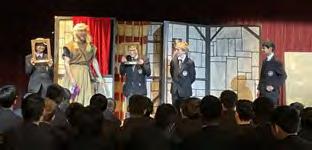
Students wasted no time throughout the day devoted to French short films and a full-length film. They watched three short films in two hours and were encouraged to take the microphone to give answers to the many language exercises linked directly to each film. Several Olavians rose to the challenge in front of a packed auditorium of other KS3 students and teachers. It was a fantastic and unique opportunity to manipulate the grammar and vocabulary learnt so far this academic year and to discover new vocabulary with a sense of purpose. After a brief pause for lunch, it was time to watch a classic: ‘Belle et Sébastien’ a film adaptation of a novel set in the Northern Alps, by the Swiss border during WW2. The main plot revolves around a young boy, living with an elderly man who adopted him at birth and who develops a powerful link with a stray mountain dog. Sébastien spends his days in contact with the dog that he names ‘Belle’ enjoying a childhood close to nature and mountain animals. This film which was full of gripping moments was well received by the audience.
La Semaine de la Francophonie
A number of activities took place during this event.
Year 9 students studying French attended a play entitled ‘Le cours d’art’ performed by the Onatti Theatre Company. The plot revolves around a class of teenagers being trapped in an art classroom, from which ensues bickering among the students and chaos, very well suited to our students’ age range. This provided a perfect opportunity for our students to realise that they can understand a lot more language than they think.

An online meeting with a class in Martinique took place. Several students from different years were invited to ask prepared questions to students about their way of life, using language learnt in their lessons with real native French speakers of their age.
7B contributed to freeing Obelix from the Louvre Museum where he had been locked in by his kidnappers by solving a range of language puzzles, covering vocabulary learnt so far this year. This activity contributed to valuing group work and to making reading of French comic books more familiar. These are such a popular art form in France and Belgium that it was surprising to see how few knew about the adventures of Asterix and Obelix. There was a real sense of intense purpose as the class only had 20 minutes to find the code needed but one group managed this: Eric K, Giles M, Rhys J and Abinash A.

8B watched a French animated film ‘Un chat à Paris’, where the plot revolved around catching a gang of thieves and a criminal. Students then completed a booklet, showing their understanding of the plot. It is a gripping story which also raises awareness of France’s leading role in the field of animation.
Year 10 French classes watched ‘Les Intouchables’, a comedy based on a true story which features the iconic Senegalese actor Omar Sy. This film was then exploited orally and in writing to give an opportunity to students to write a film review and talk about their favourite scenes. The film is always very well received, as students see how, from struggling in the Paris suburbs to make ends meet, the main character rises in society by seizing opportunities.

A short football match was played by students who have relatives in French-speaking countries, replicating the ‘Francophonie games’ organised across the world. The French-speaking countries team won the match. All year groups were mixed: it was another example of how sports unite all ages.
Year 9 French students took part in an exchange trip to Bondues in France where they participated in a bakery workshop and visited the National Coal Mining Museum. Monday was a Bank Holiday in France, so most of our exchange trip students went away with their host families; some spent a day in Paris, some went to the Coast, and enjoyed beautiful sunny weather. Other activities included sand yachting and visiting the National Sea Centre, Nausicaá.
The Year 9 French Exchange came to an end for this academic year when the French school party came to us on their return leg stay in our families. It was the turn of our participants to host them in their homes and to ensure that the French visitors were exposed to as much English language as possible. They were able to spend two days in London, visiting the most famous landmarks: Westminster, 10 Downing Street, Covent Garden, the
Tower of London, where they saw and heard the sound of the cannon in honour of the Japanese Emperor and Empress visiting London on 25 June. They attended lessons for two days, including an introduction to cricket as part of the Year 8 Sports lessons. They were also keen to attend an assembly which they managed to do on the morning of departure, as assemblies do not exist in France. They were suitably impressed by their experience and benefited enormously not only linguistically and culturally but also socially.

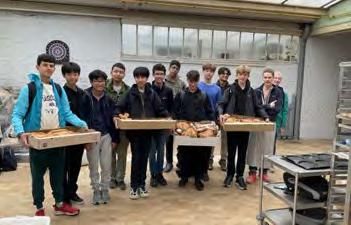
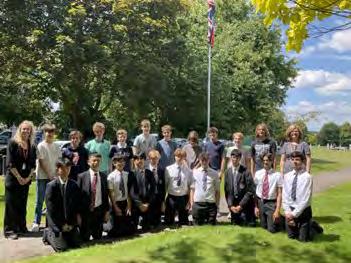
Year 7 travelled to Boulogne, bringing their usual energy and enquiring minds to this traditional, picturesque French town. They visited the market and bought some lovely pastries and baguettes, explored the old town and walked through the cobbled streets, observing the locals, the architecture and the history. Finally, they visited the Nausicaá aquarium and were wowed by the diverse sea life it has to offer. The pinnacle being the sea lion show in which sea lions demonstrated their various abilities to interact with each other and their trainer. Many thanks to all of the staff who came and helped make the trip such a brilliant and memorable day.


Year 10 students of French travelled to Angers to visit the Loire region with activities ranging from visiting Leonardo de Vinci’s last home: Le Clos Lucé to enjoying a chocolate making workshop in Amboise, walking through a troglodyte village: Rochemenier, visiting the National Horse-riding school in Saumur and spending a day in Le Puy du Fou, one of the most famous theme parks in France, where numerous episodes of the history of France are represented with spectacular special effects. Participants also received a guided tour of an operating water mill where they lunched on the local speciality: ‘les fouées’ after taking part in a breadmaking workshop, lead obviously in target language.
Throughout the academic year 2023/24 the German Department could offer a great range of activities, including international travel and exchanges to increase students’ knowledge of the German language, culture, history and way of life.
We started a pen-pal collaboration with our new partner school, the Dante Gymnasium in Munich. Each German student was allocated to one of our Year 7 and Year 8 boys who had the opportunity to exchange information about their school and private life in writing.
During February half-term, Herr Birtchnell and Frau Prestipino travelled to Berlin for 5 days with the Sixth Form’s German students. Our students had the opportunity to visit many iconic monuments and places in the German capital, like the Bundestag, the Old Synagogue and the Brandenburger Tor.
Furthermore, we were able to organize a trip to the Rheinland during the summer Term. Year 10 students visited Cologne and other places of interest on the Rhine with Frau Thieser-Craneburgh, Frau Prestipino and Herr Birtchnell, experiencing a broad range of visits to museums and the famous cathedral whilst also having the opportunity to develop their language skills through the various tours they took part in.
There were also visits within the UK, such as to the Goethe-Institut in London, the Francis Holland School or the British Film Institute. We also welcomed people to school, like a theatre group which performed a short play entirely in German or an old Olavian who gave a speech to our Year 11 classes on the advantages of studying German at A Level.
Sixth Form Germanists, together with Latinist and students studying French took part again in the UK Linguistics Olympiads. Furthermore, German students from all Key Stages participated in many other competitions, where they were quite successful. Olavians won German competitions like The Anthea Bell’s Translation Price, The International Deutsche Olympiade, the Oxford German Olympiad and the Spelling Bees.
Our MFL Prefects continued to do excellent work to promote languages in the school. They ran a Language Club with a range of MFL topics and they helped the Departments with events, such as the European Day of Languages or the school’s Open Day.

For the new school year we plan to further develop extracurricular activities and to instil a love of the German language and culture in our students.
Lidia Prestipino Head of German
We celebrated European Day of Languages with an array of fun activities from a bake sale to face-painting and linguistic themed quizzes. Jay and Elo, the two Modern Languages Prefects, led a very informative assembly, followed by a webinar delivered by Lancaster and Manchester University students and lecturers to all Year 7,8 and 11 students on the value of studying foreign languages. The School Library also had a wonderful display supporting this important day. Thank you to everyone who contributed towards the impressive sweets, bakes and savouries for the International Bake Sale which raised £330 for the Red Cross Morocco Earthquake Appeal. Finally, Dr Pickett ran an international karaoke. Thank you to the Modern Languages Faculty and Prefects who arranged a full day of impressive activities and to our catering team for providing an international menu on the day.

Year 12 German students attended a study day at the BFI in London which focused on the legacy of East Germany in cinema. Students watched clips of German films about the former GDR, such as ‘Sonnenallee’, ‘Das Leben der Anderen’ and ‘Ballon’. They completed tasks such as looking for key symbols, analysing camera angles and planning the sound and music for various scenes. After lunch they watched ‘Goodbye Lenin’ which is a film about the fall of the Berlin Wall and the impact of the East German regime on a family. This is the film that Year 12 study as part of their course so it was an incredibly valuable experience.
30 Year 8 German students spent a day at the Goethe Institut in London. They listened attentively to a presentation on all activities organised by the Institut, including Gimagine, a project in cooperation with the National Consortium for Languages Education (NCLA) to enhance the teaching and learning of German in the UK. It was great to see our students so engaged; finding out how German can not only enrich them culturally but also how the language can really favour them in the world of work. Pupils also participated in a workshop on Graffiti in Berlin and a Library hunt. Finally, they were able to watch a film in German in the Auditorium about a group of children solving a detective case (die Pfefferkoerner) followed by an award presentation where they won quite a few prizes.
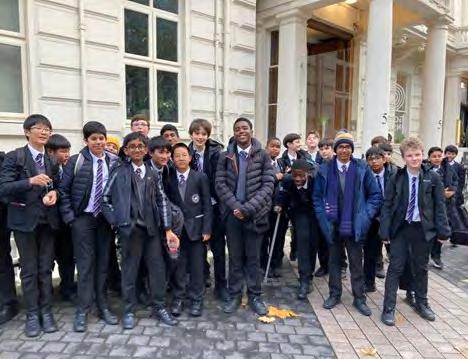
7H also had a fantastic day at the Goethe Institut. They took part in a library quiz in which they enriched their knowledge of German language and culture. In addition, they embraced modern technology by meeting the robot librarian to whom they tried in vain to converse with in German! Sadly, the robot’s German was not up to scratch and it just nodded from time to time! In addition, our pupils experienced a Christmas workshop in which they made festive decorations, learned the iconic Christmas song ‘O Tannenbaum’ and deepened their understanding
of festive traditions in German speaking countries. They had a brilliant day and came away with an even deeper curiosity for German and its importance within the world of work, academia and on the global stage.
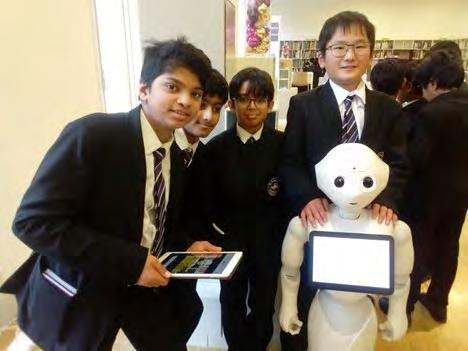
Onatti, a company specialising in performing to students using only the languages studied, presented the show ‘Der Babysitter’ in the Great Hall for our Year 9 and Year 10 students. The plot of the story was about a babysitter called by parents to look after their child whilst at a party. The babysitter’s boyfriend Jakob unexpectedly came to the house and……so much went wrong! The show created an opportunity for students to hear German in a very lively and amusing way, including core vocabulary known to them from the GCSE syllabus. The students were presented with an extract prior to attending the play, as well as exercises to familiarise themselves with unknown vocabulary. The actors made it very interactive and asked students to come on stage and respond to their cues.
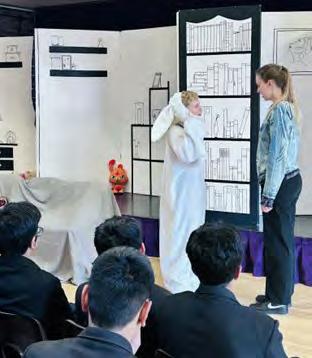
Year 12 and 13 students of German travelled to Berlin with Frau Prestipino and Herr Birtchnell. They had an extremely rich and varied itinerary, including visits to the Bundestag (German Parliament), The New Synagogue, The Palace of Tears, the Museum of German Resistance in WWII and many others. They took the opportunity to walk around the city taking in sights like the Brandenburg Gate, Alexanderplatz, the famous East Side Gallery and the Ku’damm. There were also opportunities for shopping
and the chance to try traditional German food. It was a very enjoyable experience, and the students were able to use their German speaking skills every day.
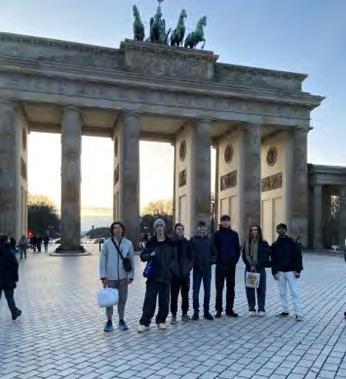
Year 9 German students, Faarhan Jabbar and Rayhaan Smith, competed in the International German Olympics Finals at the Goethe Institut in London. Their dedication and hard work truly paid off, showcasing not only their linguistic talent, but also their commitment to excellence. We are very proud of both students and their remarkable accomplishment. Their success reflects their talent, perseverance, and the excellent support they have received from Frau Napier and our supportive community. Faarhan won 1st prize, with the opportunity to represent our school and the UK for the German A2 level in Göttingen in July 2024.
competition: “Make a video entitled “Mein Odradek” showing and explaining how to make an imaginary animal or insect out of materials of your choice and showing how your Odradek moves about.” Ashwin and Shaurya were invited to Oxford University for the Oxford German Olympiad 2024 prize giving ceremony in June.

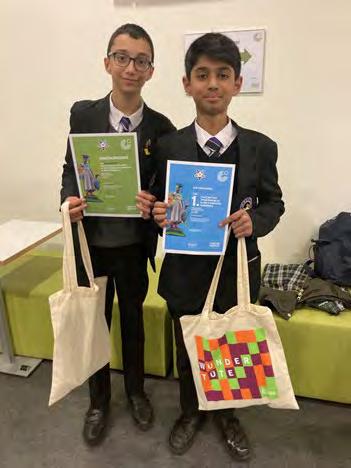

Year 10 German students Ashwin and Shaurya won prizes in the Oxford German Olympiad 2024. Ashwin won 1st prize in the competition “Design a brochure for a study trip focused on the conservation of a particular species of animal” and Shaurya the runner up prize in the
On Monday 1 July, Jayden Aisabokhale travelled to Cambridge to participate in the National Finals of the Spelling Bee in MFL 2024. Jayden successfully completed the in-school rounds of the competition, coming up against tough opponents from the rest of Year 7, and displaying fantastic understanding of German spelling and sound systems. The atmosphere in Cambridge was alive with anticipation and nerves on the day of the National Final, with students from various year groups and from up and down the country present to participate in their

chosen language. Jayden did so well to represent himself and the school at this event, and although he did not win, we are immensely proud of him and all he achieved. Well done, Jayden.
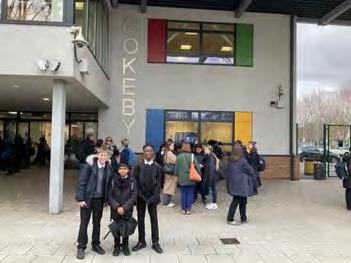
In December 2024, our Year 12 German students, accompanied by Frau Thieser-Craneburgh and Frau Prestipino, had the opportunity of visiting the British Film Institute (BFI) for a fascinating study day focused on the legacy of East Germany in film.
The students attended engaging interactive talks conducted in German, exploring themes of German reunification and life in the former DDR. These sessions offered a unique insight into the cultural and historical significance of films portraying this pivotal era in German history.
In the afternoon, the group watched ‘Goodbye Lenin’, an interesting and humorous film that they will be analysing in preparation for their AS and A Level examinations. The screening enriched their understanding of the film’s context and themes, bringing their studies to life.
In July 2024 we were able to organize a trip to Cologne and the Rheinland. Year 10 students visited Cologne and other places of interest on the Rhine with Frau ThieserCraneburgh, Frau Prestipino and Herr Birtchnell, experiencing a broad range of visits to museums and the famous cathedral whilst also having the opportunity to develop their language skills through the various tours they took part in.
Anthea Bell Translation Prize
We are delighted to announce that Year 13 student, William Blackwood, won his entered category of the Anthea Bell Translation Prize. This prestigious competition is run annually by Queen’s College Oxford. Well done William.

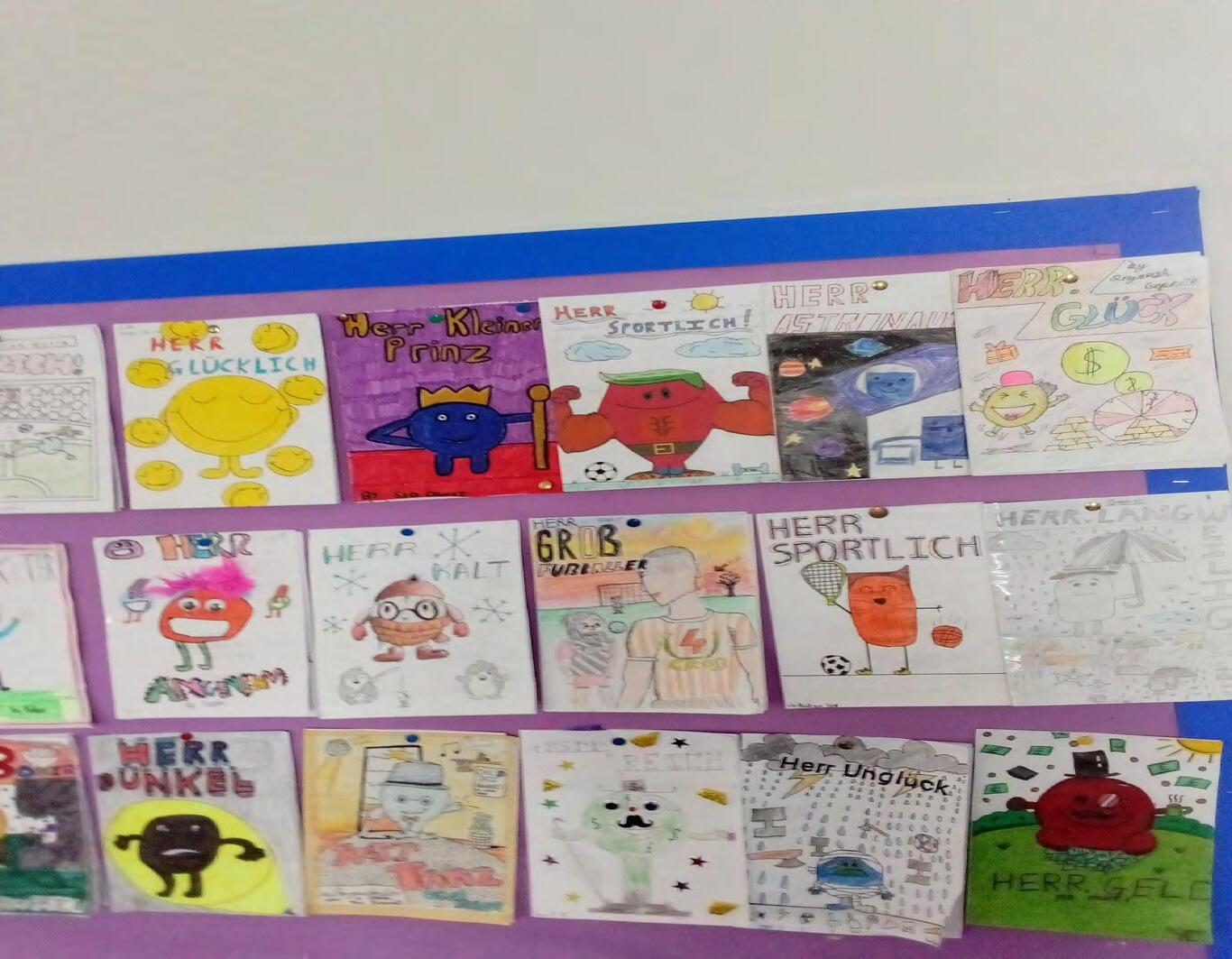

This year has been a remarkable one for the Spanish department, marked by both expansion and enthusiasm. For the first time in many years, Olavians took on the challenge of GCSE Spanish and all passed, many achieving top grades of 8-9. From a small fasttrack group of 18 students five years ago, the department now teaches an impressive 200 plus students all the way up to Key Stage 5. The popularity of Spanish has soared.
From early in Key Stage 3, where Year 7 students enjoyed a trip to Boulogne-sur-Mer with an Argentinian twist. This seaside coach visit not only introduced them to the charm of France, but the real excitement came when the Argentinian Military Attaché, dressed in formal uniform, invited and guided them personally around the historic Casa de General San Martin (the museum of the Great Latin American liberator) …all in Spanish!
The interest in Spanish this year has been undeniable, with students keen to embrace both the language and the vibrant Hispanic culture. In the classroom, learning has focused on consolidating knowledge from previous years which means both speaking and listening skills have been fine-tuned. Lessons have been enriched with cultural topics, such as discussions on football, Latin American music, and Mexican traditions. Students have also had the opportunity to explore culinary delights, comparing the differences between Spanish and Mexican tortillas. The excitement has even led some students to take the next step and start Spanish at A level - a testament to their engagement, enthusiasm and hard work.
A highlight of the autumn term was the Onatti Theatre Company’s visit, with a Spanish play about a camping holiday which goes horribly wrong. The comedic performance, filled with dramatic scenes, captivated students without the need for dictionaries or translation apps. The laughter in the room proved that language comprehension comes alive in creative settings. One lesson was clear: future trips to Spain should avoid any camping altogether!
Outside of the classroom, St Olave’s students participated in a multilingual interschool event at Queen Elizabeth’s Grammar School in Faversham. The day, akin to ‘The Apprentice’ TV show, challenged students to work in mixed teams and rebrand products for international markets. The Olavians revelled in the competition, especially with their innovative idea of a spicy jellybaby which would gain its inspiration from ‘Las Fallas’, the famous Valencian festival where the “taste explodes in the
mouth”. Consequently, their pitch was hot, explosive, and highly memorable. Special congratulations go to Sarthak Pandey, Ethan Matias, and David Wade for their outstanding performances in this event, where they displayed creativity, collaboration, and linguistic flair. Let us not forget, Spanish is a business language and its use in America will only increase.
All in all, this year has been a huge success for the Spanish department, with both academic achievements and cultural explorations taking centre stage. As the department looks ahead to more opportunities in the coming year, one thing is certain: the enthusiasm for Spanish will continue to grow. ¡Enhorabuena!
Martin Pickett Head of Spanish

Year 7 trip to Boulogne-sur-Mer
The Year 9 Valencia trip began at Gatwick Airport, with 14 students led by Dr Pickett and Mr Lay. They settled into their hotel rooms and explored a local supermarket, using their Spanish skills to discover culinary delights. Next, they attended a Spanish speaking course at Costa de Valencia, delving into the city’s history and the famous Las Fallas festival. Evenings included friendly dinners with Spanish penpals and bilingual quizzes. The students explored Valencia through walking tours, visited markets,
and played beach football. The trip culminated with a visit to Mestalla stadium and football museum. Their exemplary behaviour and real-life Spanish usage were commendable. Thank you to the staff for leading an unforgettable experience. ¡Enhorabuena!


The Onatti Theatre Company performed the Spanish play to Year 9 and 10 classes of Spanish. It was another engaging and interactive performance, and the actors captured their attention and had everyone laughing out loud with their tale of an Air BnB reservation gone wrong. Well done to the boys who participated in the performance
Just like in business, you have to expect the unexpected and so it was when 12 linguists from St Olave’s turned up for a multilingual interschool day event at Queen Elizabeth’s Grammar School in Faversham. They were placed in mixed teams with students from a variety of other schools in Kent and London. Similar to the Apprentice TV show, they had to know the difference between marketing and selling to run different multilingual projects. The Olavians on the runnerup team came up with the ingenious and rather spicy product built around Las Fallas, it would be hot and spicy while exploding in your mouth, reminiscent of the Fallas in Valencia! Special mention for outstanding performances go to Sarthak Pandey who won 1st prize for great attitude and use of languages in business, to Ethan Mateias on exceptional negotiating and to David Wade for his perfectly-delivered presentation.


In July, Year 10 students embarked on an exciting trip to Madrid and Salamanca, where they were able to fully immerse themselves in the language and culture of old Castile. Their first day in Madrid included visits to several iconic landmarks, starting with Tapas in the picturesque Plaza de Santa Ana going all the way to the ancient Temple of Debod. The group strolled past the Royal Palace and rested in Plaza España. That very day Kylian Mbappe had been presented to the Real Madrid faithful and our group now had the chance to visit Real Madrid’s legendary stadium, the Estadio Santiago Bernabeu.

The second leg of the journey took students to Salamanca, where they continued their language immersion at a local language centre. They explored the old city, famous for its historic university, which is the oldest in Spain. Walking through Salamanca’s beautiful streets, they learned about the city’s rich history and cultural significance, from the intricate architecture to its bustling marketplaces. The students even had the opportunity to climb the towers of the cathedral of Salamanca, offering breath-taking views of the city below. The day ended with a lively party, complete with dancing and table football, allowing both students and staff to unwind and bond over their shared experiences. No visit to Spain would be complete without experiencing its famous cuisine and so learning how to cook Tortilla Española and Paella was a real treat.
This trip allowed the boys to put their Spanish skills into practice and ultimately gave them a deeper appreciation for the language and the culture. Whether navigating their way through the local markets, interacting with Spanish locals, or simply soaking in the rich history of Salamanca, the students returned with newfound confidence in their language abilities and an eagerness to continue their Spanish journey. It was the perfect culmination of a year filled with growth, learning, and unforgettable experiences.
On the last day, perhaps the Cloudstrike computer meltdown in July was too much action at one point, especially when the flight was cancelled. Fortunately Dr Pickett, Ms Smith and Mr Price were at hand to help all 35 boys stay an extra night in a 4-star hotel while they all waited to return safely back to London the day after. Some Olavians volunteered to stay longer, what a sacrifice!



For the Year 7s who do not know what the battlefields trip is, in May, we went on a trip to the battlefields in France and Belgium to learn more about WW1. The trip was three days long and took us to England, France, Belgium, Germany, and Canada. Importantly, it gave us a chance to escape the walls of the classroom and absorb information first-hand rather than via the pages of a textbook. More than just being a break from classes, we learnt while having fun.
A version of this trip has been running since my father was at this school, well over 20 years ago, which makes it something of an Olavian tradition. It is very important because it provides a unifying experience for all Olavians both in learning about our shared history and as a shared experience. Rather than talking you chronologically through the trip, we will focus on the experiences which stood out most to us both.
The trip helped us remember the soldiers who lay down their lives for their country, and not just the British ones either; we visited Thiepval in France, the largest WW1 memorial in the world, which commemorates British, South African, and French soldiers. We also paid a visit to Langemark, where over 44,000 German soldiers are buried, which added another perspective to our knowledge of WW1. Quite unlike the British cemeteries, which were cheery enough for a graveyard, the still, sombre air at Langemark was something completely different. There was a palpable darkness which stood in complete contrast to the bright and almost triumphal nature of the Commonwealth graveyards.

We paid our tributes to several Old Olavians who died during the Battle of the Somme and also visited the Lochnagar Crater, a 100m wide hole in the ground, which was the result of a mine denotated under the ground on the first day of the Somme which created an explosion so loud it could be heard on the Kent coast.
You may wonder how on earth we managed to visit Canada. We visited the Newfoundland Memorial Park on the Somme, dedicated to the Newfoundlanders (Canadians) thanks to their heroic sacrifice there. It was striking that the trenches there remain almost untouched since 1916 and that so many students from Newfoundland volunteer to act as tour guides for months at a time at the site as a way of paying their respects.
Alexander O’Halloran S___Head of History

Geography is more crucial than ever in today’s rapidly changing world, where events such as the devastating earthquakes in Türkiye and Syria, escalating tensions in Eastern Europe, and the ongoing climate crisis underscore the interconnectedness of our global community. As students study Geography, they gain essential insights into the complex interactions between human societies and the environment, equipping them with the skills to understand and respond to pressing issues like natural disasters, resource scarcity, and geopolitical conflicts. This academic year, as we navigated significant world events, the relevance of geography was highlighted, demonstrating how this subject empowers students to critically analyse and address the challenges facing our planet.
Geography Society continued to flourish under the leadership of Nam and Franek; giving talks on topics such as ‘Walkable Cities and Infrastructure’ and ‘Otters’, and running successful collaborations with other societies such as Quiz Society. Environmental Society successfully requalified for the Green Flag award, again awarded to the School with Distinction. Building on the success of previous years, the Society continued working with Bromley Council’s Bikeability training programme to help Year 7 and 8 students feel more confident cycling on the roads and continued to hold their ‘ReLOVE our stuff’ second-hand textbook and revision guide sales. The Society has now successfully fundraised for a Ridan food composter and is looking to have it installed and up and running in the next academic year, but a massive thank you goes to all those who have contributed to the fundraising in terms of both donations and time.
Two students, Hassan and Om, were privileged to be selected as national Send My Friends to School Campaign Champions, representing the coalition of charities advocating for increased Official Development Assistance from the UK government, and aiming to increase students’ awareness of international crises and how they affect the quality of education globally. Students attended a residential training weekend in Stratfordupon-Avon to learn more about the campaign and find out how to speak to MPs in preparation for their trip to Parliament. Unfortunately, the trip was postponed until November 2024 due to Parliament being prorogued for the early election, but the students busied themselves by running the campaign in school and getting all year groups to create a jigsaw of the ‘problem’ with global education and a ‘solution’. Our Campaign Champions have worked hard and attended the Labour Conference

in September 2024 to campaign directly to the newly elected MPs and will take part in a Parliamentary Action Day in November 2024 before their tenure as national Champions comes to an end.
It has also been a bumper year for fieldtrips, with our students travelling both locally and internationally. Students have relished the opportunity to visit Seaford, the Ashdown Forest, Eynsford, the Olympic Park in Stratford, Croydon and Orpington to investigate a variety of issues and processes in the real world. Year 12 students were able to travel to the Land of Fire and Ice itself: Iceland in Activity Week 2. The trip was a classic geography trip, with the sights of the Bridge between Continents, Seljalandsfoss, Gulfoss and Geysir being on the itinerary, but also the opportunity to see puffins on the Westman Islands and eat freshly baked rye bread and boiled eggs from a geothermal pool. David’s trip report below gives more detail, and includes some of Oleg’s stunning photographs. We look forward to another year of trips, with our incredible Japan trip in 2025.
Yet again, the hard work and dedication of GCSE and A Level students paid off, with another extraordinary set of results. GCSE was a particular highlight, with an astonishing 81% of geographers achieving a Grade 9 to 8, and 97% of students achieving a Grade 9 to 7. The students tried their best and the department is extremely proud of all their achievements. We are also amazingly proud of our A Level students, having worked incredibly hard over the duration of their course, and coming up with brilliant independent fieldwork investigations on a huge range of topics. From the impact of social inequality on voting patterns to cardio-vascular disease mitigation and prevention, the skills and knowledge independently displayed was impressive. The A Level cohort continued to impress in their final exams, with 92% of students achieving an A* to B grade, and they were joined by the AS students who all achieved the top grades, 100% of students achieving Grade A to B.
Finally, we ended the year with the Geography Selfie Competition yet again and had some outstanding entries from across the world; photographs came from Iceland, Switzerland, Malaysia, France, Spain, Germany, Austria, China and Scotland!
Charlotte Benham S___Head of Geography
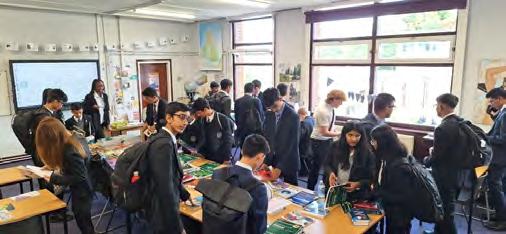
‘ReLOVE our stuff’ second-hand textbook and revision guide sale
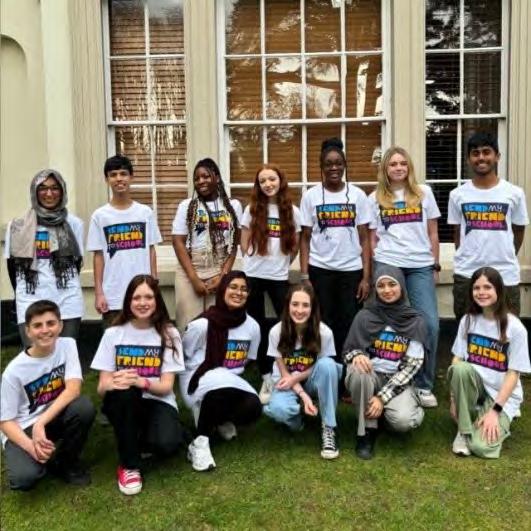
The Send My Friend Campaign is a wonderful opportunity for students to become active global citizens. It allows them to develop skills including teamwork, leadership, communication and critical thinking skills. Congratulations to Year 9 student, Hassan Namwar, and Year 10 student Om Kuravinakop who have been successful in their applications this year. The organisers praised the students’ application which highlighted their enthusiasm, passion for campaigning and dedication to global education.
The St Olave’s Environmental Society has boasted a series of outstanding successes over the past number of years. The efforts of the motivated and enthusiastic members of our “Eco Committee”, which comprises over 70 students and staff, have enabled us to renew the prestigious Eco-Schools Green Flag Award with Distinction for three consecutive years – an achievement that we are very proud of.
Environmental Society was founded in 2016, due to the rejuvenation of the desire to take care of the school’s local environment. Over the years, very many students have contributed to evoking positive change on the environmental front at St Olave’s. Recent developments include the installation of EV chargers on the school site, being awarded the Gold TFL Stars accreditation, incorporating regular second-hand sales into the school calendar and the introduction of printer ink cartridge, battery and stationery recycling.
Environmental Society is known for its important role in waste management at school. Since 2021, a network of Year 7 and 8 “Eco Warriors” has formed the backbone of the school’s dry mixed recycling collections. The recycling capacity has also expanded to cover batteries (through Duracell’s Big Battery Hunt), stationery (in partnership with Ryman’s Orpington) and printer ink cartridges. Moreover, the DT department installed a plastic recycling machine, adding yet another recycling facility to our arsenal. In order to further reduce waste, Environmental Society has worked closely with the Premises Team to reduce energy wastage – the school has already installed over 200 new LED outlets and is working to replace its boiler in the future, saving vast amounts of both energy and money in the long term.
This year, one of our EcoSchools foci was transport. Our work on the transport topic was based upon the TFL Stars framework, in the pursuit of the TFL Stars active travel award. Environmental Society planned an Active Travel Week, where students were encouraged to walk or take public transport to school. Members of Environmental Society also delivered year group assemblies about sustainable, safe and healthy travel and organised activities centred around road safety for students to take part in. According to a survey that we conducted, 81% of St Olave’s students travel to school via public transport or “active travel” (for example walking or cycling) - this is a very encouraging statistic. St Olave’s achieved the TFL Stars Gold Award (the highest honour) in recognition of our work.
Another key focus of Environmental Society this year was fundraising for a food composter on-site, which will enable the school to grow fresh produce for the school canteen whilst reducing the food miles. Regular “(Re)love our Stuff” sales (where we sold secondhand textbooks, clothing and reading books that would have otherwise been thrown away) enabled us to raise the money that we need. The food composter will be purchased and installed during the 2024 - 25 academic year and will be managed by Environmental Society, in conjunction with the Premises Team.
All this progress comes as a result of the tremendous amount of hard work, dedication, and time contributed
by so many people from across the school community, including students of all years, teaching and support staff, governors, and parents, to whom we all owe an immense debt of gratitude, but particularly Miss Benham, the staff Eco-Coordinator.
Looking to next year, Environmental Society is keen to build upon our success. We hope to contribute more to biodiversity on the school site, exploring options such as bat boxes, insect hotels, hedgehog highways, and even tree planting. In addition, we plan to organise litter picks in the community and continue expanding our recycling and waste reduction schemes at school.
Another event that we are keen to reignite passion for is the cross-Bromley Climate Conference, which was planned to take place in 2020, but was cancelled due to the pandemic. We plan to bring back this event, which will (hopefully) take place on the anniversary of Earth Day 2025. With this conference, and next year’s Green Flag renewal, on the horizon, it would be brilliant to see more students and staff get involved in our mission.
Year 12 Geographers braced themselves for the cold and drizzle to investigate the success of Croydon Councils rebranding plans for the Town Centre since the 2011 riots. Students visited six sites across the town centre and completed observations, an index of decay and environmental quality assessment, as well as piloting their questionnaires. With a little refining, they returned to the Town Centre later in the week to conduct their final questionnaire to a much larger sample size. Once primary data collection was complete, it was off to the classroom to begin the data presentation, analysis, conclusions and evaluations of the investigation, building valuable skills for the rest of their studies.
Eythan Soysa and Rory Gee, Year 13
Environmental Society Co-Presidents
“if we refuse to reuse, it’s the earth we abuse”

Eynsford
Students enjoyed a 12km walk around Eynsford and the surrounding area, visiting a range of different settlements and two different churches for the joint Geography and RS fieldtrip. They were on good form, with Monday’s groups coming back with their Vitamin D topped up, and Tuesday’s group came back with squelchy socks and cheery attitudes!


Eleven Year 12 students and eight Year 13 students enjoyed a day out at the 2023 Hazards Conference for A Level Geographers. They heard a range of talks from Dr Martin Degg about the 2023 Gaziantep earthquake, Professor Fiona Tweed about volcanic risks on the mid-Atlantic ridge and David Redfern about what turns a hazard into a disaster. The conference was very valuable for the students and gave them a chance to hear from university level professionals, especially valuable for those applying or considering applying for Geography at university.
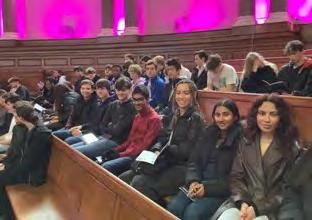
Year 12 Geographers visited Seaford to complete their coastal management fieldwork which included beach profiles, groyne drop measurements and a healthy dose of fresh air, wind and drizzle.

We celebrated Earth Day with an assembly from Environmental Society, followed by a range of activities during the week. Events included a Bake Sale, assemblies, quizzes and presentations. Thank you to all the students for putting the activities together and to Miss Benham for her ongoing support.
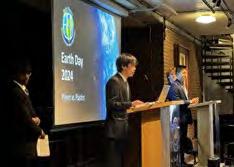
Our student submissions for the Westminster exhibition Climate Justice Competition were brilliant with entries from: Bavithran and Hafid (Year 7); Gabriel and Ayaan (Year 8); Om and Shohan (Year 10); Aishwarya (Year 12).

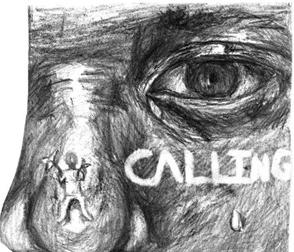
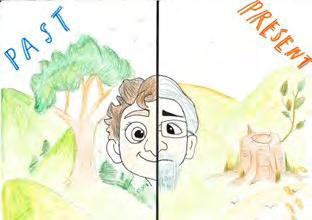
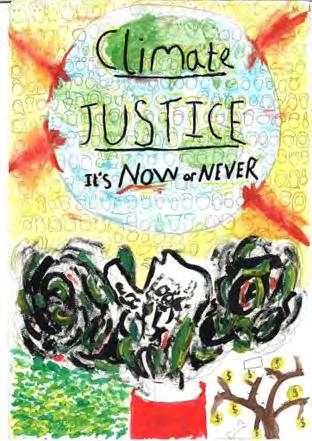


In July 2024, Year 12 Geography and History students embarked on a five-day trip to Iceland, courtesy of “Discover the World Education” and Miss Benham’s meticulous planning. Throughout Activity Week 2, we were gifted the golden opportunity to walk across glaciers, swim in secret lagoons, and witness the breathtaking waterfalls, all while learning about Iceland’s adaptation to the vast tectonic activity under it.
After a 3-hour flight to Keflavik International Airport, we embraced the exceptionally fresh air and headed to the Reykjanes peninsula, where we took pictures at the “Bridge between Continents”. At first glance, the small footbridge adorned with love padlocks might seem out of place, but it serves as the symbol of connection between Europe and North America and their associated tectonic plates. Beneath it lies the Mid-Atlantic Ridge, part of a vast underwater mountain range formed by the divergent movement of the Eurasian and North American plates. These slowly pull apart from each other by ~2cm a year, allowing magma from the Earth’s mantle to rise from the reduction in pressure by the stretching of the Earth’s lithosphere. This cools and solidifies, not only pushing older crust away from the ridge but also generating new crust in the gap, also known as Seafloor Spreading.
The Bridge between continents also symbolises the evidence for Continental Drift Theory, first proposed by Alfred Wegener in the 1900s. This suggested that the Earth’s continents had been joined together in a Pangaea (Supercontinent) and have since drifted apart, constantly reshaping the surface of the earth. Witnessing this fundamental part of modern geology was therefore compelling and let us expand our geographical understanding of plate tectonics.
Day 2 began by visiting a geothermal centre, one of the many ways Iceland has adapted to plate tectonics. A cheap, reliable, and sustainable source, geothermal energy is responsible for 26% of the country’s electricity, as well as 90% of Iceland’s space heating. This multi-faceted harnessing of the earth’s heat therefore proves vital for Iceland’s economic development and environmental sustainability. Moreover, we got to try Rúgbrauð, an Icelandic rye bread traditionally baked by burying it near a geyser (more on that later).
We also had the privilege of walking on Sólheimajökull – a large glacier between the volcanoes Katla and Eyjafjallajökull, the latter of which had erupted in 2010.
These are large masses of ice formed through the accumulation, compaction, and recrystallisation of snow over time. Specifically, for Sólheimajökull, the glacier appears to have a black coating, due to the layers of ash from volcano eruptions that embed itself in the ice.



Walking along such glacier was fulfilling in many ways, being able to wield ice pickaxes, seemingly climb up vertically through special crampons, and being able to drink the glacial water. In the words of Oleg, 13P, winner of the KS5 Geography selfie competition, the glacial water was: “The best water I’ve ever had, so unbelievably pure and fresh” - a sentiment I resonate with completely.


This eventful day concluded with a visit to Reynishverfi – a beautiful beach featuring black sand and basalt sea stack. Seemingly enchanting our companion Ewan the second he set foot on the beach, black sand is derived from finely ground volcanic rock (usually basalt) from rapidly cooling lava.
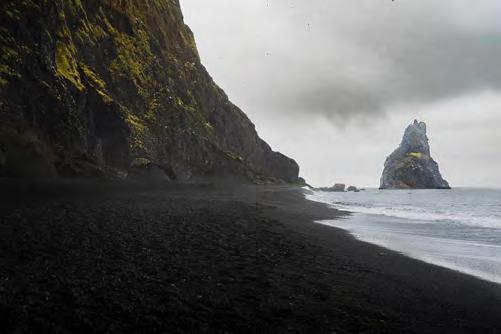
Erosion through hydraulic action and abrasion of ocean’s powerful waves, and the lava’s rapid cooling, grinds the rock into a fine black sand, complimented by the towering hexagonal columns of basalt. This was formed through a process of columnar jointing, which is when the rapid cooling of lava in the Atlantic Ocean causes it to fracture in a unique way, in this case hexagonal columns.


Day 3 was focused on a ferry trip to the Westman Islands, eminent for the presence of Puffins, its position as the southern-most part of Iceland, and its breath-taking landscape. This was something that became apparent while we were walking up Mt Eldfell (Hill of Fire in Icelandic) – the active volcano that forced mass evacuation and rebuilding of Heimaey Island in 1973. However, its summit and legacy attracted many tourists like us to marvel at the panoramic view of the Ocean, the island, the shores, and other mountains, prompting many of us to take videos and selfies alike – including one of the winners of the Geography Selfie Competition.
It was also here where our tour guide introduced us to the Westman Island Activity of “Sprangan” –cliff swinging with a rope. He explained its cultural significance as a way for sailors to gather bird eggs, and a form of entertainment by fishermen. Today it is enjoyed recreationally and is sometimes a competitive sport on the islands, and our tour guide invited us as such to try it. Although not all of us decided to have a go, some were successful, some were not able to stay on the rope for long, and others, including myself gave a valiant effort.
As a reward for participating in “Sprangan”, we spent the remainder of the day enjoying the nearby waterparkfitted with floaties, hot tubs, saunas, and slides. Activities included naval battles across the 3.6m deep pool using boat cars, floating platforms and foam balls, attempting to outlast others in the sauna, submerging oneself into cold water and dipping into the hot tubs, or accidentally breaking the slide by virtue of exceeding the weight limit (Tayo is still in denial about this to this day).
Day 4 commenced with another water-based activity, this time the “Secret Lagoon”. Known locally as “Gamla Laugin”, it is the oldest swimming pool in Iceland, dating back to 1891. Moreover, it’s uniqueness is also typified by the rich smell of sulphur, and the exclusive use of warm water from nearby hot springs. These are natural pools of water heated by geothermal energy from the earth’s mantle, which provides 100% of the water supply to the lagoon. Consequently, guests can engross themselves into clean, natural, and fresh water constantly between 38-40 degrees Celsius year long.
Leading on from the theme of hot water, we witnessed “The Great Geysir” and “Strokkur”, spouting hot springs that periodically erupt. This happens when water seeps into the ground, getting heated by hot rocks or magma chambers. This water turns into steam as it heats up, creating pressure in the confined underground space, and when the pressure exceeds the strength of the surrounding rock, a burst of steam and water occurs. In our case, the main geysers erupted every few minutes, allowing us to get many videos from different angles, and marvel at the at times 20m high jets.
Finally, our Iceland adventure was complemented by visiting various waterfalls across Iceland, Seljalandsfoss, Skogadfoss and Gullfoss to name a few. In the context of Iceland, it involves glacial meltwater flowing down the landscape that carves out valleys and creates rivers. A waterfall could be created as the water passes through rocks of different erosional resistance. Hydraulic action and abrasion subsequently erode the underlying rocks but at different rates, where the less resistant rock erodes faster to create a drop. This will start creating a plunge pool at the bottom of the pool, where water and rock particles erode the soft rock underneath.

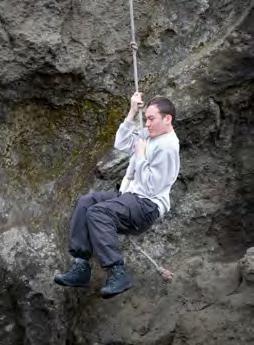

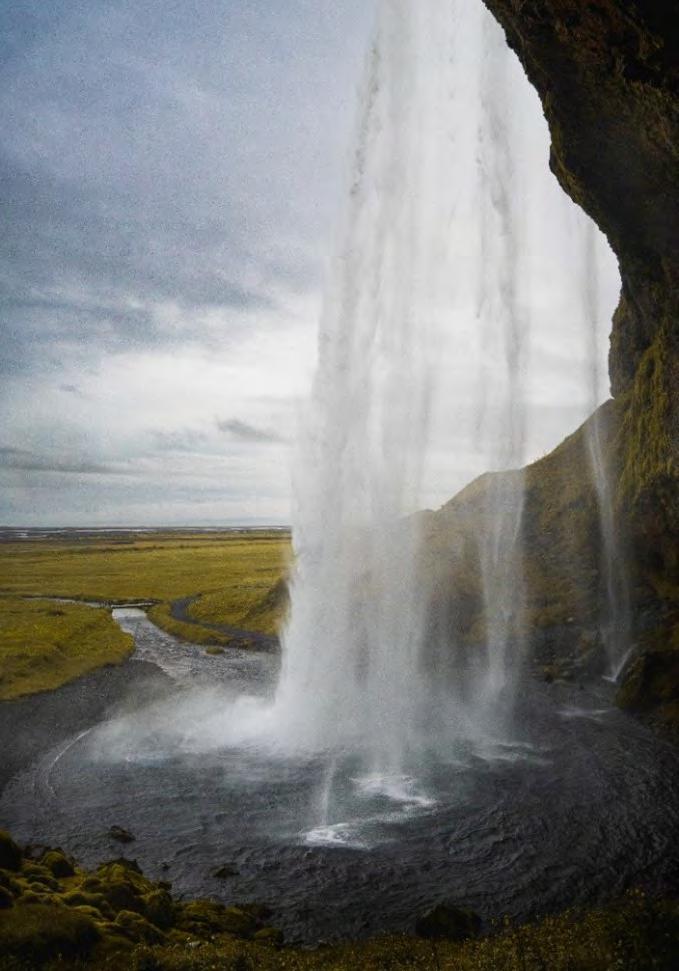
Meanwhile, undercutting above the plunge pool commences, making the harder rock overhang and releasing debris to swirl around in the pool for faster erosion. Finally, when hard rock cannot support is own weight, it will eventually collapse. In many companions’ eyes, waterfalls were the most breath-taking form of mother nature, partly owing to the sheer sizes, the surrounding landscape complementing the beauty of the waterfall, or, in the case of Seljalandsfoss, a new perspective where you can walk behind the waterfall.
Day 5 had only featured the return to England but allowed us to reflect on the incredible memories we made, the people we had fun with, and the breath-taking beauty of Iceland. Each activity not only heightened our geographical understanding of mother nature but also left us with unforgettable moments that will resonate with us long after our journey.
I would like to thank the Geography Department, particularly Miss Benham and honorary geographer Miss Scholefield, our tour guide representing Discover the World Education, and those who attended the trip, in making the Iceland trip a truly golden experience.
David Wu, Year 13
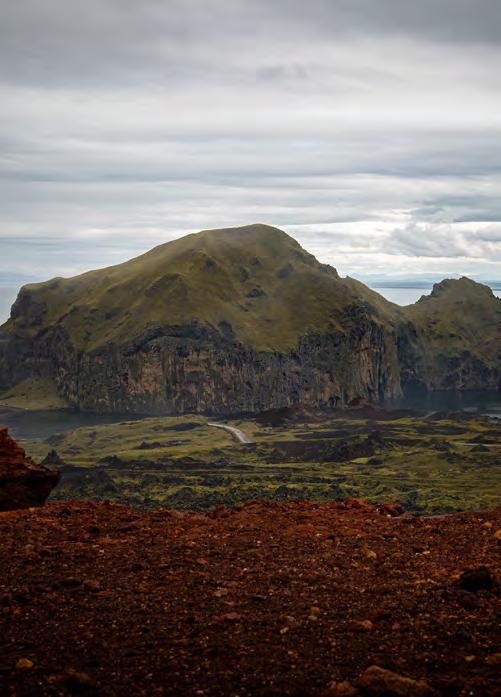


Shoes, so many shoes! remains my reaction whenever I enter the Vindolanda Museum at Hadrian’s Wall, one of the finest in England. The conditions around the Wall have been ideal for the unlikely preservation of natural artefacts such as leather, cloth and wood from two thousand years ago. The museum is packed with shoes, some military tents and writing tablets. The Vindolanda Tablets are what have given the Wall, UNESCO World Heritage Status. These tablets were originally covered with wax for writing upon and although the wax has decomposed, the impressions of letters remain upon the wooden frame. They have revealed, through a teamwork of scientific analysis and linguistic and historical knowledge, the everyday life of soldiers and their families upon the Wall. The most famous letter (which you can see in the British Museum) is a birthday party invitation from Claudia Severa to Sulpicia Lepidina. There is a change in handwriting where Claudia Severa herself has added a postscript to the main invitation: “vale soror anima mea ita valeam carissima et have.” (“Farewell sister my soul, as I might prosper dearest and greetings.”). This is, we believe, the earliest example of a lady’s handwriting in Latin. It is far less neat than that of her amanuensis who wrote the main section as she is trying to fit it in the corner. The question for me is who wrote the main text? A slave presumably. A man or a woman? British or from further afield? Claudia Sulpicia was an important lady at Vindolanda, her husband’s name appears on a separate inscription and a popular (albeit lacking in evidence) belief is that a beautiful pair of leather slippers with an elegant pattern of hobnails for grip in the museum were hers.
It is for experiences like this that we take Year 10 annually to Hadrian’s Wall and it was a pleasure this year for the first time to march out from the Sill Youth Hostel and onto the Wall path. We were also very privileged to receive an impromptu talk by Dr Andrew Birley, Head of Excavations of the Vindolanda Trust, about their new dig at Magnis Roman Fort – who knows what lies in a fort larger than Vindolanda? Thank you Miss Lands, Mr Whiteside and Mrs Cockshott for accompanying us and Mrs Ruben for making it possible and we look forward to our return in 2025.
We continue to teach Latin all through the school from Year 7 to A Level with Classical Civilisation in the Sixth Form too. The main focus of prescribed texts at GCSE and A Level is from the late 1st Century AD all focusing upon Claudius and Nero with Tacitus’ Annals and Juvenal’s poetry; unsurprisingly Virgil’s Aeneid (Book
VI and VIII) remain on the syllabus for GCSE. We also now have a thematic topic at GCSE, Romans and the Countryside, so once again our trip to Northumbria is very suitable. Thank you also to Dr Abbattista and Mrs Probodziak for their inspirational teaching of Latin and Classical Civilisation throughout the school, especially for Dr Abbattista for her help in training the Classics teachers of the future; this year our PGCE trainee was Mr Durcan. Alessandra Rocchetti (Wolfson College, Oxford) gave an insightful lecture about Roman curse tablets to Years 9-13 in April raising many questions about superstition in the ancient world. Finally, I would like to celebrate Gabriel Doyle who won the Cambridge Classical Association Intermediate Latin Prose Reading Competition (online submission) with his rendering of part of Caesar’s Gallic Wars.
Alexander Carroll S___Head of Classics
Gabriel Doyle, Noah Margolies and Ademiyo Olaiya (Year 10) entered the inter-school Cambridge Classical Association Latin Reading Competition. They recorded themselves reading a particularly exciting piece of Caesar’s ‘Civil Wars’. We were thrilled to learn that Gabriel’s rendition attained 1st place.
Bignor Roman Villa
The Classics Department took Year 8 to Bignor Roman
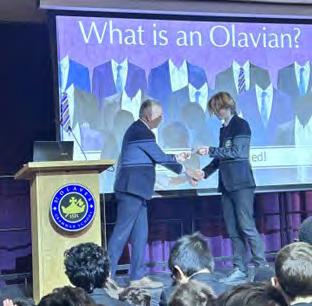
Villa during Activity Week 1. The sun shone during a glorious day of mosaic drawing, map reading and historical investigation looking at the best preserved and finest mosaics still in situ from Roman Britain set in the rolling Sussex countryside.
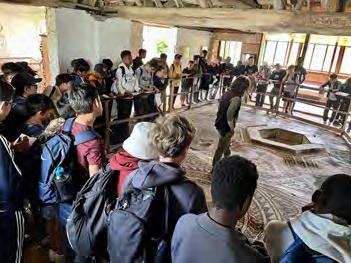
Students of Latin and Classical Civilisation were treated to a talk on Roman curse tablets by Alessandra Rocchetti (Wolfson College, Oxford). She discussed the nature and contexts of magical artefacts, by showing archaeological evidence from different Roman sites and the crossover between magic and religion in a practice that was extensively used among the Romans. This topic offered the students an opportunity to reflect on various aspects of their curriculum, such as witchcraft, literary curses, Roman Baths and superstition. Questions from Olavians were of a very high standard in Alessandra’s view and included comments about whether there were professional curse writers and if they were liable to punishment if the curse did not work!
A Level Latin and Classical Civilisation students attended an online lecture given by Professor Richard Alston (Royal Holloway, University of London) about ‘Love & Marriage in the Ancient World’. His talk was challenging and eye opening about the stark differences between the nature of Roman and modern marriage. Pranavi Devaraj asked whether Juvenal’s poetry could be taken as the everyday point of view in the 1st Century - no it is an extreme exaggerated case; Laila El Gazar asked whether location played any role in marriage practices - no, it is likely that villages and towns had the same views as Rome.
During July 2024, we were fortunate enough to have the chance to go on a week-long residential trip to Northumberland, in order to visit Hadrian’s Wall, among several other Roman settlements, and generally learn more about what Roman Britain was like.
Going into the trip there were some low expectations. Staying within England seemed far less exciting compared to the other language trips and the six-hour coach journey felt to me at the time like a premonition of things to come. As city faded into countryside, mobile data became inaccessible and the temperature seemed to drop by 20 degrees (or maybe that was the coach air conditioning), so my spirits fell further. When we arrived at the accommodation, I was pleasantly surprised with the room we were given; comfortable beds, charging ports, a clean toilet and shower all to ourselves. Another thing that surprised me was the opportunity the trip offered to socialise with friends we only knew in the classroom, playing football, a few videogames, board games and chatting.
We went to the Roman Army Museum and Vindolanda. The museum offered an immersive glimpse into the life of Roman soldiers stationed at the edge of the empire. It contained interactive displays including a captivating 3D film, through which we learned what it meant to be a Roman soldier. Vindolanda was one of the highlights of the trip. As one of the best-preserved Roman sites in Britain, it offered a fascinating glimpse into life on the Roman frontier. Walking through ancient ruins made you really feel like part of Roman history, with artifacts like the Vindolanda tablets, which reveal personal stories from Roman times, making the experience truly immersive.
Wednesday was the wall walk (delayed from Tuesday due to rain and fog). The route began right outside the youth hostel with a short climb up to the top of the ridge. We trekked alongside the remnants of the stone wall for approximately one-and-a-half hours. During the timespan, we made our way up several small hills and down along dips in the land. In several sections, there were steep stone steps that warranted careful footsteps – luckily, everyone was suitably cautious and there were no casualties! We also enjoyed gorgeous views of English farmland, including a particularly beautiful lake we walked along, on top of a high ridge, surrounded by trees on either side.
The coach then ferried us to Durham; there we visited the cathedral where scenes from famous movies like Harry Potter have been filmed. It seemed to tower above us as we approached it, with the intricate stonework, and stunning stained-glass windows leaving a lasting impression. We even received time to explore the historic
city by ourselves, a welcome break after so much time indoors. After our visit to the Cathedral, we were taken to the university where we took part in an archaeology workshop. It was an amazing experience to feel two-thousand-year-old artefacts and learn the history behind each one.
On Thursday, we enjoyed one of the most relaxed days of the trip, with a day spent exploring Tynemouth. After our standard morning routine, we left the hostel in a coach, bound for Tynemouth. We stopped off along the way, at a Mithraic temple, which was especially interesting. Mithraism is an ancient religion which spread throughout the Roman empire. It focused on worship of a god, often depicted as slaughtering a bull. Although it was very popular during the 1st to 4th Centuries A.D. Mithraism entirely died out, and so a lot of mystery remains around this religion. That said, we do know that there were seven different levels of initiation into Mithraism, with entry into the next level dependent upon a test of some sort. As the temple foundation and parts of the walls were still intact, we could gain a reasonable idea of what it would have looked like in its heyday.
After this enlightening detour, we spent the rest of the day exploring parts of Tynemouth. I enjoyed playing a slightly rushed game of mini golf with Henry Etherington and Noah Wilkins, before the whole group moved onto exploring Tynemouth Priory and Castle, a Medieval abbey which was repurposed as a gun battery and barracks during the 19th and 20th Centuries. We then spent the afternoon relaxing on the beach, with paddling, football and beach volleyball (sans net!).
On Friday morning, we left shortly after breakfast for home, with a brief stop to stretch our legs and see the Angel of the North statue, which was particularly imposing in person! Overall, I really enjoyed the Hadrian’s Wall trip and would recommend it to other students!
Alex Chuang and Noah Margolies, Year 10
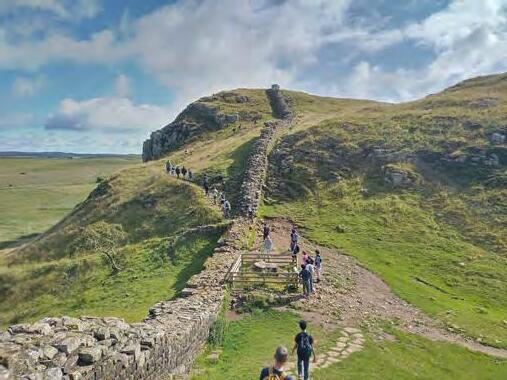

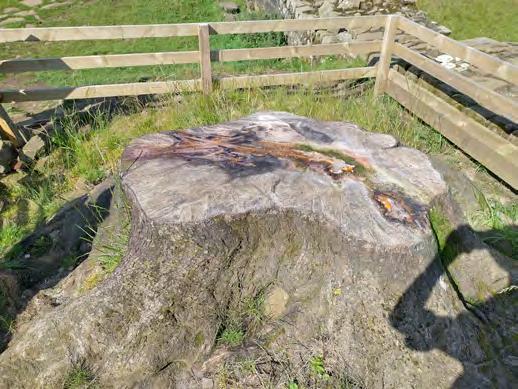


We hold these truths to be self-evident, that all men are created equal
And when I meet Thomas Jefferson
I’m ‘a compel him to include women in the sequel
(Hamilton, the musical)
For all the ills and imperfections of US society, it would be churlish not to admit that it is founded on a statement of glorious clarity and powerful morality. While we might agree with Hamilton’s update of Thomas Jefferson’s famous declaration, we would not deny the broader principle that for a nation to found itself on a declaration of equality is both right and supremely logical. After all, it surely is self-evidently wrong that one person is somehow born ‘better’ than another, or that a person is ‘worth’ more than someone else by virtue of wealth, race, or nobility.
So self-evident is this truth that at almost exactly the same time as Jefferson was penning the US Declaration of Independence, 18th Century philosopher Immanuel Kant had hit upon the idea that an entire system of ethics could be based upon it. As Year 12 discover in the Ethics section of their A Level course, Kant argued that it was possible to construct an ethic that would rely on nothing but logic, all constructed on the firm foundation of human equality.
Kant argued that there existed a Categorical Imperative, a self-evidently true ethical law, which logic dictated we must follow. He formulated this imperative in three ways, but the first of these formulations will suffice to explain the principle. In the First Formulation of the Categorial Imperative, he asked us to see ourselves as people who are making moral rules, or ‘maxims’, each time we act. If, for example, I steal somebody’s sweeties, I am making a maxim that it is OK for me to steal people’s sweeties. However, if everybody is equal, I ought to universalise that maxim: I need to be able to say that it is OK for everybody to steal sweeties, since if I say the rule applies to me but not to anybody else I would be demanding preferential treatment over others. If we are all equal, this is illogical. And yet it is impossible to universalise the maxim: if I can steal from you and you can steal from me, there is nothing to be gained from stealing. The very principle on which stealing relies, the concept of ownership, would be undermined if everybody were
allowed to steal. By logic alone we have arrived at the conclusion that stealing is wrong.
Kant was brilliant, incisive, and wrong on the most basic level. There is nothing logically self-evident about the fundamental equality of humankind. Indeed, as Tom Holland points out in Dominion, the ancient world had always thought the precise opposite. Again on the Year 12 course, we see that Aristotle argued that there certainly was a natural order to things which could be seen around the world. “The same fire burns both here and in Persia”, he said, and the very same natural laws which made fire burn were also those which caused the ordering of society to look very much the same in all ‘civilised’ nations. But in Aristotle’s view, it was the natural order of things for those who were best fitted to ruling to teeter atop the pyramid of society and for those whose faculties were more animalistic to be its broad base. In fact it was doubtful, he argued, that slaves had any real rational faculties at all. The downtrodden masses were destined by nature to remain the downtrodden masses and all rational men could see it.
The bestial cruelty of the ancient world was built on this way of thinking. If a master wanted to crucify his slave, it was not only entirely acceptable but also cheap: the fee earned by each member of the crucifixion team equated to the price of a glass of wine in a bar. If Roman Citizens wanted to watch foreign captives being forced to fight to the death, that was their right as civilised people born with greater entitlement. If King Herod wanted to ensure that no other king would arise in Israel, nothing prevented him from ordering that every child in Bethlehem below the age of two should be slaughtered.
In Religious Studies, we study the voices which have turned the tide of human history. Prophets, martyrs and saddhus, who have cried out in the wilderness with calls of beauty and justice. Religious Studies is the archive of voices that have repeated the call to humanity to be better than it has been in the past.
Year 7 learn that Islam declares that when God spoke to the Prophet Muhammad in the cave on Mount Jira, he chose to speak not to a leader of Makkah but to an orphan. Muhammad was not a man of great wealth or power and was one who had lost both parents by the age of six. No surprise then that the Qur’an describes those favoured by God as those who ‘give food to the poor, the orphan and the captive’, or that Muhammad famously said that ‘before God, all are as equal as the teeth of a
comb’, or that ‘no man is a believer who fills his stomach while his neighbour is hungry’.
In Key Stage 3, we learn also that Christianity tells the story of the birth in a feeding trough of the King of all creation. You may know that the traditional tale of ‘no room at the inn’ glosses over a more likely truth. The Gospel phrase ‘no guest room available’ much more probably refers to there being no guest room available in Joseph’s parents’ house when Joseph and his very pregnant bride-to-be came knocking. No room, we may assume, because of the disgraceful fact that Mary was pregnant by someone other than Joseph. And so the King of all creation is born rejected by his own family.
We hold Jefferson’s truths to be self-evident not because they really are self-evident, but because we are so soaked in thousands of years of religious history that we have forgotten their origins. They are not self-evident; they are the beautiful legacy of men and women who have felt themselves to be the carriers of the messages of the creator.
Of course, there is a counter-argument. Year 13 encounter the well-crafted and engagingly presented arguments of Richard Dawkins, who argues among other things that religion has promoted slavery and that enlightenment thinking explains our more recent moral advances (Dawkins crops up from time to time in other year groups, but this particular argument is examined in Year 13). After all, ‘slaves, obey your masters’, wrote St Paul in his letter to the Ephesians. We might wish he had written, ‘slaves, rise up against your masters’, or ‘slaves, flee from your masters’, but is either of those a realistic prospect for a slave in the ancient world? No, masters held all the cards and only a change of heart on their part could ever bring slavery to an end. This may explain why Paul’s instruction to slave-owners in his very next sentence was a little more forthright: ‘masters, do not threaten your slaves’. We who are so far removed from his time and place miss the significance of this entirely, since how is it possible to keep slaves without threatening them? Without the threat of death for leaving, a slave is free to go. Without the threat of punishment for not working, a slave must be given some positive incentive to work – a wage perhaps?
The tiny book of Philemon gives us a snapshot of what Paul had in mind. Philemon is a slave-owner, the intended recipient of the letter, and a man who has become a Christian through meeting Paul. He is also the owner of Onesimus, a runaway slave whom by good fortune Paul has met in prison. Paul instructs Onesimus to return to his owner. This ought to mean death for Onesimus, but Paul sends him back to Philemon with a letter, in which he writes that he is sending Onesimus back to him ‘that you might have him back forever – no
longer as a slave, but better than a slave, as a dear brother’. Paul ends his letter with what sounds just a little like a threat of his own, ‘prepare a guest room for me,’ because he plans to visit, perhaps to see whether his instructions have been carried out!
Human history is messy and turbulent. It would be wrong to say that all it took was for Jesus to tell people to love their neighbours for humanity to come to its senses. Indeed slavery itself continues to this day even in the UK, in the dark and hidden corners of society. As Martin Luther King said, “the arc of the moral universe is long, but it bends towards justice”. His famous ‘mountaintop speech’ appears towards the end of the Religious Studies Short Course GCSE, a speech he gave on the very last full day of his life. In it, in the soaring tones of a deepsouth preacher, he confesses on the one hand a lack of certainty about his own survival, while on the other a deep certainty in the eventual triumph of justice. So one last voice in the wilderness for this year’s RS Department report:
Well, I don’t know what will happen now. We’ve got some difficult days ahead. But it really doesn’t matter with me now, because I’ve been to the mountaintop.
And I don’t mind. Like anybody, I would like to live a long life; longevity has its place. But I’m not concerned about that now. I just want to do God’s will.
And He’s allowed me to go up to the mountain. And I’ve looked over. And I’ve seen the Promised Land. I may not get there with you. But I want you to know tonight, that we, as a people, will get to the Promised Land.
So I’m happy, tonight. I’m not worried about anything. I’m not fearing any man. Mine eyes have seen the glory of the coming of the Lord.
(Martin Luther King, 3rd April, 1968)
Andrew Lake
S__Head of Religious Studies
The Great Hall was packed with people attending the Diwali celebration who were treated to a sparkling and memorable evening. As well as the fundraising aspect, celebrating this important Hindu and Sikh festival helps to build the community at St Olave’s by enabling everyone to socialise together. People from all different cultures attend the evening and join in the dancing. Everything from registration, drinks, hall decoration, cultural programme and catering, was excellent. The success of this event would not have been possible without the support of the PA, the organising team, performers and other volunteers to whom we would like to express a huge thank you.
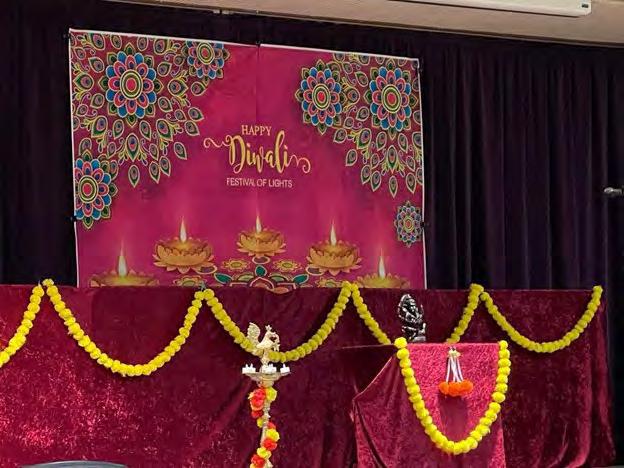


Olave’s economists had another successful year in 2023-2024, with some great exam results for Year 13. Many students have gone on to study Economics or related subjects at university, including at Oxbridge and LSE. The department continues to thrive, with consistent uptake in Year 12 keeping the subject as the largest outside Maths and Science. The department welcomed Mike McCartney as a part time member of staff in 2023. Mike comes with a wealth of experience across a variety of schools, and when not in school can usually be found pounding the streets (at home and abroad) as an excellent runner.
Students have entered essay competitions ranging from the Royal Economics Society’s Young Economist of the Year, to the John Locke Institute, in which several students were shortlisted for prizes. Year 13s have, in particular, been given more tasks to engage with wider scholarship and writing: an example of a summer book review is included here. Political Economy Society continues to thrive, with student led talks on topics as diverse as the economics of the Dr Seuss book The Lorax, to more standard fare of economic reforms in Argentina or the economics of war and conflict. After journalist David Smith’s visit in October last year, we were delighted to welcome ex-Bank of England economist, writer and commentator. He gave an interesting talk around “Price Gouging” and the economics and ethics of dynamic pricing, followed by a Q&A which he answered “extremely impressive” questions from the Olavian students. And The Olavian Economist, the studentedited publication of the department, was published, with a theme of International Economics.

Year 10 students, Aayush, Eythan and Hugo, were invited to attend Prime Minister’s Questions by Gareth Bacon, Conservative MP for Orpington and David Evans, General Secretary of the Labour Party and Old Olavian, in recognition of their immense work organising Political Awareness Week. In the afternoon Aayush, Eythan and Hugo visited the Labour Party HQ and learnt about the inner workings of their policy making and strategies followed by a meeting with Sir Keir Starmer.
Andrew Lay S___Head of Economics
Sessions at Politics and Philosophy Society vary hugely by subject matter each week. This session started with a rapid-fire debate round, discussing some topical political issues, as well as some traditional philosophy. The quiz was followed by a talk about Plato’s theory of perfect forms and their practical applications - a topic that fascinated newer members, and strengthened the knowledge of those who had covered the theory in RS. The meeting finished with questions, and a short discussion on the controversies related to the theory.
Well done to the contributors and editors of the first Junior Politics Journal, which was edited by Aayush Kampani, with support from Mr Wearn and the History Department. The journal contains a range of articles from ‘The Vietnam War’ to ‘How Does The Media Influence Politics?’ It also includes interviews with Gareth Bacon MP and David Evans, General Secretary of the Labour Party.
St Olave’s was delighted to host Mr Smith, The Sunday Times’ Economics Editor and renowned Economist, who gave an excellent talk about the state of the British Economy. The School was also pleased to be able to extend the invitation to neighbouring Newstead Wood School. Economics pupils from both schools were enlightened by the presentation which was followed by numerous inquisitive questions and two lucky students went home with a copy of David Smith’s book, ‘Free Lunch’.
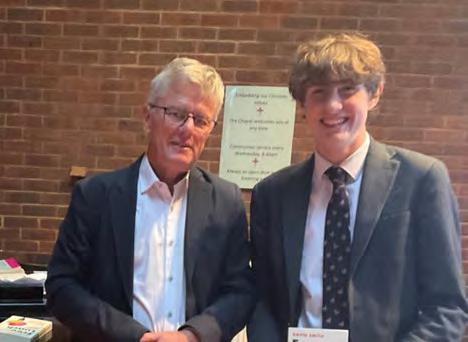
8 Year 13 students had a spirited debate over the motion ‘This house would ban gambling’ in the British Parliamentary format. Our debaters tackled many issues, including the best way to help addicts and prevent initial addiction, the social ramifications of different gambling spheres, and the method of imposing such a ban. The session was a great learning opportunity for all involved, and reminded even our most senior debaters of the significance of properly defining a motion. Well done to all our speakers, and congratulations to the winning team Saahil (a first-time debater) and Ben.

We are proud to offer a wide variety of co-curricular Clubs and Societies, which are available for students to build on existing talents whilst developing new skills and interest. At Law Society, Year 12 students Trijagati and Susanah gave a talk on International Law, with a discussion about how effective it is and how far it can be counted as ‘law’ if it cannot be enforced. Students also discussed inequality of power amongst States making International Law imbalanced and unfair.
The Sixth Form had an extended assembly delivered by Luke from the Politics Project. This is an initiative supported by the Greater London Authority with the aim of boosting the number of students who take part in elections. Students heard about issues that affect them, such as housing and the environment and also about how the 18-24 age bracket is least represented in terms of voter turnout. Students were then given the chance to register as voters. 2024 was an important year for political representation so it was a timely and relevant assembly for the next generation of voters.
The school held its own Mock General Election. Following on from their speeches in assembly, the candidates participated in a hustings. The debate proved hugely popular with staff and students alike, garnering a packed audience of more than 60 people. In a charged and competitive atmosphere, the candidates butted heads on topics ranging from nuclear energy to immigration and healthcare, demonstrating political nous beyond their years.
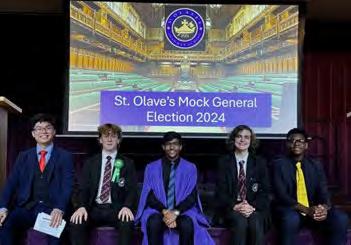
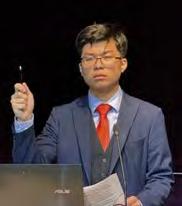
450 votes were cast over two days, with Labour claiming a triumphant 50% of the vote, while the Greens took another 23%, and the remainder split evenly between the Conservatives and Lib Dems. Asked for comment, victorious candidate Chris Choi declared “The Olavian population has voted for effective change in the form of the Labour Party - we’ve taken this victory not because it has been handed to us but because we fought tooth and nail, and I am proud to have been the representative of this fighting party.” Many congratulations to all those involved!
Book Review of ‘The Art of Strategy’, by Avinash K. Dixit and Barry J. Nalebuff Game theory is perhaps one of the most well-known areas of economic study in the modern era, inspiring Nobel Prize winning research, military and nuclear strategy, and more recently the personal statements of generations of aspiring university economists. This diversity of usages both highlights and is a result of the versatility of the field; game theory is an economic concept, but one with applications for a plethora of other subjects, and essentially for all human interactions.
Dixit and Nalebuff’s ‘The Art of Strategy’ promises to draw on this universality in providing “a game theorist’s guide to success in business and life” – an umbrella description almost suggestive of a self-help book rather than an economic treatise called “ingenious” by Nobel Prize winner Thomas Schelling. While the book delivers faithfully as an economic exposition, it is in the former aspect as a guide to life where it defects on its promise (Prisoner’s dilemma reference intended). Though definitely an effective guide to success in game theoretic situations, and alongside that a comprehensive summary of the terminology and mechanisms of these games, the extent to which these games are applied to business and life can be somewhat tenuous. This may be less a deficiency on the writers’ part than a function of the fact that the book’s central topic ultimately remains a theory, which cannot reasonably be expected to provide an exact framework for each of the myriad examples outlined throughout. However, case studies such as the strategic move of your night self setting an alarm in the sequential game of waking up your morning self can seem both forced and unrealistic – the explanation of this strategy’s success being undermined by the obvious caveat that many people sleep through their alarms, which the book seems to conveniently ignore. In the admirable pursuit of making game theory simple and understandable for the lay reader, the book thus loses out in places on the complexity which makes game theory such a widely heralded and applicable economic concept in the first place. This is however a necessary characteristic of any work seeking to summarise decades of academic research into a few hundred pages, and its relatability makes up for any detail lost, rendering it an engaging and informative read across the board.
One of the most striking aspects of this book is how intuitive its teachings are. Through its analysis of everyday games and real life case studies, it becomes clear that game theory permeates decision making across society, albeit without the decision makers having formalised the thinking behind it. The von NeummanMorgenstern ‘minimax theorem’ discussed in relation to mixed strategies in penalty shootouts for example,
whereby the goalkeeper should look to minimise the maximum payoff for the penalty taker by mixing the direction in which they dive (and the reverse logic for the striker in mixing the direction of their shot), feels patently obvious – the maxim “never let them know your next move” coming to mind. It is the book’s exposition of the mathematical logic behind such seemingly simple mental conclusions, and development of that logic through calculation of optimal moves and mix ratios that makes it so fascinating, adding a new depth of reasoning to seemingly mundane scenarios. This same strength of the book is also counterintuitively a possible criticism –the depth to which this reasoning goes is often only of academic interest, with its practical value being limited by the confines of time, mental calculation capacity, and the assumption that other players are also operating with the same logic. It would be impractical for a penalty taker to calculate the exact ratio of kick directions he should employ as is proposed in the book, seeing as not only would it take an inordinate amount of time and data, but it would also be almost impossible for him to implement that optimal ratio in such a way that the strategy remains random and unpredictable. The idea of mixed strategy or Nash equilibria relies on all players in a game acting in a rational way that would maximise their utility, and the book does not make significant consideration of the relatively novel concepts of irrationality and behavioural economics, making it less applicable to the real world than the cover page would have you believe.
“The Art of Strategy” is a book of massive scope and interest, offering the reader the opportunity to explore their own mental heuristics in more depth, and being unique in the number and quality of case study discussions it provides for readers to implement their learnings. Though it falls prey to issues of practicality and oversimplification, these are issues which inherently confront game theory as a whole, and thus within the confines of the subject matter it is a highly comprehensive and entertaining insight into this vast and increasingly topical field.
Shaun Abraham, Year 13
Book Review of “The Korean Economic Developmental Path”, by Seok Choon Lew I had taken up the mantle reading this scholarly work upon recommendation from my South Korean Grandfather, who had (fortunately) lived through the Korean War and had witnessed his country’s economic development first hand. I felt obliged to investigate this modern success story, especially after I was informed of how destitute South Korea was – infrastructure and cities
were reduced to rubble, they had no natural resources to kickstart their economy, and many households lacked water and electricity. It was said that South Korea was poorer than their Northern Neighbours until as late as the 70s, who initially prospered post Korean War from helpful schemes and expertise from its communist allies, and their rich reserves in minerals. This was historically significant, as North Korea were making a clear case for itself to be the legitimate government of the peninsula, while South Korea’s economy had stagnated and initially failed to move past its agrarian economy, undermining their legitimacy.
Lew decides to take different styles of approaches in assessing Korea’s economic development, the two most obvious here is taking other economists’ ideas to critique or expand upon them.
The greatest example I remember was in chapter 1, where he discusses research in the 1990s (including the World Bank report in 1993) on why (East) Asian economies were the only ones to achieve high growth but simultaneously diminish inequality, which concluded with the vast macroeconomic management and economic policies tailored to those specific countries. To take South Korea as an example, they had an emphasis on education (supply side policies, increasing productivity, shifting LRAS, AS macroeconomics) since they lacked natural resources or infrastructure to kickstart their economy after the Korean war, and at the time could only rely on a strong labour force in the absence of capital and entrepreneurship. Lew here points out that other underdeveloped countries that use the same development strategies as Korea hadn’t found the same economic success, such as Brazil or the Philippines, and highlighted that cultural and social dimension of economic growth was ignored (more on that later). He elected to criticise the overgeneralisation of the “East Asian Models”, where he critiques the tendency of the World Bank and other scholars to lump all east Asian countries under a single model. He believes that each country was different in how they grew their economy and their use of state intervention, industrial policies, and strategies. For example, Japan and Korea had market-substitution strategies while Singapore pursued market complementing ones. I liked this perspective, since the literatures Lew had talked about incorrectly considered the region to be economically homogenous and followed similar paths, and many of these literatures had disagreed on how to group the countries together in terms of growth and how they achieved it hence their insights felt more disjointed and inconsistent.
Lew did discuss the importance of state intervention, although it wasn’t particularly the main point of the book, to further prove the existing literatures wrong. His most notable example of this, was the rationale behind of the state ignoring a country’s “comparative advantage”
(whereby a country that produces a good or service can do it at less cost than another country, so they can outcompete them). In the case of South Korea, it was able to specialise in textiles soon after the Korean war, but the government decided to invest into other newer and more advanced industries such as steel and alter electronics and shipbuilding. They justified that other countries with a technological advantage will eventually be able to outcompete South Korea anyway, and by hyper investing into lower skilled and less productive industries would result in not moving up the industrial value chain and result in a cycle of lower wages and less diversification. By adapting to the newer industries, they can potentially gain a comparative advantage there, which are perceived to be more valuable than say textiles. I thought this was a very smart idea, since staying on primary industries wouldn’t advance an economy forward quickly, and scrambling to new industries would decrease the technological advantages of other countries, since the door is more open to optimisation and efficiency.
Economics as a social science means there are infinitely many variables that contribute to an economy’s growth, but specifically in the first main bodies of the book, Lew taught me that vast macroeconomic management and policies cannot change an economy’s future alone (although an instrumental component), rather that this power to change is reliant on the society these policies are for. This brings us nicely to his main points across his written piece – the importance of Cultural and Social dynamics in an economy.
One of his compelling takes is when he brings up Max Weber’s analysis of the social effects of religious values in an economy. Weber suggests that value orientation in Protestantism contributed to diligent work ethic, which characterised modern Western Capitalism. Moreover, such spontaneous development of capitalism couldn’t be found elsewhere, as religious values imbuing economic motives for development were missing, using Confucianism (the main inspiration of Korean culture) as an example. Lew builds on Weber’s interpretation of Confucianism, claiming the significance of traditional values of Confucianism, specifically the norm of “filial piety” (Hyo in Korean) – love, honour, and respect for parents, elders, and ancestors. He assesses Confucianism as a whole, its difference to Christianity (i.e. abstract universal principles against divine will), and Hyo’s importance as a religious imperative. His comments and explanations here are rather very long winded and hard to articulate in a short sentence, but the idea of Hyo is emphasised through “ancestor worship”, ancestors’ seemingly eternal existence in descendants’ representation and remembrance of them, and how death is therefore transformed into immortal life. Paired with the “important events of life” such as coming-of age, marriage, funerals, ancestor memorials, Lew suggests
into economics. It lays the foundations of a “superior remembering and representing”, upon which the differentiation between families is their “wealth”. Therefore, there is economic competitiveness for better remembrance, encouraging families to work hard and succeed to honour those that came before them.
I found this to admittedly be a very complicated argument, delving into religions and way of life to discuss its role in South Korea’s economic development. He also develops similarly longer lines of argument on social harmony and collective responsibility (both central themes to Confucianism) too, but they follow the same points as the preceding paragraph. I did eventually agree with him here, as I thought that the drive to work hard and succeed must come from much more motivation than just trying to live a better life, but he never truly examined the true extent of Confucianism in South Korea (merely claiming that South Korean culture was “heavily influenced” by it) and so considered whether all workers and family businesses were on that same path.
This book has left me fulfilled with a wealth of economic knowledge about the cultural dimension of Korean development, the influence of Confucianism embedded into South Korean Society, and the differentiation between respective East Asian economic growth. I enjoyed his critiques and challenges of conventional assumption of “Strong State and Weak Society” as well as the (largely) vague and misinformed studies of economists and businesses, such as the World Bank Report in chapter 1. I would have liked to see more criticisms of South Korean’s economic development, however inspirational and miraculous it was – today South Korea has one of the lowest fertility rates in the world, with growing disparities between the untouchable Chaebols and the common worker in all ways of life –income, families, and free time, as well as the cut-throat educational system and the toxic work culture.
I believe that this book is worth a read, although at times it is quite theoretical and a challenge to grasp. This book is an excellent case study of economic growth, presenting us with the unique story of South Korea in modern history, but invites us to critically reflect on the enduring challenges that come with it.
David
Wu, Year 13
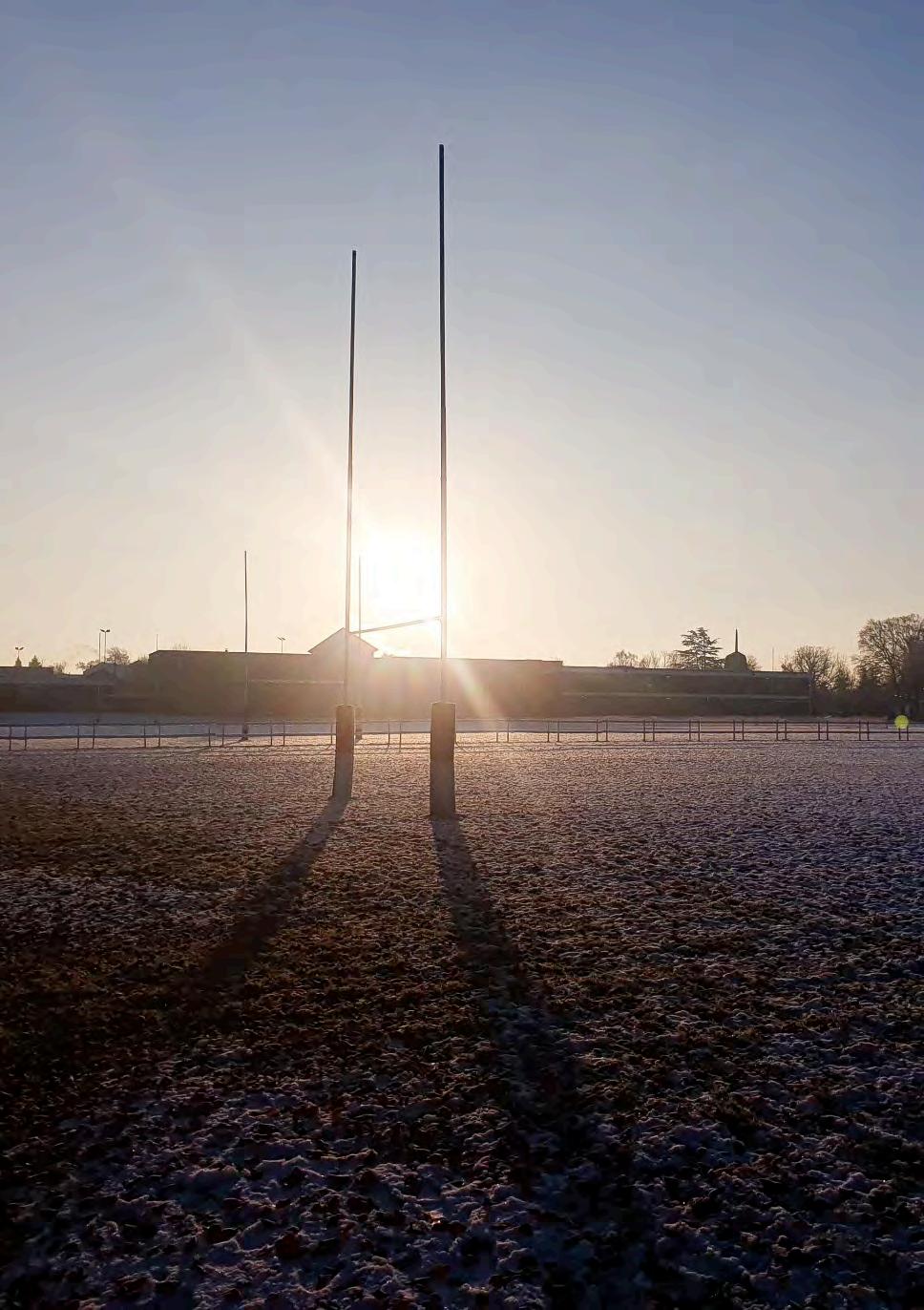

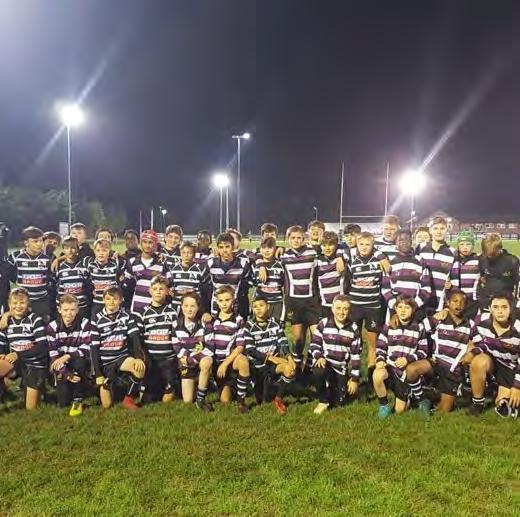


Olavian students continue to impress with their individual achievements as well as sharing success in team ventures. Participation levels remain high, and it is a real treat to walk round the school and see so many students engaged in extra-curricular sport once the bell has gone for the end of the day. The dedication and willingness to present these opportunities by staff and prefects should also be acknowledged, they do it because they know the value to the students and because it is a pleasure to share in their growth and success; thank you.
Students continue to engage in a rich variety of sporting activities both in the curriculum and in the multitude of lunchtime and after-school opportunities. The breadth of opportunity is fundamental to our aim of ensuring that everyone leaves the school having found at least one activity that they will continue to engage with. The curriculum is designed to give this variety of opportunity, but it is extremely satisfying to see so many different activities so well-attended beyond the school day.
Over the course of the year there have also been many highlights with individual success at county level or higher in rugby, Eton fives, cricket, table tennis, tennis, pentathlon and swimming, amongst others. Our cricket teams won the U12 and U15 Kent Plate, with the U13 runners up. Congratulations as well to Old Olavian, Aaron Grandidier-Nkanang, who represented France at Rugby 7s in the Olympic Games and was instrumental in them winning the Gold medal. Whether you play for fun, or to win medals, PE and Games has so much to offer and it remains a pleasure to be able to help provide so many opportunities, memories and life skills for our students.
Andrew Kenward Director of Sport
Athletics
Well done to our Year 7 and 8 athletes who competed in the Bromley Minors athletics competition. Lots of great performances, personal bests and valuable experiences for the competitors.

Badminton
Well done to Debaditya and Farhaan who received a Bronze in the U13 and U15 Badminton Doubles Category in a tournament organised by East Eagle Smashers.

Basketball
We were delighted to welcome back Old Olavian, Jeffrey Akintolu, from the New Jersey Institute of Technology. Jeffrey returned to present the school with his Great Britain basketball shirt, commemorating his participation in the U20 Men’s Team tournament held in Skopje, North Macedonia last year. It was an honour to celebrate Jeffrey’s achievements and reconnect with a valued member of our Olavian community.

Year 13 student, Raphael, represented Great Britain at the Modern Pentathlon U19 World Championship in Istanbul at the end of July. He also competed at the World Championship Laser run in Bath in August, followed by a training camp with the Junior and U17 athletes. Following this success, he was invited to compete in Olympic Hopes in Poland at half term.
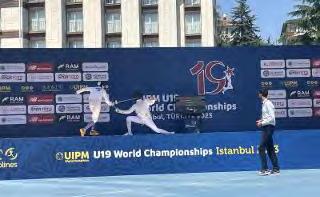
Cricket Congratulations to:
Year 13 student, Paul Bartkus, who played for Orpington Cricket Club First XI this summer.
Year 9 student, James Saldanha, was awarded ‘U13 Batter of the Year 2023’ by Bexleyheath cricket club.
Year 7 student, Reyansh Gope, was voted most improved player in the U11 Bexleyheath Cricket Team.
Year 8 student, Darsh Prakash, was selected for the Under 13 Kent County Cricket Squad.
Year 9 students, Aarush, Yash and Rayyan who were part of the team that won the U13 North Kent Junior League, representing Bromley Cricket Club. Their team played very well, with the players each winning a gold medal.

Aside from the cricket we were able to visit Bath city centre, including a tour around the Roman Baths. A very enjoyable half term full of cricket, and the players and staff have some wonderful shared memories to enjoy.
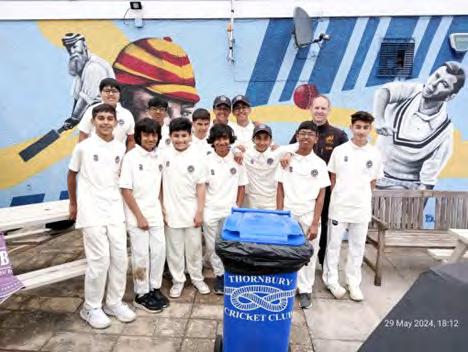

Congratulations to the U13 cricket squad for their successful tour to Bath over half term. Although the rain prevented any play for the first two days we were able to use the indoor facilities at Bath CC to develop our skills. The weather, thankfully, improved and we were able to play a reformatted fixture against Thornbury CC which resulted in a draw after a test-match style game. The last day saw us play against Chippenham CC where we recorded a comfortable win to end the tour on a high.
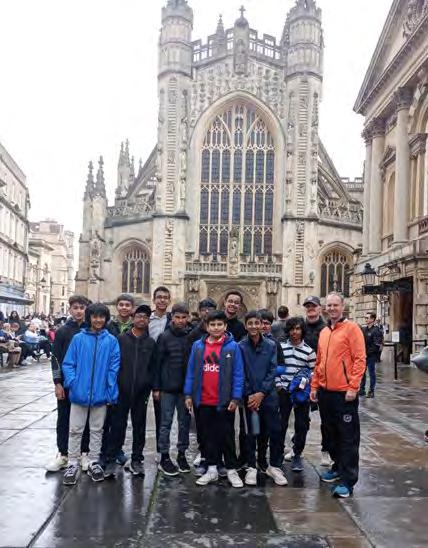
Congratulations to our Year 8 cricket team who progressed through to the semi-finals of the Kent Plate after beating Judd B team. St. Olave’s chased down their target of 96 thanks to a well-constructed 59 not out by captain, Aarav Gupta.
Congratulations to the U13 cricket team who won the bowl competition of the prestigious Reigate 6s tournament. Having come 3rd in their pool, with two tight losses and a win, the team then won through to the final against Cranleigh and managed to secure a win due to some explosive batting and tight bowling. Well done!

In July three Olavian teams play in the Kent Plate finals. The U15 team played Skinner’s, winning with just two balls to spare thanks to a 71 not out from Liam Butterworth. Then the U12 team managed to win a roller-coaster of a game against Tunbridge Wells GS by 6 runs, with Rachit Prabhu’s 66 the highlight. The U13 team just failed to beat Simon Langton with the game going right to the final ball; Aarav Gupta’s 60 and Raiyan Haider’s 51 taking us close. A great week and well done to all of the boys involved!

Well done to our Netball team who in sub-freezing temperatures and good spirits welcomed the netballers of Farrington’s School. At the end of the first quarter Olave’s had scored 6 goals to Farrington’s 4. Olave’s extended their lead over Farrington’s in the second quarter, with Fiona and Ugochi displaying impressive shooting prowess.
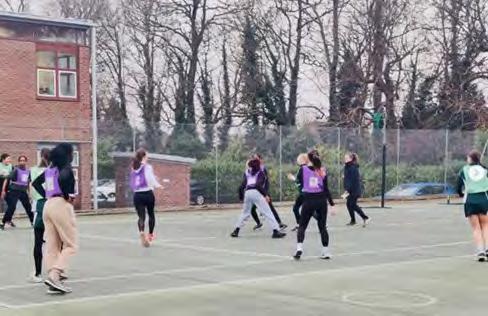
Farrington’s approached the third quarter with a more competitive mindset, narrowing the goal difference once again. Farrington’s continued to narrow the goal difference until the very end, where their efforts paid off with a final score of 22-22! Well done in particular to our Centre, Amber who was named Player of the Match, but well done to everyone for really entertaining gameplay in such bitterly cold conditions.



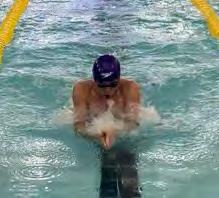
Year 12 student, Nam, broke another St Olave’s Senior Swimming Record at the Swim England National Championships. He broke his own record for the 50mbreaststroke for the third time with a time of 32.07. Nam also came 11th at the English Swimming Nationals and 4th in both the Kent Championships and London.
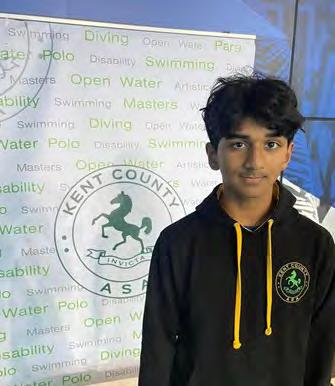
4 hours. The experience taught him the importance of setting ambitious goals and working relentlessly towards them. It showed him that with the right mindset, unwavering determination, and an incredible support team, you can achieve even the seemingly impossible, despite the jelly fish.
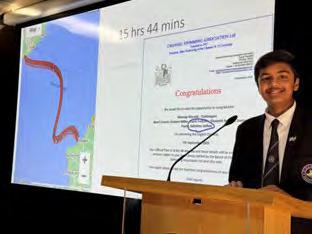

Congratulations to our U13 table tennis team for coming runners up in the South London Schools table tennis tournament. They fought through to the final where they narrowly lost 5-3 to Wallington Grammar School.
Congratulations to Year 9 student, Aaryan, who completed in the 14 and under age category at the Kent swimming championships. Aaryan qualified in six events, gaining personal best times in all of his long course events!
Congratulations to Year 11 student, Sahishnu, who led a whole school assembly, where he shared his experience of swimming the English Channel for Mencap back in September. From swimming in a pool for a mere 10 minutes, he progressed to enduring the sea for up to
Well done to our U13 and U18 table tennis teams who competed in the South London School’s individual championships, where several of the players reached the knock out stages and performed extremely well.

Well done to recent leaver, Eduardo Holovalyuk, who worked as a Ball Boy at the Championships, Wimbledon this year. He was selected from over 1,000 applicants.

Senior volleyball was played against Darrick Wood and St Olave’s won a good contest between the two teams.

The First XV have had 4 wins out of 6 (excluding cup games), winning against Old Boys, Colfe’s, Cedars and King’s Rochester, scoring 21 tries, with our biggest win coming against Cedars scoring 7 tries to win 45-20. The Second XV, comprised mainly of Year 11, have shown great bravery in their games, recently grabbing their first win against King’s Rochester, winning 34-10. Honourable mentions go to our joint top try scorers for the First XV being our captain Emenike Mwin and centre Chidera Abana with 3 tries each.
The U13B rugby team, maintained an unbeaten record, not only on the field but also in their unwavering spirits throughout their games. Furthermore, the U12 squad has developed considerably over the course of this half term. Commitment to training has been excellent, resulting in the A team beating Wilmington last week. The Under 14s have had a mixed start to the season with the A’s winning 2 out of 7 in very competitive fixtures.
There have been some notable individual highlights such as Kai Spence scoring a hat trick in the Kent Cup vs Dartford Grammar and Alex Dalip kicking 9 from 9 vs Kings Rochester.


On Saturday 27 January, many Olavians, family and friends (including those from St Olave’s Grammar School and Cambridge University) joined us for a rugby match to celebrate the life of much loved Old Olavian Harry McAleer.
The principle game, Cambridge Old Boys vs St Olave’s Old Boys proved a great match in the crisp spring sunshine and was very well supported and accompanied by a wonderful BBQ, cakes and music.

This was an opportunity, not only to collectively remember Harry but also to raise funds towards the legacy garden project in the St Olave’s Wellbeing Garden.


Our U15 boys competed well in the Kent Sevens Competition with four very tight games. Unfortunately they were not able to get out of a tough pool but development throughout the day was superb.
Well done to our U16 team, which included two Year 10 players, who competed at the Kent Sevens. They reached the quarter final with two good wins in the group against Kent College and Langley Park

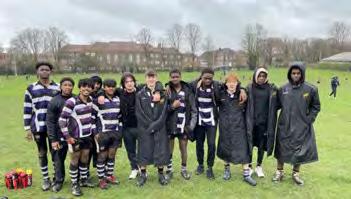
The Fives Team has had a busy season so far. The Year 7 team are doing brilliantly, helped and supported impeccably by the seniors and key year group captains. Matches have been played and won against Eton College, Harrow, Westminster School, Highgate and Charterhouse. Year 10 student, Chendoor Pushpanathan, reached the final of the U16s Individual tournament, held
at Highgate. The Senior Team have been competing in the first, second and third adult divisions in partnership with the Old Olavians.
Year 12 students Rishi Nandakumar and Aryan Akanda took part in the Adult Midlands Championships hosted at Repton School in Derbyshire. After a gruelling number of matches, they prevailed in a very close final, to win the Midlands Festival, defeating a strong pair from Ipswich. A great reward for all their hard work and dedication
The school Fives team has had a very busy and extremely successful few weeks. Matches were won against Eton, Westminster, Charterhouse and QE Barnet.
The Senior team won the Three-pair Team Schools’ National Championships, held at Harrow School. Aadi, Bomi, Tommy, Aaditya, Aryan and Alex recorded convincing victories throughout the contest to win the Williams Cup with 22 points. Shrewsbury were in second place with 14.
Alex Sapozhenko won the U21’s Nationals with partner Gwydion Wiseman. This was a great achievement and culminated in an extremely close final against our first Senior pair; Tanish and Aadi. Congratulations to all three Olavians for reaching the Final.
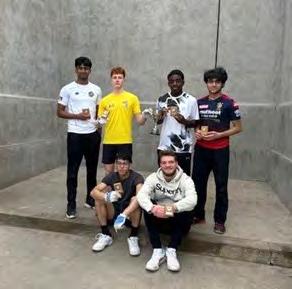
At the School’s National Championships, hosted at Repton School, our Fives players reached the quarterfinal stages or beyond in all age categories. There were two main Olavian highlights:
Our first Senior pair, Tanish and Aadi, first seeds for the Championships, were involved in what has been hailed
as the highest quality contest seen at school level in over 40 years. In their quarter-final match against Harrow 1 (who started as second seeds), it took a four and a half battle to win 15-13 in the fifth set.
The other highlight was the tremendous performance of the Olavian U14’s. An all-Olavian Final saw St.Olave’s 1, Krivi and Luke, against St Olave’s 2, Aayan and Yifan. This could not have been a closer contest, with Luke and Krivi eventually winning in the closest of five-set battles; by just two points! This is only the second time that St Olave’s have won this prestigious event at the U14 age category.
Congratulations to all of the players who have represented St Olave’s at the Championships this year and in numerous school matches. I would like to pass on a special “thank you”, from all of the Fives Team, to the academic teachers who have supported our being away whilst competing. It has been a wonderful season and we very much look forward to next season.
St Olave’s took part in the National 3-pair team event for Eton Fives. Year 10 pupils, Oscar, Henry, Vivaan and Chendoor were joined by Krivi and Luke from Year 9, to produce our strongest team in many years at this age. The event was hosted over the weekend at Harrow School. There were several very close matches and St Olave’s managed to remain undefeated at both first and second pairs, with our third pair only dropping three sets across the whole event. The team defeated Charterhouse, Harrow, two teams from Shrewsbury, and Eton College, to win the event. They were awarded the Hughes Cup in the process - a St Olave’s first!

Congratulations to all three U14 pairs who progressed to the National Finals at Repton.

It was good to see two Old Olavians in the Eton Fives Varsity match representing Oxford. There were also a number of Olavians in the Cambridge Team too! Well done Genesis and Aaditya!

After 18 matches, our First XI came runners-up in the North Kent Division 1 League following 12 wins and 2 draws. Well done to the captain, Matthew, and all the players. Thank you to Mr Shah, Mr Jackson and Dr Sidhu for coaching and supporting the team during the season.
Year 7 competed in hockey fixtures against SJWMS. Our A team lost to a strong team and the B team managed to hold on for a 2-1 win!

Our Year 7 Hockey teams (A, B and C) played against Sevenoaks – all played exactly as school sport should be, in a great spirit. Two draws and a loss – and a lot of fun!
Well done to our U15A team who travelled to SJWMS to play their U15B team – a close contest but St Olave’s managed to score some late goals to secure a 5-2 win!
During the February half term, our school organised a ski and snowboard trip—the first one since 2020. A diverse group of 45 students, spanning Years 8 to 13, embarked on an exciting journey to Jay Peak ski resort in Vermont, USA.
The trip unfolded over five days, with varying weather conditions. From perfect bluebird days to moments of near whiteouts, our students experienced it all. On Wednesday, they faced bitter winds and sub-zero temperatures at minus 25°C (including wind chill). On the final day, Friday, they were greeted with a foot of fresh snow and excellent powder conditions—a first even for the most seasoned skiers.
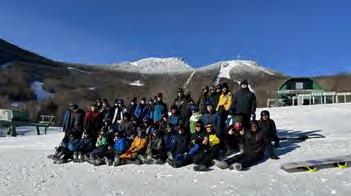
Guided by skilled instructors, the students made remarkable progress. They revelled in the scenic beauty and explored slopes suitable for all abilities. Evenings were filled with activities, including trips to the indoor water park, climbing walls, arcade visits, and watching an ice hockey match.

On the way back, the group explored the historical sites of Boston, including Quincy Market and the harbour area. An unforgettable trip, thanks to the staff who made it possible.
Congratulations to Oliver, Tymoteusz and Ilya who competed in the Kent Schools Skiing Championships. As a team they came second, with Oliver also coming second as an individual skier.


Well done to Lavanya Ganesula, mother of a Year 12 student, who completed the London Marathon. Mrs Ganesula ran to raise money for St Olave’s. Mrs Ganesula has now reached her target of £1000, which is also an excellent achievement. Two of our teachers, Mrs Metcalfe and Mrs Probodziak, also ran the marathon on behalf of Oxfam, and the Cats Protection League.
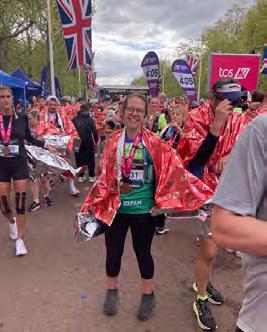

Congratulations to Year 7 student, Karam, who represented his football club, Punjab United, following his club’s participation in the FA’ s national volunteering campaign. Karam saw behind the scenes at St George’s Park during the Men’s International Camp in March.
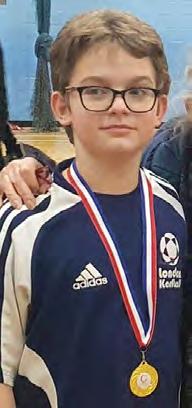
Congratulations to Year 7 student, Elias, who was selected to represent London at the Junior Korfball Inter-Area competition in Harrow.
Year 13 student, Nilay, represented Kent in table tennis in the Under 19 Boys’ County Championship. He won all four matches on the first day of the event and will play the second day of the event in March.
Well done to Year 10 student
Aneeq on his table tennis achievement, having just completed the National Junior League season playing for his club in the Tunbridge Wells Division 2. He and his three other teammates are the 2023/2024 runners-up, short of being joint winners by 1 point.
Congratulations to Alexei, Arvin and Arnav who played Table Tennis as part of the National Cadet League Season, playing for their Club in Horsham in Division 1. They are now the National Cadet League Winners of 23/24, winning with a large lead over 2nd place. Well done boys a super achievement. Congratulations also to Alexei, who was awarded two Gold medals in the Cadets and Juniors categories.

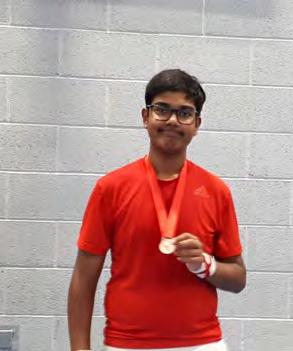
Year 9 student, Debaditya, won a Bronze Medal in an Under 15 Doubles Badminton tournament held in Swindon.
Year 7 student, Neal, won the accolade of ‘Batter of the Year for Under 11s Cricket representing Hayes Cricket Club.
Congratulations to Year 7 student, Ashvik, who was part of the team that won the U13 Boys hockey tournament organised by Eastbourne Hockey Club.






In today’s fast-paced, visually driven world, art education has never been more essential. Art teaches students vital skills that often are not addressed in other subjects: the ability to express themselves, think creatively, and respond thoughtfully to the world around them. One of the most remarkable aspects of art is its open-ended nature—there is no right or wrong answer. It encourages students to take risks, make mistakes, and grow from those experiences, fostering resilience along the way.
Through art, students not only develop their own unique personalities but also nurture curiosity, creativity, and passion. These qualities translate into improved communication skills, whether through writing or interviews, helping students to stand out and succeed in other areas of life.
In a world saturated with imagery—from social media to advertising—understanding how to interpret and engage with visual content is crucial. Art helps students develop abstract thinking and make universal connections, preparing them for a future where visual literacy is as important as traditional literacy.
At Art Club and Art Society, we explore these ideas in depth. Visual literacy—the ability to ‘read’ images— is a constantly evolving skill. We guide students in interpreting the world through the lens of art, helping them understand how images shape our perceptions and how they can use this knowledge creatively.
Our Art Club is working on a collaborative mural using lino printing, centred around the theme “Art Brings Us Together.” Meanwhile, Art Society, in partnership with the Environmental Society, is creating visual campaigns to raise awareness about the pollution caused by cars idling outside the school gates. These projects not only highlight artistic skill but also address important realworld issues, showing how art can inspire change and bring people together.
Alfie Wilmott Teacher of Art
The Art department braved storm Ciaran to take the Year 10 GCSE Art students to the newly re-opened National Portrait Gallery for a workshop and visit to support their GCSE coursework project.
The reorganised gallery was fantastic and inspiring, with the knowledgeable staff leading the boys through a fascinating and informative workshop exploring the ways in which artists have used portraiture to dig deeper into the identity of their subjects. This dovetailed beautifully with their current ‘Identity and Narrative’ project and we could see the boys really developing a deeper appreciation for the ways in which artists use a range of visual communication methods. They were a credit to the school and made some excellent and astute observations, asking thoughtful and perceptive questions and behaving themselves impeccably. We are really excited to see how they incorporate this experience into the development of their own work.
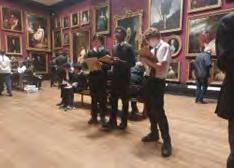

The Year 9 Art students spent 10 weeks exploring the concept of illustration and how that works so beautifully in tandem with poetry and prose creating rich works to evoke the mood and meaning of the work in different ways. This year we selected three very different artists for them to use as inspiration; The beautiful works of Charlie Mackesy whom you may have seen on TV over Christmas with “The boy, the mole, the fox and the horse”, the hard-bitten, film-noir-esque works of Frank Miller and the classic collage work of Eric Carle who you will know from “The Very Hungry Caterpillar”. Having explored these diverse ways of working, the Year 9 art students then devised a series of workshop lessons to deliver to the rest of the year group so that they could create brand new illustrations for the classic “Jabberwocky” poem by Lewis Carroll.

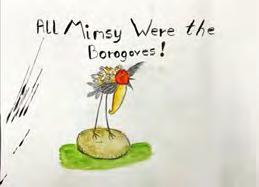


It was amazing to see our students step up and take responsibility. They are able to deliver some outstanding lessons as well as being hugely impressive with the maturity and respect that their year group showed to their peers. With such a fun and evocative poem to explore, it is no wonder each group created work that was distinct and unique culminating in five entirely different animated illustration of the poem.
We are delighted to confirm that Year 9 student, Sachin Prakash’s entry for the Arts and Humanities section of the competition was highly commended. The Perse Research Team received an impressive array of entries under the various titles provided. Well done to Sachin who wins a prize and a certificate.
Sachin was also selected on the official Final Shortlist for the prestigious Pink Lady Food Photographer of the Year for his image in the Youth 13-17 Category.
Moreover, as part of a celebration evening for coming in the top 1% of the Landscape Photographer Of The Year, Sachin was also invited to an awards evening at the book publisher, Hachette’s headquarters. There were many prestigious photographers who were judges there who commended him for his photography.

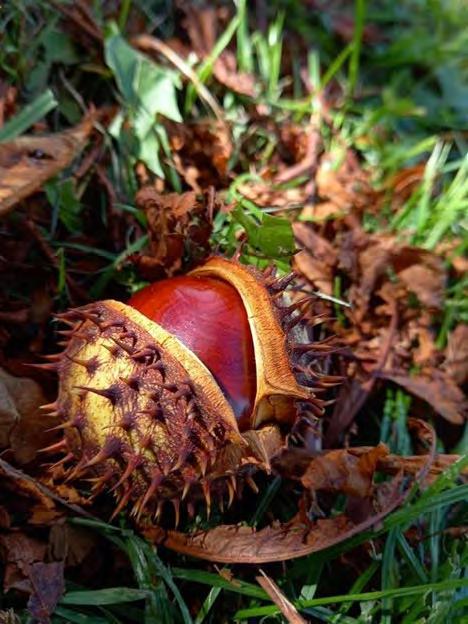



This year the Design and Technology department worked towards reducing our environmental impact by introducing a plastics recycling station to the workshops. Students in all year group are now able to recycle used plastics both from workshop waste and from home to create sheet plastic. We also welcomed two new members of staff, Ms Cox and Mr Dunkley who covered maternity leave within the department and Mr Twose oversaw this time, taking on the role of Head of Department for the spring and summer terms. During the summer the department saw a much overdue renovation leaving the workshops looking clean, bright and ready for students and the years worth of VEX trophies were put on display around the department showcasing the achievement of the students as well as the game pieces for each season. The department continued to offer support in the application of the prestigious Arkwright Scholarship with students continuing to show great interest and dedication to the application process. In extra-curricular clubs the F1 teams continued to impress, winning more trophies for the cabinet and retaining the National Championship trophy for Development class and the UK Space Design Team winning the National Championships for the 7th year running. We were also excited to get VEX IQ back up and running and look forward to the team starting to compete next year.
Rosie Hawley Head of Design & Technology
Two teams in Year 8 took part in an ‘IET Faraday Challenge Day’ (Institute of Engineering), alongside invited students from Newstead Wood, Cleeve Park and Hayes Schools. Pupils worked in teams to create a prototype that could support one or more groups of ‘road users’ in their local area. Teams had to be creative, plan carefully, work with specific resources from electrical components and construction materials. They had to record their thinking, work out a budget and of course work as a team. Solutions ranged from pressure plates at pedestrian crossings to solutions to improve the overflow of water in drains during periods of heavy rain. Well done to all the teams who developed a range of imaginative design ideas.
Year 9 Design and Technology students visited the Design Museum as part of their Design Ventura project. They spent time exploring the museum, visited the Designer, Maker, User exhibition, the Museum Shop and attended two workshops learning about sustainable materials and generating and developing ideas.

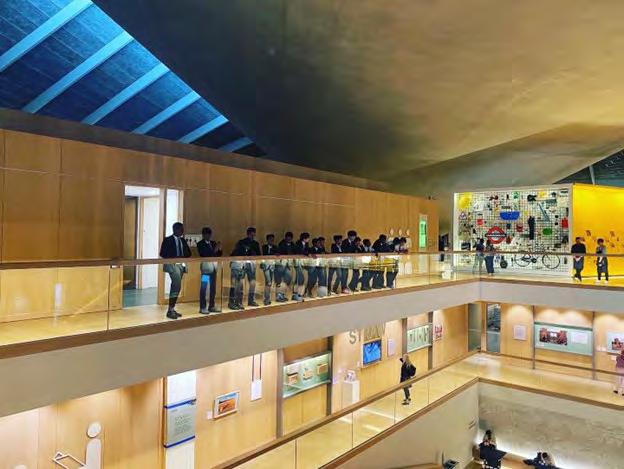
Following the Space Design finals earlier this month at Imperial College, Year 13 student Naman Malhotra was selected to represent the UK in the team for the International Space Settlement Design Competition (ISSDC) that takes place at the Kennedy Space Centre in Florida, later this year. This is an enormous achievement and fantastic opportunity for Naman. Congratulations to him and the Olave’s team that helped him get there. We hope he has a fantastic time!
Having won the Regional Finals, our students took part in the Space Design National Finals at Imperial College London and were delighted to be part of the winning team. Working with students from other schools, the task was to design a space station for 2045. They had to consider logistics and operations, costings and human factors that would allow them to meet the brief and
impress the investors. They worked incredibly hard and were very impressive, so a huge congratulations to Year 13 students Frank, Pelumi, Avdesh, Ilinca and Naman, and to Year 12 students, Keshav, Saneeka, Vedant, Jawad, Arya, Hannah and Aashman.

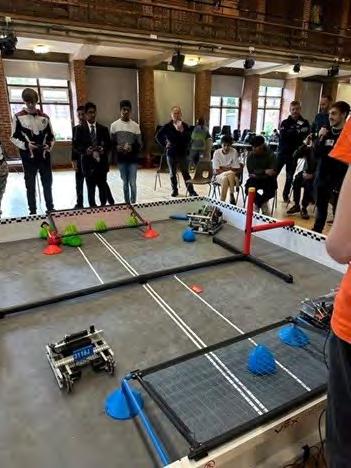
It was great to host our first VEX Robotics Regional here at St Olave’s since 2019. 14 Teams from six different schools competed throughout the day in practice, qualifying and elimination matches, testing their robot design, build and programming as well as their strategy, driving skills and performance under pressure in this year’s game, Over Under. It was fantastic to welcome back Old Olavians and VEX Nationals winners, Sean Seeds, Joseph Barradell and Noah Cassidy who volunteered with commentating, scoring and judging throughout the day. Well done to our three teams who competed in their first ever VEX competition.
Seven Year 12 students made their way to Horsham to take part in a student robotics competition as part of a Tech Day. Lots of progress was made thanks to the hard work and dedication of all the team members, culminating in them making a robot that was able to move and find targets autonomously. Well done to everyone who came along.
16 Year 12 and 13 students competed in the student robotics competition against schools from all over the UK and Europe. This is a culmination of sixth months of designing, testing and debugging a completely autonomous robot. They overcame many struggles and technical gremlins before things started to click on Sunday. This culminated in them making the quarter finals before being knocked out by the eventual winners, Gymnasium Markt Indersdorf. Well done to all involved both at the competition and beforehand in getting themselves ready to compete.

Well done to Mr Dunkley, and three Year 12 students, Oleg, Ewan and Sanjana, who created a Rube Goldberg machine in DT.

Azizah and Sanjana in Year 12 spent the day at City Hall for the ‘Design Future London’ final where they met VIPs including Jules Pipe CBE, Deputy Mayor for Planning, Regeneration and Skills and George Clarke, Architect and Channel 4 television presenter. They presented their work in front of invited guests and a plethora of finalists, and were ‘highly commended’ for their architectural entry.

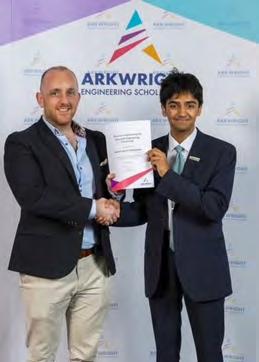
Congratulations to Keshav in Year 12 who has been awarded the prestigious Arkwright Scholarship, which recognises his engineering and leadership potential.
Keshav had to complete an in-depth application form, an aptitude exam and was then invited to be interviewed by a panel of judges. Keshav competed against over 1300 students, with a select number being invited to the interview stage. We look forward to hearing about his next steps as he pursues his passion for Engineering.
Year 7 students explored the scenes and discovered the magic behind the spellbinding special effects and secrets of the Harry Potter film series. The students visited the original stone floor of the Hogwarts’ iconic Great Hall and wandered down Diagon Alley. The groups had the unique opportunity to walk around two soundstages, as well as a back lot that is filled with original sets and animatronic creatures.

Film Society is a blossoming society that Aashman and Dennis started in Year 11, hoping to provide a place for fellow cinema lovers to share their passion. Since then, we have had around 45 talks from all genres. For example, Sujai Kirupakaran gave a talk on Tamil cinema, which is a rapidly-growing industry becoming more mainstream every year. Our society members found it very interesting to hear about the success of a foreign studio as well as Tamil Culture.
Old Olavian, Mike Battle (2012), shared his journey into script writing with Film Society. He offered lots of valuable tips about joining the industry, warning that you start at the bottom which ‘can be very humbling’ and work your way up through making contactsand being prepared to push yourself forward. Mike recommended the role of Location Marshall as a route to getting onto the set and making initial contact with others. He recommended Facebook groups for finding jobs and repeatedly emphasised that proximity is power. The National Film and Television School courses were a more traditional, academic route, he said. “Write what you know” was another strong message.
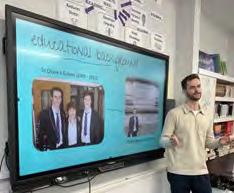

The 2023 - 24 season of F1 in Schools has been nothing short of thrilling. With brand-new teams, fresh challenges, and the introduction of halos for the Professional class, our students have continued to demonstrate incredible innovation and teamwork, building on last year’s success.
As one of the most challenging and renowned international STEM competitions, F1 in Schools is a year-long competition that challenges teams to design and manufacture their own miniature Formula One car. These cars are then raced against those of other teams, with teams aiming to get the fastest track time while also adhering to all rules and regulations. Beyond just racing, teams must also submit a detailed Design & Engineering Portfolio and an Enterprise Portfolio, alongside delivering a verbal presentation to a panel of judges – comprising industry experts with significant experience in the engineering and STEM sectors. The competition also requires teams to create pit displays which showcase their team ethos and promote their sponsors. These displays are vital in presenting their team identity and demonstrating their journey to the other teams and judges alike.
This season saw intense competition across both the regional and national events, with the London North and London South regionals showcasing the indubitable strength of our school’s teams. At the London South regionals, Protonic obtained a multitude of awards, including Lightning Reaction, Best Engineered Car, and the Sponsorship & Marketing Award. They were also nominated for the Pit Display Award and finished 2nd in their class overall, earning a place at the National Finals. Warp also dominated the Development class scene, taking 1st place and winning the Research and Development Award, alongside being nominated for the Team Identity Award and Portfolio Award. Alpha Motors also competed in the Development class and achieved the fastest track time; however, due to an illegality in their car, they, unfortunately, missed out on the Fastest Car Award and a place at Nationals.
At the London North regionals, Genesis in Entry Class emerged as champions, winning Best Engineered Car and were placed 1st overall, along with a nomination for Best Verbal Presentation Iconix also stood out, winning Fastest Car in the Entry class, while Blitz claimed the Verbal Presentation Award and the Research & Development Award. Hyperstorm also earned a one-off accolade, the Mr Twose Award, for being the team that stayed perfectly on schedule throughout the competition. In Professional Class, Tori Veloci secured 2nd place, earning them their rightful place at Nationals, and picked up the Team Identity Award and a Sponsorship & Marketing Award nomination along the way.
Having conquered regionals, Protonic, Tori Veloci, and Warp went on to represent St Olave’s at the National Finals, held at the Magna Science Adventure Centre in Sheffield. The long journey to the venue did not deter our teams from being eager to compete in one of the UK’s most significant STEM events. It was a gruelling 200-mile drive – but every team persevered to reach their goal. The event spanned two days, and by day one, the teams were already impressing with their quick track times and pit displays. Protonic was in the top 15 track times for the Professional class, and Tori Veloci was in the top 20. Warp dominated the Development Class leader board, achieving the fastest track time for the Development Class and beating 12 of the 27 Professional class cars. The competitive spirit could be seen as each team aimed for the quickest possible time. The culmination of their hard work was evident as they presented their portfolios and took part in verbal presentations, further impressing the judges with their professionalism and knowledge.
The second day continued with the same intensity as all teams raced for the podium, building on the previous day’s results. They also received invaluable feedback from the judging, which took place the day before, on how to improve for future competitions. And, as the teams dismantled their pit displays and packed away into the minibus, it was finally time…
The teams gathered with anticipation as the awards ceremony commenced, the atmosphere excited after two days of intense competition. Warp’s dominance of the Development class was evident as they claimed the Best Engineered Car Award, Research and Development Award, and Fastest Car Award. Tori Veloci received the Project Management Award and was nominated for the Portfolio Award. Protonic was nominated for the Verbal Presentation Award, narrowly missing out on returning it.
With the individual awards distributed, the ceremony moved to the podium results, starting with the Development class. As the first school in the competition’s history to become double national champions (last year), we hoped to replicate that success this year. The room was filled with excitement as 3rd and 2nd places were announced. Finally, Warp was declared the Development Class National Champions. Even more astounding is that the points difference between them and 2nd place was equal to the difference between 2nd and 6th place (~90 points). Though their victory meant they could advance to the 2024 World Finals (much like last year’s National Champions Inferno and Golden Motorsports), Warp decided not to proceed.
Finally, the podium announcements for the Professional Class followed. Tori Veloci and Protonic, having performed admirably throughout the two-day event, eagerly awaited the results. However, LEAF1 from Simon Langton Boys’ School ultimately took the top spot, securing the title of Professional Class National Champions.
It must be said that without Mr Twose and Mr Robertson, none of this could have been achieved. They organised the event, gave us invaluable advice, and helped manufacture many cars our teams produced. The achievements of all our teams reflect the exceptional talent, hard work, and resilience within our school. The experiences gained, and lessons learned will serve as a strong foundation for future competitions and teams from our school. With preparations for the 2024 – 25 season underway and new teams extending our school’s legacy of high achievements in this competition, we look forward to another exciting season ahead.
Aneeq Weerasinghe, Michael Qu, Neal Ye, and Abhinav Malladi, Year 10, on behalf of all the teams.

Silverstone
As part of their prize for winning the F1 in Schools National Finals 2023, the team were invited to attend the 2024 British Grand Prix. This included entry to the paddock and the chance to meet the drivers. This was an amazing opportunity to meet Max Verstappen, Lando Norris, Carlos Sainz, Oscar Piastri and get their winning car signed. Thank you to Mr Twose, Ms Lands and Ms Senaratne for giving up their Sunday and accompanying the team.


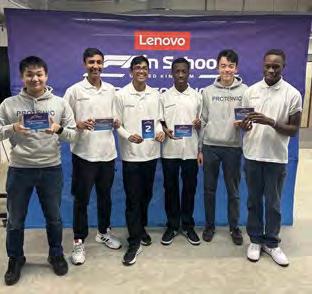
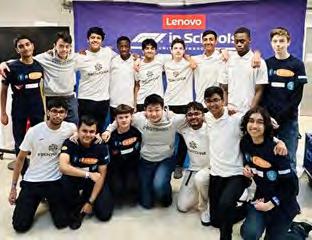




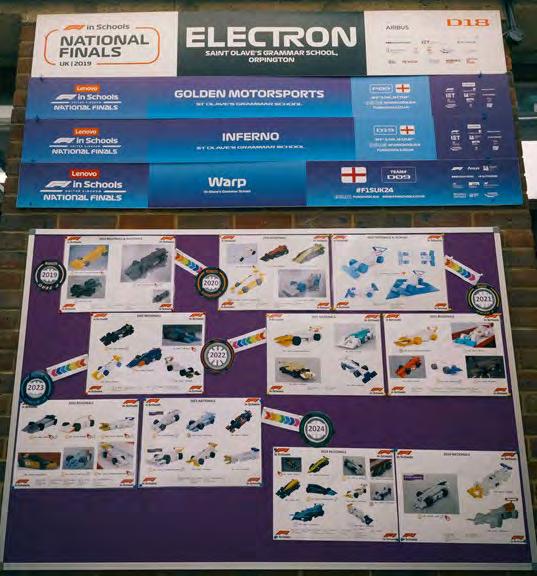
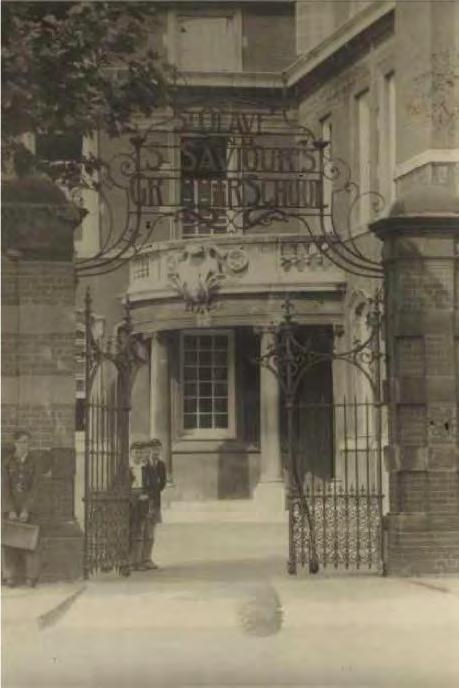
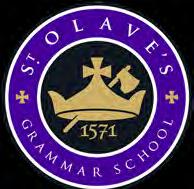
Editor’s Notes
Chairman’s Report
The Old Olavian Antiquarian Society
OO Reunion Lunch - 2024
Commemoration Service - May 2024
Careers Fair - 2023
Tea and Tour of Tooley Street
Stephen Davies 80th Birthday Concert Clubs
John M Brown
Chris Harris
Richard Norman
Various Contributors
David Currie
Richard Norman
Ed Prekopp
Various Contributors
Richard Norman
David Budds
Lance Giles
John M Brown
Howard Wiseman
I thought this was going to be one of my least busy years since I became editor of the Old Olavian section of our magazine. But there was an unexpected rush shortly before the deadline, and I like to think that readers will enjoy what we have gathered together. Most news now is passed on to members electronically and is, therefore, more immediate. Just one of the outcomes of Progress, I suppose. It is quite likely that anyone wanting to read The Olavian in the not-too-distant future will have to do so on-line.
Last year I reported that I had been retired from my role as 1st XI scorer for Derbyshire County cricket club. I have still managed to fill my days with cricket scoring and some umpiring, mainly with junior age-group teams in Staffordshire, but also with the Zimbabwe Under 25 team who were on a seven-week tour in this country. I was lucky enough to be invited to score for all their matches in various venues around the country. These included Arundel, Leeds, West Bromwich and Merchant Taylor’s School, near London.
My health has given me a little more concern this year –after a blood test I was told that I was suffering from B12 deficiency, a diagnosis of which I had never heard. I have been started on a course of injections which should give me more energy. Even so I still feel so lucky to have avoided the illnesses and handicaps which trouble so many people as the years pass.
I wrote last year asking cricket-loving readers to lend their support to the long-running (every year except the war years since 1908) tour of south Devon, so it comes as a great sadness to hear that the tour has been abandoned through lack of Olavian support. Our tour is something of which we should be very proud. It is hard to imagine it ever being resurrected, but we can live in hope. I would strongly recommend Lance Giles’ article giving his thoughts on the ending of the tour. He has been a most enthusiastic organiser of the tour in recent years.
During the first weekend in November 2024 I was again able to visit Repton School to watch some of the Eton Fives Midlands Tournament, so efficiently organised by our own Howard Wiseman. He had brought seven pairs up from the School for the weekend, and it was good to see them rewarding Howard with plenty of Olavian success.
As always we thank Tereska Taylor for her help in producing the OO section of this magazine: her expertise is much appreciated.
John M. Brown (1948-55) Editor, Old Olavian
As Chairman, it’s been a pleasure to reflect on another memorable year for the Old Olavians Society. A personal highlight was seeing two tables filled with my peers at the annual Reunion Lunch in September. For nearly half, it was their first reunion—a special moment as we approach the 50th anniversary of leaving the School. The event itself was remarkable, with over 100 attendees.
We were privileged to hear from Wing Commander Andrew Duncan Green OBE (1980), the World Land Speed Record holder. His exhilarating account of breaking the sound barrier in Thrust SSC made us feel as though we were in the cockpit alongside him.
While there were many highs this year, the saddest development was the cancellation and end of the Old Olavians Cricket Club’s Annual Tour to Devon, a tradition dating back to 1908. A lack of willing players brought the tour to an end, and the Club may face challenges in maintaining its two or three regular fixtures. Time will tell.
In November 2023, Old Olavians collaborated with the School and the Parents’ Association to host a Careers Fair. Around a dozen members shared their expertise with current students, offering valuable advice and inspiration. Additionally, Old Olavians returned throughout the year to give talks and mentor students, a ‘Giving Back’ tradition we hope will continue to grow.
February brought another enjoyable visit to the former school premises on Tooley Street, now the boutique Lalit London hotel. Organised by Mike Roberts (1965), the event was a nostalgic journey for the 30+ attendees, complete with a delightful tea and a tour of the sympathetically preserved site.
In March, the Society’s AGM was held via Zoom, and the minutes are included below. A significant portion of last year’s donation to the School remains earmarked for the Cricket Nets Appeal (https://www.saintolaves.net/6015/ cricket-nets-development). Financial highlights from our Honorary Inspector, Paul Askham (1977), are as follows:
Society Accounts Summary - 2022 2023
Income £16,994 £15,339
Expenditure £25,227 £19,672
Net Position (£8,233) (£4,332)
Closing Balance £28,173 £23,841
In May, sixteen Old Olavians gathered for lunch ahead
of the Annual Commemoration Service at Southwark Cathedral. I had the honor of sitting beside Rev. Clive Smith (1969), whose fascinating career in the Church left a deep impression. Sadly, Clive passed away in September, and I am grateful to have shared that time with him.
This year also celebrated significant achievements: Aaron Grandidier-Nkanang (2018) won an Olympic Gold Medal in Rugby Sevens representing France, and in July, Peter Leonard (1977) opened the School Archive Room, showcasing our shared history.
Photographs and memories of all these events are available on the Society’s website. I’d like to extend my sincere thanks to School staff, especially Karen Barnard and Kay Brooker, for their invaluable support throughout the year.
To those registered on our website (https://stolave.ptly. uk), I hope you’ve enjoyed the bi-monthly newsletters. Feedback—whether about the newsletters, website, or the Society’s activities—is always welcome.
Here’s to a successful 2025! Warm regards,
Chris Harris (1977)
The Old Olavian Antiquarian Society
Richard Norman (1955-62) has been moved to reread his copy of Two Schools, the history of our school which was written by the headmaster, Dr Roger C Carrington. In the preface Dr Carrington thanked the members of the OO Antiquarian Society for their help in researching relevant documents, and Richard wondered whether that society still exists. As he suspected it is no longer operating, and Richard hopes that there might be some Olavians whose only experience of the school has been at its new site in Orpington who would like to renew the good work which had been started by Old Olavians with an interest in the history of the original school. Now there is a new building which is developing its own history, and which needs recording.
Richard suggested that we might publish the first three paragraphs of the foreword to Two Schools, written by H J Lester, the school warden. This foreword follows here:
“In The Olavian of December, 1945 an announcement was published of a projected new society of Old Olavians, the St Olave’s Antiquarian Society. The declared aim of this society was ‘the furtherance of interest and research into the history of St Olave’s and St Saviour’s Schools, the surrounding district, the personages connected with the Schools, and similar matters’, - and the publication of a History of the School was envisaged.
“From the beginning Dr Carrington, who was appointed first President of the Society, took an active part. The
Society met at regular intervals throughout the years, some members perusing the governors’ records which contain an unusually complete collection of minute books, and some researching into the very wide range of topics connected with the history of the schools and the foundation. This book is the result of their detailed and protracted labours. The interest and guidance of Dr Carrington remained the principal motive force and he took upon himself the collating of material and the writing of the history. A short interim volume was produced for the Quatercentenary of the Charter of St Saviour’s Grammar School in 1962, the complete work has been published in commemoration of the Quatercentenary of the Charter of St Olave’s Grammar School.”
“The illness of Dr Carrington, which forced his premature retirement from the headmastership, made its onset in the year preceding the Quatercentenary and before the book had been prepared for publication, though happily he had completed the writing of almost all of the text before this. It is sad that the long career of one of the most distinguished headmasters in the history of the school should have been brought to a close immediately before the Quatercentenary to which he had looked forward and for which he was preparing this book. The consolation lies in the completion of his greatest work, that of transplanting the school and its tradition into its new surroundings and its imaginative and characteristic buildings. That and this book will remain as a testimony of a great headmastership.”
Chris Harris invited several members to write about their experience in attending the annual reunion for 2024. These follow:
Paul Barker (1977) wrote that he had had a great time, and that he was really pleased that he had made the effort. It had been a pleasure to meet up again. “Going back to the school after so long was very weird. After so many changes in my life over the last forty-seven years it still felt so familiar - despite the many improvements to the fabric of the school.”
“Of course, it was meeting old friends that was so special. In particular for me it was amazing to meet Chris Sims (we spent so much time in each others’ houses back then, as well as the countless rugby games and tours), and Brian Hempstead (with whom I spent my first holiday without my parents in 1976). It also gave me the opportunity to apologise to Russ Latuskie for the rather aggressive handoff on him that got me into the rugby team (that was when we were twelve). He was so small back then, and I think I hurt him. Fortunately, he didn’t remember that particular event - at least that’s what he said!”
David Currie (1977) wrote that the last reunion he had attended had been sixteen years ago. This time he was taken on the guided tour of the school, and he found it to have been a good day for the company, food and beer!
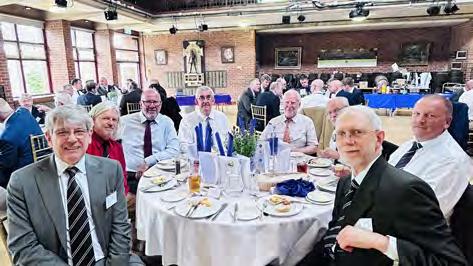
clockwise:
John R Hassall (1960), as the oldest member present at the reunion, was named as “Father of the House”! He wrote: “This year I went on a tour of the school which I’d not done previously. A very tall young man, Max Acton (2024), was our guide and was very informative.”
“As I was at the old building in Tooley Street and never at Orpington it was good to see how the school has flourished. All I saw of the music room was electronic keyboards, a far cry from the days of Desmond Swinburne who constructed a harpsichord from several TV sets which the woodwork and music class had painstakingly taken to pieces. Music was always my forte and since 2006 I have been singing with Taunton Deane Male Voice Choir raising money for charity.
“It was good to see Graham Milne (1963) and John Williams (1964).”

Table 4: clockwise: Graham Milne, John Williams, George Snelgrove, Paul Dimond, Richard Norman, John Hassall
Paul Owen (1977) wrote that “It was a real delight to meet former class and year members for the first time in over forty-seven years! I had to pluck up the courage to attend, but it was great. I encourage others to book next year, especially, if like me, you’ve never been along before.”

Table 6: clockwise: David Cresswell, Paul Owen, Bob Ward, Richard White, Robert Higgs, Colin Woodward, Rajiv Purwar, Chris Sims (hidden), Ivor Higgs, Garry Symmons
Garry Ralph (1988) commented that it was well done for another awesome lunch, and that he is already looking forward to next year.

Table 10: clockwise: Matt Birtchnell, Rochelle Maxwell, Dave Ravel, Daniel Munday, Mike Smith, Garry Ralph, Richard Miller, Stephen Street
Ed Prekopp (1972) wrote: that “it was an excellent reunion lunch, with excellent company, excellent food, and a brilliant speaker. I am always moved by the singing of the old school song. Hearing it being sung by the whole gathering brings us all together and unites the generations of Old Olavians. It brings a lump to the throat. It was a lovely day, very well organised, and I thank you for a wonderful day.”

Table 8: clockwise from Noel Tredinnick (waving), Keith Goldsack, Ed Prekopp, Alan Moore, Jennifer Franks, Charlotte Rutter, John Rutter, Ian Clifford, Graham Bunce, Nigel Smith
Our chairman invited several attendees to record their impression of their participation in the Service of Commemoration at Southwark Cathedral. These follow here.
David Currie (1970-77) “This was my first visit back to Southwark Cathedral since 6th form days back in 1976/7. We had a good lunch in a nearby Fuller’s pub (they do not reach to my part of the UK) before the service with a chance to meet other Old Olavians, some of whom were new to me. I even discovered someone that had worked for the same corporation as me. After the service there were cakes and tea in the Cathedral library. It was a good day out without the need to travel out to Orpington, and it provided a chance to see how much that part of London has changed.”
Richard Norman (1962) wrote: “Thank you, Chris, for arranging what is a new group (to me) of Old Olavians’ attending Southwark Cathedral. It was an excellent lunch and service. And thank you also to those to whom I chatted; it is a new group as many of the new attendees are those who spent at least part of their time at ‘the new school’! I guess there will come a time when a future ‘new group’ will consist of OOs who only know the Old School as a hotel.”
“Every time I come to Londinium I wonder ‘Will this be the last time?’ The journey, now from Devon, takes much longer than it used to (into Paddington) before we ‘downsized’ and moved; although now arriving at Waterloo it is much easier along the Jubilee Line (extension) into London Bridge.”
“Were Carrington still alive he would be amazed and overjoyed at the new work and discoveries in Pompeii; few, even those who knew him, appear to have known that he spent ‘all of his summer holidays’ there. If you can put up with it, I encourage ALL OOs to buy and read his book Two Schools – you will have to work at it – but nothing worthwhile comes without effort.”
“I left Saint Olave’s in June 1962, so 2024 marks sixtytwo years of my ‘life after STOGS’ (62/62 will not occur again)!”
“The school (that is, of course, the teachers, not the buildings - and Roger C Carrington) have been a significant influence on my life.”
“University did not quite take over for me – I had remained in London but left London & Manchester Assurance (and thus lost the funding of my degree course) only a few months before its completion for a ‘more exciting’ career and life!”
“Having returned, tired, tomorrow I travel back up to Blackwater, having just written a piece for that organisation and meeting in which I say: ‘I have been extremely lucky my whole life; people do not understand that a lot of effort (often by others, not all of whom are thanked) goes into being lucky – thought and planning.”
“Do I plan to attend Southwark next year? Yes, but as is said ‘man plans while God laughs’ maybe that plan is simply a ‘hope’.”
“Will I see you all at the ‘new school’ in September? I hope so.”
“During the day I visited the Cure Monument and later was chatting to one of the masters (teachers) who had taken on the task of sorting the ‘stuff’ and had found the framed ‘original’ charter signed by Queen Elizabeth and so I started this off.”
“The school site has some of the history (by the way my word for history is ‘mystery’ which is probably the cause of my interest). I believe that it would be a great project for some OOs or scholars to create wiki pages for each of the four founders and or Church Wardens (the reason that the school has Wardens to this day). I have misplaced my copy of Two Schools and that has a lot more info so unfortunately I am unlikely to be able to complete this so I wonder can you enthuse a few others to maybe cooperate on it/them?”
Ed Prekopp (1965-68) wrote that he was “pleased to attend the St Olave’s Service of Commemoration and Thanksgiving on 2 May held in the majestic Southwark Cathedral, which I remember doing as a pupil all those years ago. I felt very privileged to be a part of it, and to have been fortunate enough to have attended St Olave’s school. It was good to see the whole school join together to give thanks to God for the gift of a good education, for friendships made, and for the many blessings received. We sang some classic hymns including old favourites of mine ‘Love Divine All Loves Excelling’, ‘Praise My Soul The King Of Heaven’, ‘Tell Out My Soul’ and ‘Jerusalem’. The school orchestra and choir also gave excellent performances including the beautiful ‘Locus Iste’ by Anton Bruckner. ‘Locus iste a Deo factus est’ translates as ‘This place was made by God’ and, although generally used in the annual celebration of a church’s dedication, on this day it applied very appropriately to our school.
“As Old Olavians, we were very honoured to be given seats close to the front and, as well as listening to the music and singing hymns, we were given a short history of the school read by some of the senior pupils, and an inspiring sermon from Acts 10 given by the Rev Justin White, the
Senior Provost of Woodard Schools, which includes St Olave’s. The sermon was on the story of Peter’s vision of the sheet coming down from Heaven containing all kinds of creatures, and his invitation to meet with Cornelius, the Roman Centurion. Rev White applied the message of this text to the prejudices, judgmentalism, and conflicts we experience in our everyday lives today.”
“After the service we were treated to tea and cakes in a library in the Cathedral precincts, where we were able to meet and talk with our fellow Old Olavians, as well as some of the senior pupils of the School, and others. I finish with the prayer offered during the service ‘Oh God, our Father, we thank you for St Olave’s School and for all who have worked to make it what it is today. Help us to build on the foundations which have been laid, so that the fruit of true learning may abound, through Jesus Christ our Lord. Amen”.
From the School - It’s wonderful to hear about the successful event that took place on Friday, 10 November. The initiative to provide career guidance and networking opportunities for students is commendable. The participation of Old Olavians, who generously shared their time and expertise, reflects a strong sense of community within the school.
The first session, tailored for Years 9 and 10, included a career talk by Dr. Stephen Lockwood (1963) on Marine Science, and one-on-one discussions with around 25 professionals, including 10 Old Olavians. This personalized interaction must have been valuable for the students to gain insights into various career paths.
The second session for Years 11, 12, and 13 involved Speed Networking, providing a dynamic platform for students to engage with professionals. The presence of Daniel Bimson (2004) and Dr. Alan Grundy (1969) in the speed networking segment adds a personal touch, as they are Old Olavians themselves.
The gratitude expressed by the school towards the Old Olavians is a testament to the importance of alumni involvement in shaping the educational journey of current students. The diverse range of professionals who participated, from Civil Engineering to TV Broadcasting, highlights the broad spectrum of career opportunities available.
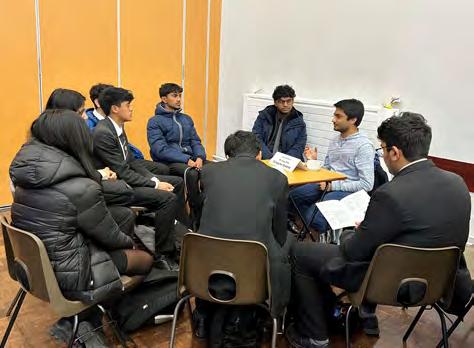
The list of Old Olavians and their respective fields, such as Finance, Medical School, Investment Banking, Journalism, Computer Science, and more, showcases the richness of experiences that students had the chance to explore. This event not only provided practical career guidance but also fostered a sense of connection between current students and alumni.
The effort put into organizing and executing such an event is truly commendable, and it is heartening to see the positive impact it has on the school community. The collaboration between generations in this way creates a supportive environment for students as they navigate their future paths.
Those who were involved this year were: Daniel Bimson (2004) - Civil Engineering, Paul Edwards (1983)Finance and working for a charity, Dr Alan Grundy (1969) - St George’s Medical School & The Royal College of Radiologists, George Hall (2016) - KPMG Careers, Dr Stephen Lockwood (1963) - Marine Science, Vincent Pang (2012) - Investment Banking, Adelia Rakhimova (2013) - The Big Four, Neil Sears (1986) – Journalism, Fawaz Shah (2017) - Computer Science, Bloomberg, Jeff Tong (2007) - TV Broadcasting
From Sruthe, one of the students - I just wanted to tell you about the two wonderful conversations I had with professionals during the speed networking sessions. One of them was a retired consultant radiologist and the other was in computer science (I believe he was working at Bloomberg).
I had a really insightful conversation with the radiologist. It was interesting to hear about his career pathway, from medical school to consultant, and the experience he had working with St George’s Medical school. We were discussing the different course structures available for a degree in Medicine and which one appealed to him the most, as well as the various interview formats. It was
inspiring to hear him say that he loved his career and definitely thought it was worth the struggles he faced as a junior doctor and beyond.
My conversation with the computer scientist was also very enjoyable. I was really interested in hearing about his university experience, as he left it quite recently. I was surprised to hear that even the biologists at his university had to take programming modules eventually in order to continue with their studies - it was a great example of how useful knowledge of computer science is today, no matter what your education and career choices are.
It was a pleasure to meet both professionals and I am incredibly grateful for their time. I hope my feedback will be useful for future events such as this.
Here are the experiences of some of the Old Olavians:
Stephen Lockwood (1956-64): Some readers may recall that a few months ago OOs received a request from the school to take part in a careers fair at StOGS for what many of us knew, and I continue to think of, as 5th and 6th formers (Years 11+). I assumed, not unreasonably, that many of my peers would take part to offer their advice and experience for the major professions – medicine, law, finance – but suspected that there were unlikely to be many, if any, contributions from professional biologists, least of all anyone with a marine fisheries background. With this in mind, I offered to take part and cover marine science (and engineering as much of my later career was spent working alongside engineers engaged in coastal defence, port developments, tidal power barrages and offshore wind farms). At a late stage, I was also asked if I was willing to give a talk about my career to the assembled throng of Year 10.
Was it worth it? Indeed it was, not least the talk to Year 10 who were attentive throughout and asked some very pertinent questions at the end. At the risk of selfaggrandisement, I can also report that I was given not just a polite round of applause at the conclusion of events but a cacophony of whoops, hollers and cheers, the like of which I have not experienced before. (Scientific assemblies, local WIs and Rotary clubs tend to be much more subdued.) In contrast, the careers fair itself was more restrained but the interest in what I had to say and questions asked no less pertinent nor searching than before: what was most satisfying – publishing the results of research work; what was most memorable – being attacked by a 15 foot crocodile at Lake Turkana, Kenya; what was least enjoyable – listening helplessly to the ship’s radio as a cadet sailing ship 100 miles away foundered before any rescue vessel could reach it.
There were fewer OOs taking part than I expected, which was disappointing. When the call goes out in future, I would urge anyone to give it serious consideration, no matter what career path you chose. There is bound to be some of the current Olavians who would be interested in hearing what you have to say.
Alan Grundy (1962-69) Retired Consultant Radiologist, St George’s Hospital and Medical School: In response to an Old Olavians’ newsletter a few months ago, I volunteered to go along to the recent Careers fair held at the School. I went to answer questions about Medicine as a career and also to share my long association with St George’s Medical School.
I had five groups of about eight or nine school members for about ten minutes at a time. Some of them were a little surprised that I myself was an Old Olavian. I explained a little about the current interview format adopted by some Medical Schools but my main message was not to dissuade people from a career in Medicine but to emphasise that I had no regrets about entering Medicine and how I had thoroughly enjoyed my choice of career and had no regrets about what I had done. I hope I managed to pass on my enthusiasm for a career in Medicine to prospective Students.
Daniel Bimson (2004): On Friday 10 November, I made the once-familiar journey to Orpington station and on to the school. I had been invited for the second year in a row to support the school’s careers fair and speed networking event to talk about my career in civil engineering and talk about the routes into it and why it is a great career choice. Despite it being almost twenty years since leaving the school, the Great Hall still felt as familiar as ever and was soon humming with the noise of Years 9 and 10 chatting away with all of the professionals who had generously given up their time to talk to the students.
Although the majority of students were not initially clear on what civil engineering entails, once I explained the wide variety of work and critical importance of it, I was very impressed with how engaged and inquisitive the students were. They wanted to know everything from what A-levels I studied through to my proudest career moment and how much engineers earn (answer: probably not enough!). If the students are anything like I was at age fourteen or fifteen then they probably do not really know what they want to do, but I hope that I was able to open up their eyes to the potential of careers in engineering. It was a lot of talking, so I was grateful for the drinks and biscuits kindly provided by the PA to keep me refreshed.
After the end of period 6 it was time for Years 11-13, and for this session I was doing speed networking with slightly larger groups of students, again extolling the virtues of
engineering careers and civil engineering in particular. There were a number of students already interested in applying to engineering degree courses, which was great to hear, and I hope I was able to give them some useful advice and further encouragement to pursue this. I think that even in the groups where there was not any huge interest in engineering, the videos of Tunnel Boring Machines kept them engaged.
I really hope that the students found the afternoon as valuable and enjoyable as I did and with any luck, I will have helped to inspire a few more into engineering careers. It was a really well-run event and I would encourage anyone with a passion for their career sector to consider supporting it in the future.
Adelia Rakhimova (2013): I had the pleasure of attending the Careers Fair at St Olave’s, where former students, parents and other professional volunteers were invited to share their career experiences and answer questions about their respective industries for Year 9-Year 13 students.
It was a great opportunity to give something back to the school, reconnect with Old-Olavians and former teachers and of course inspire the next generation with my career journey in the Big 4 (or give advice on how to avoid mistakes that I once made). Many thanks to the school for providing such a great reason to visit and I hope to be back next year with a few more of my cohort!
Jeff Tong (2007): I had a great time sharing my experiences in TV Broadcasting to the Years 9 to 13 students during the Careers Fair, I wish I had done this sooner. I think the students really appreciated the information coming from Old Olavians; there is a special connection formed from this mutual educational experience. There was an immense sense of enjoyable nostalgia being back in the Great Hall, despite leaving 16 years ago everything felt so familiar!
Neal Sears (1986): The St Olave’s careers fair can be surprisingly exhausting – as the pupils are told before touring the desks that they MUST come armed with plenty of questions.
In the younger year groups, be warned, they are instructed to travel in packs, and arrive in front of you mob-handed, up to four at once. So a barrage sometimes ensues. And some of their questions end up being extremely pertinent.
‘Have you ever written a report you don’t fully agree with?’ Well, as it happens…
Hang on, I thought, I’m usually the one asking the questions.
To my mild surprise, there was actually more interest in my journalism desk from the younger boys. It seems that in 2023, by the time they are in the Fifth or Sixth forms, new-fangled Years 11 to 13, they have already decided what they want to do. And making money appears to be a not unreasonable priority.
That probably explains why some shied away from my holey cardigan, fading newspaper cuttings, and halfhearted assurance that if they were any good at journalism they ‘probably would not starve’. There was meanwhile a lot of interest around the City of London and finance-type desks next door to me.
Mind you, the accountancy bloke with the longest queue was cheating by offering free pens and sweets. And he had a flag. Yeah, that was probably it.
On Monday 12 February thirty-one Old Olavians, all Tooley Street boys, visited the old School.
One of that number, Nigel Smith (1968), uploaded a video to YouTube (https://youtu.be/QKVLhx-hFI4) and another, Richard Norman (1962), was moved to write a thank you to one of the organisers, Mike Roberts (1965). Read on to see what memories had been stirred.
First and most important thank you so much for organising, or as you have it, helping to, organise the visit on Monday. I had been there before on a visit that Jane Wells had organised after Commemoration Day in Southwark Cathedral in 2012 (Wow! 12 years ago now and before we moved down here so I had much more time).

Whilst I had been told of the Old Man’s early demise I had not seen the newspaper article before so thank you for that as well. I was aware whilst at school that RCC spent ‘all his summer holidays’ in Italy and at Pompeii. However, I was not aware how revered he was out there until Penny and I went there - at last – in 2014! We had holidayed in Italy many times and I had also been there on business. I had always thought of venturing that far south but had simply not made it – life got in the way. (It must be like an Italian
coming to London and thinking of going to Inverness.)
Also, I only became aware of Two Schools much later–bought and read it – helped my understanding of the man whom I clearly let down
Recently I have even come to appreciate some of the punishments – most of the poetry that I can recite was learnt for attendance ‘on the balcony’! and even maybe putting my head in the chair as he selected the cane that he was going to use and decided how often! Did I deserve it? Probably.
This chair, behind his desk, must have sat there is now a bath – very suitable, and he might not be ‘turning in his grave’ as I said, as one of the best preserved/restored buildings in Pompeii is the ‘public’ baths. I have no idea how or indeed why I found out his home address in Sydenham (near Crystal Palace) whilst at the school.
However, I decided to go and have a look so cycled there, up the hill – not too far from my home in Camberwell. I did not of course venture even into the front garden but now have the image in my mind of the open porch/portico with the two large ‘Roman’ pillars, one each side, on brick plinths!
The visit also brought back memories of ‘Benny’ Hill, the plays and other theatrical productions; the lighting systems, phones etc. And it was amusing that the sixth form common room is now the loo (it would no longer accommodate the current sixth form which must cover at least half of the new school’s area). It brought back my offer to assassinate RCC with my imaginary gun as we discussed Descartes, and RCC put Des’s proposition (to paraphrase) that we are simply the product of our own imaginations!
The chess club in Geoff Chapman’s room (was that 4 or 5R?) and the visit of some grand master or other who played with us all – set up in a square. I was an early if not his first defeat – still no good at chess – even my grandson beats me today.
Other memories include: Nobby Clark’s room, Boggy Newmarch (he of the thrown chalk and board cleaner), Jet Morgan (who had to have his desk on a dais so that he could see us all), George Collins (and CCF) AG Buck, ‘Taffy’ Stephens. The Davies domain - the gym, with the balcony where we changed. Above the metal and woodwork rooms with the print shop in the corner. The lecture theatre with the photographic room below. And, yes, the paneling and other wood looked so much better light than as it is now dark oak
And finally and unexpectedly on the train home I met my
daughter so was dropped off saving Penny from a trip out in the cold! Many thanks to all again.
Richard Norman (1962)
On Saturday nearly fifty Old Olavians (the youngest amongst them, by coincidence also “nearly fifty”) met for a very special occasion which epitomised the incredible bond of community which this school kindles in its alumni. For a generation of Olavians, former teacher Stephen Davies was Music at St Olave’s. He lived, breathed and dreamed music with an enthusiasm, an intensity and a sense of urgency which was utterly contagious and which inspired the deepest affection and gratitude in his pupils – even those who would claim not to have a musical bone in their body. Stephen was Head of Music from 1977 to 1994 and oversaw an incredibly vibrant and joyful period in the musical life of the school. As his 80th birthday approached, Old Olavians planned a surprise birthday party and concert for him to be given by – themselves, Stephen’s former pupils.

With weeks of careful planning (which itself was great fun and a lovely opportunity to catch up with old friends), and with a little gentle subterfuge facilitated by his wife, Stephen arrived at the School Chapel under utterly falsified pretences on a perfect, glorious summer afternoon to find, to his considerable surprise and delight, a whole host of Olavian faces from yesteryear, and a concert designed just for him involving: jazz, barbershop, a virtuoso cello solo (Happy Birthday delivered in the style of J.S. Bach –Stephen’s favourite!), the Brandenburg Concerto (in which Stephen was invited to join in on the viola – which he did with characteristic gusto) and concluded by a hymn in four part harmony with bespoke lyrics celebrating his incredible contribution to the life of the school, and the enduring
impact and inspiration it has had on so very many fortunate former pupils. Stephen even got to conduct his former pupils for one item, a moment which created a feeling which it is hard to put into words, but the best I can do is to say it felt like coming home after a period of absence, with all the warm and fuzzy connotations that brings. The celebration then moved on to a food and drinks reception (hosted by Old Olavian Ralph Barlow) which went on happily into the evening of that faultless summer day.
Organisers and participants could not have been happier that the guest of honour so thoroughly enjoyed himself, that the whole thing remained a surprise as planned, and that the man himself felt moved to say the following words at the end of the concert: “The best time of my life was with you lads. It was a sheer joy and a privilege to actually teach you. It was fantastic. I know you see things through rosetinted spectacles, but it was…marvellous. It really was. So thank you.”
Stephen, on behalf of the organisers and participants, the feeling is utterly reciprocated. It was lovely and right to be able to share something of how much it all meant to us – and of what a difference to our lives it has made, and continues to make, to have been taught by you. Thank you.
David Budds (1994) Deputy Headteacher
So, after 116 years of touring, since 1908, the Old Olavians cricket tour finally had to bow to the winds of time, changing attitudes and lifestyle patterns, indefinitely postponed touring in 2024, due to having run out of players. Our connections with the school had long since ceased to produce any new cricketers, and our existing tourists were all getting older, and without a new source of players it was only a matter of time before it became impossible to carry on, despite loyal assistance from our friends at ODCUACO CC who kept the show going a few years longer than it would have otherwise. I wonder what Pa Brownlow and his intrepid crew who boarded the open-topped charabanc “The Gladiator” to chug leisurely down from London to far-off Devon on that first tour would have thought? Would they have been proud that the traditions that they started so long ago had survived to the far future of the next century, or sad that it had come to an end?
Probably a bit of both. I do find myself wondering about all the tours that occurred in the past - all the characters and stories that we will never know about. We have handed the tour archives to the School and they should now be in the new Archive Room, and there is a marvellous book in there that, amongst details of many matches and club goings-on, has detailed profiles on each of the players
from 1911. An example is of one JDE Collins, who was a founding member of the tour. He is described with great affection as being something of a tour mascot and great value on the long journeys for his stories of his time as a “mounted territorial”. He was an excellent bowler (figures quoted as 294 overs, 58 maidens and a scarcely-believable 95 wickets at an average of 13.4) and an attacking batsman who used to put fast bowlers off by standing two yards out of his crease. One morning he was missing from breakfast, and his clothes were found on the beach. Apparently since it was Collins nobody was worried, and sure enough he turned up after a bit, having spontaneously decided to try to swim to the pier and back, a distance of about two miles. He used to have no end of observations and ideas and would enthusiastically defend them during after-dinner strolls, such as his views on the “flat earth theory”. During one game at Exeter a shepherd in the field next door was having no luck cornering a sheep, and it escaped onto the outfield, and Collins had it collared in about ten seconds and handed it back. I did happen to exchange emails with Barbara Collins, his granddaughter, a few years back, and she claimed he would have been “so delighted to know that the cricket club would still be going strong all these years later”, so that is the closest we will come to knowing their thoughts.
Tour has meant something different to everyone who has been on it. My first tour was 1991 when I was 14 years old, although I didn’t play until the next year. Since then, I have had the honour of playing in about 130 tour matches (full statistics lost from 2006/2007), about equal to Brian Hurdle (1959-89), and only surpassed by our esteemed editor John Brown (1958-2002) and my father Ian Giles (1967-2022) who have both played about 145 times. Most of the games are now just a blur, but some moments still stand out clearly - a few good shots, a few drops (not many catches), a sprinkling of wickets. I can picture Brian Cantle leaping like a salmon at gully to take a brilliant catch low to the ground to dismiss one of Sidmouth’s opening batsmen off one of our quick bowlers, breaking his finger in the process and having to sit out the rest of the game. I think this was in 2007, when he had been retired from cricket for a few years and his body had long before hoisted the white flag, and he was only on the field because it was the centenary fixture.
I remember what I think was Ray Michael’s (1964-2018) last act on a cricket field, at Kenn in 2018, when Kenn were smashing us to all parts and our old friend Jimbo Gosling was in typically destructive form, and he belted the ball for what seemed certain to be a straight, flat six when Ray’s body did one of those blurring-shimmers seen in the Matrix films, as he suddenly dived to his right and intercepted the ball to take the smoothest of catches. It was remarkable he was not carried the final twenty yards to
the boundary by the momentum of the ball. But even more memorable than this was the Keystone Cops routine that Ray and Terry Smith performed while batting together, nine wickets down, on the last ball of the first innings of an earlier Kenn game. I was holding an ancient video camera and I will always kick myself for not thinking to have it rolling, because the exact motions were far funnier than you could script. It went something like this: Ray edges a ball to third man, and they both set off for a run. At some point Terry decides it’s not on, so turns around and heads back to the bowler’s end. Ray carries on running. They both realise this at about the same time, and both turn around and head back to the keeper’s end. Terry slams his brakes on again, and heads back to the bowler’s end, but in his haste he drops his bat. He panics a bit, and turns and heads back to retrieve it. Ray thinks he is going for the run again, and sets off... then both manage to somehow get back to their original ends without being run out. Dot ball.
Most of the playing moments I remember are individual flashes of brilliance, hilarious mix-ups or match-changing innings in adverse circumstances, such as the partnership between Ralph Patel (64*) and Ian Giles (33*) to win us the game against our old friends at Sandford in 2001 after we had been reduced to 40 for seven. Or Chris Swadkin’s 51 against the same opponents in 2009, when their South African fast bowling pro Mostert had taken a couple of quick wickets and fully expected to take another one swiftly as the unimposing sexagenarian with the white wispy beard took guard to shore up our middle order. He gave Swaddy a brisk short one to soften him up, and was no doubt surprised to see it swatted casually to the far midwicket boundary. So he sent down another bouncer, even quicker, and was probably infuriated to see this one pulled even more vigorously for four with all the time in the world. He noticeably lengthened his run-up and came steaming in again and what he felt when he got cracked to exactly the same point on the boundary again is probably only expressible in Afrikaans. This continued for some time.
Perhaps the bravest innings I saw, though, was also at Sandford (possibly in the same game) when Dave Colloff was asked to open the batting after a particularly rousing evening the night before. Fuelled with maybe two hours’ sleep and nursing a hangover on the kind of scale that makes tying your own shoes a seriously arduous task, Dave faced a fast bowler who would have been comfortably 25 mph quicker than anything he would have encountered at home for Petts Wood in the lowly regional leagues. Zing! went the ball as it left the bowler’s hand, bounced, past Dave’s head and thudded into the keeper’s gloves. Swish went Dave’s bat, considerably afterwards, as he attempted to hook it. After a second ball, with the same result, Dave
cleared his throat a little and said, “Yes, maybe a helmet would be a good idea, can someone send one out?” One of the joys of tour was the way it allowed a cricketer who usually plays in, for example, an average 3rd XI at home to test themselves against a young Devonian firebrand with aspirations of being a professional cricketer, or a current pro filling in his winter months abroad, or a seasoned Premier cricketer with twenty years’ experience of dominating the strongest Devon teams behind him, and how often the average 3rd XI player rose wonderfully to the task. Not always, but often.
However, just as important as all the cricketing memories were all the pub lunches and after-game dinners together with all the rest of the tour party – wives, girlfriends, children, grandparents - and all the morning activities and the chats in cars travelling to and from games, all the musings and story-telling sitting in chairs waiting for the rain clouds to dissipate. I have warm recollections as a youth of wandering the friendly streets of Teignmouth at sunset, with the crying of seagulls as they arced overhead and the smell of sea salt in the air, strolling across the square to the Trade Winds for dinner and seeing familiar laughing faces through the windows of the Pickwick as we noticed an advance party who were already sat down in that pub. Having a brilliant time on our table, but a bit regretful to be missing the chat going on in the other party too (we couldn’t often all sit together in one group as there were too many of us). Then everyone heading back to the Belvedere Hotel, and cramming into their small lounge with the bar in the corner until the wee hours, sitting on each other’s knees and jostling for position and the stories getting louder and longer and even the ones you’ve heard before just getting funnier each time you hear them.
Fellow tourists became your family for a week, and the regular tourists who you saw every year became almost a permanent extended family. I consider it such a privilege to have got to know so many amazing characters through tour. There are not many occasions when genuine, often lifelong, friendships can develop between strangers of sometimes great age difference, men and women and boys and girls, and that’s what tour provided, through the bonding powers of humour and shared endeavour. As a boy growing up, peer-groups can often be a bit cliquey or naturally limited in perspective, and sitting down listening to Terry Smith and Pete Smith guffawing at how they were banned from the Jolly Roger pub for a disagreement about the ingredients of a Bloody Mary, and then returning the next year with a neat little leather case containing Worcestershire sauce, Tabasco, pepper and celery salt and happily instructing the barman on how to make a proper one, is the sort of experience that just doesn’t come up. Likewise, the sight of Derek Birmingham and Brian Cantle crashing a song evening at the Cavendish Hotel and dancing to La Bamba as if they were a matador and his bull will also
live long in the memory. Neil Simon once wrote, “Never underestimate the stimulation of eccentricity”, and I think that is absolutely right - it was so much fun knowing such puckish characters as Geoff Tooby, or more gentle eccentrics like our tour umpires Tom Baterip, Bert Casey and Stephen Parsons. There were lots of types of humour that I hadn’t encountered before. I remember being tremendously amused by the trick of reversing the first letters of someone’s name, so Bert Casey would be Curt Basey, and an earlier tourist called Mike Baker became Bike Maker. Funny how little things tickle you sometimes. There was a tour umpire back in the day who used to give a batsman’s guard by saying “left a shade, left a shade, right a shade...” so he became Fred A’Shade. Marvellous! I think Ray Michael took particular glee at this.
I feel it is such a shame and a great loss that OO tour has come to an end. The country in general needs every avenue available to it for binding people together, and promoting friendships, goodwill and humour, especially across different age groups, as there are more divisive influences about than ever before. The current figure is eighty pub closures a month. Cricket and rugby participation seems to be regarded as less and less important in schools. “Friendly” Sunday cricket is far less prevalent than it used to be. I know not everyone in the country can come on a cricket tour, but every little helps! And anyone who would have come would have had their mind broadened and felt a bit more human as a result of it, as well as having a stash of happy memories to take home. If you had the impossible task to sum up everything that was good about England in one example, I would say that OOs’ tour was it, and it should really have been protected and preserved by some kind of act of parliament.
There is one bright side to mention - there was actually a tour this year. Long-time tourist Paul Flower said he would try to get his club Chipstead, Coulsdon and Walcountians to take on our fixture list, and with the help of Tom Parsons and his club, Tintagel, along with two genuine Old Olavians in Ian and Lance Giles, the four games were indeed played. We lost three and won one, and a fine time was had by all. The win was against Sandford, off the last ball of the game, having required thirty off the last two overs, eight wickets down and with an Old Olavian at the crease, so in a sense the OOs won the last contest for the Stan Newell Trophy (although it will still be played for in future fixtures) so Brian and the other OOs Up There have bragging rights over Stan as they look down on future games.
It’s still early days, but hopefully the fixture list can be preserved this way, and many more people can happily come down on tour, even if it is not under the auspices of the Old Olavians. It is the end of an era, but hopefully the beginning of another one. And who knows? In that
aforementioned book in the archives there is a letter from Percy Brownlow to the school, dated 30th November 1891, where he informs with deep regret of the “disestablishment of the above club [the Old Olavians’ cricket club]” owing to the scarcity of ‘playing members’”, four years after its institution in 1888. It evidently reformed shortly afterwards, and 133 years later it is going through similar woes. So there is a precedent for phoenix-like resurrection, and maybe there will be yet a third coming of the Old Olavians some time in the future. They will have a proud history to look back on.
Lance Giles (1988-95)
Old Olavians Cricket Tour since 1908 I attended my first OOs tour in 1958, the fiftieth anniversary of the first in 1908. At that time the year 1908 seemed like ancient history, but now that I have lived for another fifty years – and more, I realise that it is not such a long time. My first match was at Yeovil, a venue where we stopped on our way down to Devon in those pre-motorway days. Yeovil’s wicket-keeper was one Harold Gimblett, a hardhitting batter who had opened the batting for Somerset and England in his younger days. I remember him speaking a few kind words of encouragement to a nervous and inexperienced young player while I was batting.
The tour was a wonderful experience, and it came to play a huge part in my life. I was lucky enough to captain the team for eleven years, and thus to play a large part in the organisation of the tour with responsibility for team selection and doing my best to ensure that all tourists, no matter what their ability, had a fair chance of contributing to the team’s fortunes.
When I started playing for the Old Olavians, the team had a full set of Saturday fixtures around south London and the neighbouring counties. The team was strong and went for one period of thirty matches without defeat. In the late sixties, however, the first leagues were established in the home counties and this meant that some of the better Olavian players were attracted to those clubs which played at the highest club level. Since the Old Olavians did not have their own ground they were unable to join a league, and it was realised that the decision made by club members, some thirty years earlier, not to buy a playing field which was on offer for about £2000 was now a matter for some regret.
Still the tour went on and some of those stronger players would take a week’s holiday to join the tour party in Teignmouth. The tour continued to be a successful and popular week of cricket, but gradually the numbers making themselves available dwindled, and it became more difficult to attract the better players when they left school. There
were a few loyal players who did their utmost to keep the tour going, but they found that they were relying more and more on non-Olavian players from different clubs, and that the tour was no longer what it had been in the early years.
And so it came, the inevitable, but understandable decision to call the tour off for 2024. It was a sad day, but those who were lucky enough to have been able to enjoy the pleasure of playing good competitive cricket in Devon and making friends with like-minded opponents and supporters will never forget.
The Fives club continues to thrive, running the Saturday morning club session throughout the year and fulfilling a full fixture list in the first, second, and third adult divisions. It has been especially pleasing to see so many recent leavers representing the Old Olavians and also playing for various universities and other clubs too.

Although it remains desperately disappointing that courts seven and eight are still not in existence, the recent addition of two more courts has already had a major impact on our capacity to host matches and practices. We often now enjoy hosting a three-pair match alongside club morning or indeed two team matches at once. It really is an amazing atmosphere in the Court complex with so much going on.
A big highlight of the season is not so much what we won, but more the fact that the number of players involved with the club continues to grow. Special thanks go to Dominic Robson and Dominique Redmond who run and organise most of the league teams and do such a great job keeping in touch with and inviting players from our large database to take part in various matches. The club’s visit to play the Olavian Cambridge University students was a recent initiative and a huge success!

With regards to success on the court at the highest level; it was a year of near-misses! The Old Olavians have ruled supreme for the past couple of decades nearly always finding a way to come through against our closest rivals. The Old Westminsters have cultivated a really superb team who edged past us for the first time in both the Barber Cup (three-pair men’s nationals) and indeed the Kinnaird Cup also (men’s National doubles). It was good to see James Toop and Matthew Wiseman in a desperately close men’s nationals semi-final which was lost by the narrowest of margins to the eventual winners of the prestigious Kinnaird Cup.
At this point, we must hail the extraordinary achievement of Sebastian Cooley for having won the Kinnaird Cup for the past thirteen years in a row, surpassing the seemingly impossible record already set by the great John Reynolds, of eleven consecutive wins. Seb and his partner were runnersup this year in what was their fourteenth consecutive final. It is a record that is very unlikely to ever be equalled. Meanwhile, congratulations to Charlotta Cooley, who extended her similarly impressive run in the ladies’ nationals.
Finally, it was just fantastic to see such a large and young Olavian presence at the Eton Fives Association’s hundredth anniversary dinner held at Lords Cricket ground. The sport is in great health and all Olavians can be proud at the fact that St Olave’s and the Old Olavian Fives club have played a major role in contributing to the overall health of the sport.

at Lord’s
Francisco Ariza (1936-2024), a Spanish teacher at StOGS, died in May 2024. Peter Leaver writes that this was a big blow to him, as an ex-pupil, who had been taught to love the language, history and culture of Spain.
Francisco took a group from the school on their first visit to Spain in 1964, and he went on to have a very successful teaching career at university level.
Tom Baterip (1951-58) died on 21st February 2024. His son, Paul, sent this sad news: “Dad was so proud of his association with the School, being, I think, the only pupil from his school, Victory Place Primary School, in Bermondsey to get a place at St Olave’s when it was in Tooley Street in 1951. He was then a long-serving Old Olavian cricketer (opening batsman and left-arm spin bowler as I remember) and took me to St Olave’s in Orpington when I was a youngster to practise with him in the nets once a week with a coke in the bar afterwards (!), and also to watch many games.”
Ray Michael (1955-63) wrote the following tribute in a letter to Paul: “I knew your father when we were at St Olave’s, although he was about three years ahead of me. I remember him batting for the school first team against the Masters in the regular end of year cricket match, and I played cricket with him for several years when we were both in the OOs 2nd XI in the 1960s and 70s. Later, he became a regular stalwart on the Old Olavians Devon Tour for quite a few years, by which time he had taken up umpiring!

Tom Baterip (with Bert Casey) on tour
“Tom was a well-liked member of the cricket club over many years, and was known mainly for his very correct and resolute defence as an opening batsman. On a personal level, he was also known for his dry wit, his steady driving, and his great love of organ music. He would often go off from Devon Tour to listen to an organ concert in one of the local churches, or even Exeter Cathedral! He will be missed by his many friends in the Old Olavians.”
Peter Batten (1952):
David Alexander Beaman (1963-69): Friends will be very sad to hear that Dave Beaman died in November 2023. From school Dave went to Exeter University where he studied politics and then qualified as a teacher in Crewe. He began his successful teaching career on the Isle of Wight before moving to Wiltshire where he was deputy headteacher of the Sheldon School. Despite being otherwise fit and healthy, Dave was diagnosed with an incurable brain tumour in August 2022. He fought the illness with incredible bravery. He was a loving family man who leaves his wife, Sue, and two sons from a previous marriage and two grandchildren.
Alan Evans (Staff 1973-2008):
Headteacher, Andrew Rees wrote: It is with sadness that I share the news that retired Head of History, Alan Evans, has died. He was Head of History until 2008. He was also a regular attendee of the Old Olavian lunch and music concerts.

Steven Richard Gill (1967-74) died on 28th August 2024. His younger brother, Chris, has written the following tribute: “My brother, Steve, died at The Princess Royal University Hospital in Farnborough.

Peter’s Olavian was returned with an anonymous note advising that he had passed away. He was a regular contributor to the Whistler, a Brighton local newsletter, in which he sometimes referred to his schooldays with warmth. John Brown (Hon Editor) remembers meeting up with Peter several times when Derbyshire were playing Sussex on the south coast. He especially admired Peter’s fortitude in overcoming the tracheotomy which he had needed quite early in his life.
“He was seven years older than me and so I never shared StOGS with him. He was one of the new boys from Orpington who had to commute up to Tooley Street until the site at Goddington was ready to accept pupils. Steve loved rugby - he played for Old Olavians and other local clubs and also followed the British and Irish Lions on many tours, several of which he organised himself.
“His later years were blighted by dementia and I am forever grateful for his many friends in the area who looked out for him and took care of him. He once, literally, saved my life - I love my life now and I owe that to him. “
Steve’s friend, Keith Ridge (1967-74), has been given permission by the family to write his own tribute which follows: “I attended the school and played rugby for the OORFC at the same time as Steve. His funeral was very well attended and the number of shared photographs and eulogies is a tribute to the popularity of Steve.”
“After his years at school Steve went to Bristol University
where he studied Economics and Accountancy. He also became the yard-of-ale champion two years in a row which was the first time that had ever been achieved. From university he had various accountancy jobs in South East London before becoming the company accountant at A.C. Wilgar Plumbing and Heating in 1996 until his retirement in 2018.”
“With regards to Steve’s sporting achievements, he was an accomplished cross-country runner representing North Kent in his formative years, and in his teenage years he was a trophy-winning helmsman at Thamesmead Sailing Club His ultimate sporting love was rugby union and he played hooker for Old Olavians RFC and Molins RFC. He was both an uncompromising member of the front row union and also a rarity – a front row forward with wit and gravitas!”
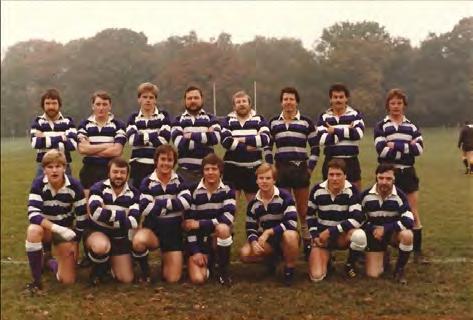
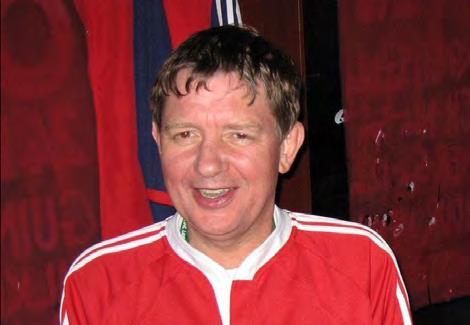
Chris Hasler (1978 – 1985): Sarah Hasler wrote to tell us that her husband had died on 24th April 2024 aged 56. His friend, Mark Cousins, has written the following tribute: “Chris was born on 12th July 1967 in Farnborough and spent his childhood in Orpington, attending Warren Road Primary School then St Olave’s, along with his younger brother Andrew, where he met many lifelong friends, particularly Mark Cousins and Darrell Woods. At school Chris developed his love for physics, the field in which he made his career, and as a keen tenor voice in the choir and barbershop group, was at the heart of musical life. His comic turn as Sergeant Merryll in the 1984 production of Yeomen of the Guard has lived long in the memory of those present.”
“Steve was an avid traveller and amongst his many journeys were five trips to support the British and Irish Lions and going on the final voyage of the QE2 to New York. He was a very private person who possessed an incredible intellect and an amazing memory for the smallest detail. He put these talents to good use, not least the clearing out of the quiz machine in his favourite haunt, The Maxwell, Orpington. In fact he was so good that the brewery removed the machine after six weeks!”
“Steve also had a kind and generous side to him that he modestly kept to himself. He was very supportive of those that needed it. Unfortunately, following his retirement, Steve was diagnosed with dementia. He had a fall at Christmas 2023 after which he needed a hip replacement. His health declined and he was never able to return to his home.”
“Steve will be much missed by his family and many friends.”
“After school Chris obtained an HND from Coventry Polytechnic then a degree in Physics from the University of Bath, where, alongside academic pursuits, he was elected President of the Parachuting Club, a pursuit he had taken up to conquer a fear of heights. After graduating, Chris embarked on his career in the NHS, an institution in which he wholeheartedly believed, as a medical physicist and it was whilst working at the Royal Sussex County Hospital in Brighton, that Chris met his beloved wife Sarah, who was, and still is, a nurse. Having accepted the offer of a role at one of his suppliers, Chris and Sarah moved to the Chilterns and were married in April 1998.”
“Chris’s career then went global, in a role installing medical software in hospitals all over the world, based out of Ottawa, where his son Tom was born in March 2002 and daughter Eleanor in September 2005. After the spell in Canada, Chris’s job became centred in Europe, so the family moved to Brussels and then back to the UK and the NHS, having accepted a role as medical physicist in the Radiotherapy Department of the Musgrove Park Hospital in Taunton. The family was now settled in Somerset and typically Chris threw himself into local life as a key member of the hospital choir and local orienteering club, as well as a spell as a school governor.”
“Whilst living and working in Taunton Chris was first diagnosed with a spinal ependymoma, a cancer-like tumour, accepting his treatment regime with characteristic fortitude. The treatment was successful, but after a few precious years with his family, Chris’s tumour reappeared and despite the best efforts of the medics, this time it was not going away. In his last couple of years Chris continued to lead an active life, including the job he loved, and attending a “Class of ‘85” reunion in London as well as an Arsenal game with Mark and Darrell until lack of mobility in the final ten or so months forced his early retirement.”
“With Sarah, Tom and Eleanor caring for him until the end, Chris was able to spend his last days at home with frequent visits from his parents, Andrew and friends to help keep his spirits up. Classmates Mark, Darrell and Ian Healey attended Chris’s funeral in Taunton on 15th May followed by an appropriately joyful reception. The class of ’85 will be meeting later in the summer to remember a dear friend, Chris”.
David Humphreys (1948):
Adrian, David’s son, advised us that that David had died on 8th June 2024 He had remained independent, but had unfortunately fallen recently and sustained some serious injuries from which he never recovered.

Colin Jeynes (1950-55) died towards the end of 2023. Robert Matthew-Walker (1950-55) sent this sad news: “It is difficult to write without emotion in attempting to pen some thoughts about Colin Jeynes, who passed away at the end of November following a trip to India and Pakistan where it is thought he contracted the virus from which he died. His passing was all the more utterly unexpected, as I had had lunch with him at the Royal Garden on October 8, following the annual choristers’ reunion Morning Service at the King’s Chapel of the Savoy in the Strand.”
“For over seventy years, the trebles in the choir of that Chapel have been drawn from boys at St Olave’s, and Colin and I were two of the ten trebles of the first post-war Chapel Choir, which was selected in 1951 from the main St Olave’s choir by the then-new School’s Music Master, Gerald Wheeler – who was, of course, also organist at the morning and afternoon assemblies. Gerald Wheeler was a fine musician, a good conductor and pianist – at one morning assembly, he played Rachmaninoff’s Second Piano Concerto complete with the orchestral part played on the organ by a very musically-gifted boy whose name I
forget. Wheeler was determined to improve the St Olave’s choir, getting us to sing all of the Messiah choruses, and the then brand-new (and difficult!) Choral Dances from Britten’s 1953 Coronation Opera Gloriana – the St Olave’s choir actually gave the first public performance of this work, drawn by Britten from his new opera, in September 1953.”
“Colin and I were in the group selected for the Britten premiere, but more significantly, Wheeler had managed to get a smaller group (drawn from the main school choir, of course) to sing in a performance of Constant Lambert’s The Rio Grande, for piano, chorus and orchestra – and he chose Colin to sing the two solo sections of that work. The pianist was a sixth-form pupil, and the orchestral part was played by the boy who had performed the orchestral reduction in the Rachmaninoff Concerto – I am afraid I have forgotten both pupils’ names, but they were equally very gifted musically. Incidentally, The Rio Grande calls for a big percussion section – in 1953, it appeared to the more staid members of the audience (including the infamous Dr Carrington) that then very modern rock-and-roll rhythms had entered that fine old building in Tooley Street for the first time! I don’t think Dr Carrington entirely approved of The Rio Grande – to judge by the look on his face after the performance, but I well remember Colin’s fearless and very fine singing of the solo parts in the work – it suited Colin’s voice to a T.”
“The choir of the Savoy Chapel, being – I think – a Royal Peculiar, traditionally sung at the Coronation Services of 1911 and 1937 (there are extant photographs of the then-choristers preparing for those Coronations), but only two boys were chosen from the choir in 1953 (by Gerald Wheeler) to sing at her late Majesty’s enthronement. This was regarded at the time as being very unfair – we (the other boys that is, as well as the Chapel’s Verger) felt we all ought to have sung at the Abbey. But there were good musical reasons for the reduction: the choir we were in was still new, and the Master of the Music at the Chapel (Dr Henry Bromley-Derry, who was also principal of the London College of Music and had been Grand Lodge Organist of English Freemasons for almost twenty years) was beginning to suffer from the cancer which eventually killed him – although our initial training under him was superb and quite unforgettable. When he could no longer train us, I must admit our standards fell – the temporary organist and choirmaster, whose name I now forget, was nowhere near in the same class as Bromley-Derry.
“In short, the Savoy Chapel as a body of singers was simply not good enough to sing at the Queen’s Coronation, but as representatives, Gerald Wheeler was detailed to select two boys to sing at Westminster Abbey – and this is where I think Wheeler’s inexperience (this was in late 1952)
showed – we all had to sing a solo, and Wheeler’s choice of the two boys - Brian Mick and (I think) Paul Woodhouse – was not popular amongst us, and certainly not popular for Colin Jeynes – who made his objections very well known to Wheeler, the chapel clergy and the boys themselves – indeed, Colin objected to such an extent that I felt he might very well get into trouble!”
“Colin’s reasoning was understandable: he was the senior treble on the Decani side, the Head Boy; I was senior of the Cantoris boys, and he felt we both should have been chosen. I was not so upset myself, as the dreaded onset of puberty had begun to affect my voice, but Colin possessed a really fine voice – as Wheeler virtually admitted by selecting him for The Rio Grande solos – and I can recall his outstanding account of Mendelssohn’s Hear My Prayer (the complete eight-minute version) – at Matins one Sunday – Colin was truly exceptional, and was rewarded by five shillings in the vestry afterwards!”
“And so we parted on leaving school. I knew that Colin came from a big family in Eltham, close by where I lived at the time, but I knew nothing of his later life until I saw him being interviewed on television about some local government matter in the 1960s (I think it was somewhere in Essex).”
“By a very circuitous route (after moving house several times) I was contacted many years later by the Savoy Chapel regarding the Choristers’ Reunion Service (held annually, then on the Second Sunday in July – 2023 was the first year it was changed to October); about a dozen or so years ago. At one of them, I was astonished to overhear a man saying to someone else, ‘I’m Colin Jeynes’. It was Colin, of course, proudly wearing his head chorister’s medal.”
“And so we were reunited. Every year, we sought each other out, climbing the few stairs in the vestry to look at our Christmas 1955 photograph of the Chapel choir boys – ten of us, I think. In that group are Frank Armer (with whom I reconnected five years later in the Army doing my National Service) and Martin Carthy (who went on to have a very distinguished career as a folk singer). Indeed, it was Martin who was instrumental in getting Paul Simon signed to CBS in the UK in the mid-1960s (I have since published a book on Simon and Garfunkel, where I expand a little on Martin’s part in this) – Paul Simon’s first CBS album, a solo effort, was recorded entirely in London, without Art Garfunkel, thanks to Martin.”
“And so we boys went on to live our adult lives across many fields – I think that Colin’s distinguished career in local government, especially in Doncaster, a place he came to love very much, was enhanced and supported by his own musical gifts, which were by no means insignificant, and
which I am pleased to recall with affection and admiration after more than seventy years.”
Keith Johnson (1964-1971) died in September 2024. His, brother-in-law, David Girling (1975) sent the sad news with the following tribute: “Keith was diagnosed with stage 4 Pancreatic Cancer only a few weeks before succumbing to the disease. He died, as per his wishes, at home in Ringwood, and his final days were made as comfortable as possible by an excellent team of Macmillan nurses.”

“Keith had a full and interesting career. After leaving St Olave’s he did an undergraduate degree in Politics and International studies at Southampton University and went on to do a PhD in European studies at Corpus Christi College Cambridge. Around this time he married my sister, Jan Girling, at All Saints Church in Orpington.”
“Keith went onto work at various universities where he taught and became involved in the local community. His final academic position was as Pro Vice Chancellor for External Affairs at Southampton Solent University. However, along the way Keith also set up and ran a successful marketing consultancy providing services to the EU. Keith was a massive Europhile. He spoke French fluently and travelled extensively across Europe.”
“Jan and Keith had two sons, Adam and Michael. Adam works in publishing in Oxford whilst Michael is deputy head of a school in Toronto. Jan and Keith enjoyed their retirement in Ringwood especially with their DDOs [Dorset Days Out], their garden and their frequent trips to Toronto to see their lovely grandchildren.”
Dr Rex Pogson (Deputy Headmaster 1980-85):

Stephen Davies, former Head of Music, told us of the sad and sudden death of Dr Rex Pogson on 19 March 2024. He was a well-known and widely loved colleague whose quality of work was so phenomenal that, when he left the school (and went on to be Headteacher at the Lawrence Sheriff School in Rugby), Mr Coulson chose to appoint two new Deputy Heads.
Clive Seabrook (1977): Clive’s sister-in-law let us know that Clive died in August 2023. He had been fighting illness for a few years. At school he was a talented artist and he went on to run his own consultancy business.
Reverend Clive Smith (1961-68) died in 2024 – his eldest son, Jonathan, has written the following tribute: “Clive was much loved by his family, friends and indeed anyone who encountered him. He lived a life of devoted service to God and the most vulnerable in society – often working in environments that others shied away from. Clive leaves a huge void in many people’s lives, but we want to acknowledge a life so very well lived.”
“Born in Portsmouth in the July of 1950, Clive and his family moved to Southwark in 1951 as his father, Ernest had a job as a school keeper following a long career, including service in World War Two, with the Royal Navy.
Clive attended a local primary school, Joseph Lancaster, before passing the Eleven Plus and attending St Olave’s Grammar School for Boys. Clive always spoke warmly of his time at St Olave’s and was so pleased to be able to attend the Commemoration Service at Southwark Cathedral in May this year.”
“Between finishing school and going to university, his vocation to the priesthood developed and so he changed intended course (originally Economics and History) and went to Leeds University in 1969 to read History and Theology. Clive’s time at Leeds was pivotal as he continued to develop his deep faith but also where he met the love of his life, Alison, (not to mention his membership of the University Challenge Team in January 1972). Following University, Clive studied for a Postgraduate Certificate in Education at Christ’s College Liverpool, and he was an assistant teacher of Religious Education at Coopers’ Company and Coburn School, Upminster, in Essex between 1973 and 1975.”
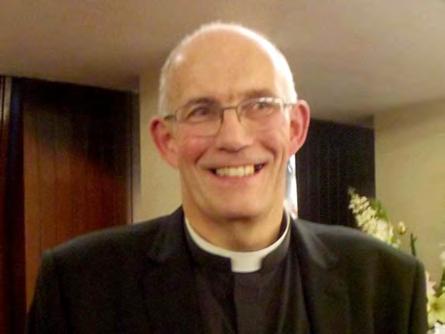
“In 1974 Clive married Alison, and they celebrated their fiftieth wedding anniversary this year with family in London. Between 1975 and 1977 Clive attended the College of Resurrection, Mirfield, West Yorkshire to study
for the priesthood (taught by, amongst others, a young theologian called Rowan Williams). In June 1977 Clive was ordained deacon by Robert Runcie, the then Bishop of St Albans and another future Archbishop of Canterbury who appreciated the man Clive was and his contribution to the Church. Clive’s first role within the Church of England was as curate of St Mary’s Goldington in Bedford. In April 1978 Clive and Alison’s first son Jonathan was born, followed two years later by their second son, Timothy, in 1980. From 1981 to 1984 Clive was senior curate at St Mary’s Cheshunt, Hertfordshire with special responsibility for daughter Church of St Clement’s, Turnford. In 1982, Clive’s third son, Christopher, was born. In 1984 the family moved to Watford and Clive took up the post of vicar of St Peter’s Church.”
“It is perhaps Clive’s next move where he found his real calling. In 1989 he became the chaplain of Leavesden Hospital, a large Victorian asylum that looked after adults with learning difficulties. Clive was also the chaplain of Cell Barnes Hospital, near St Albans. Clive’s devotion and compassion to the residents and staff of both hospitals marked him out as someone special. He was determined to ensure that everyone had the opportunity to lead their very best lives, and he was a source of comfort and support to many.”
“Following the introduction of community care, Clive became trust chaplain of St Albans and Hemel Hempstead NHS Trust (now part of West Hertfordshire Trust) between 1994 and 2001 (he also managed to achieve a postgraduate diploma in healthcare ethics from Kings College London). There then followed a big move to Yorkshire and a new challenge as the senior chaplain for Doncaster Royal Infirmary, a position he held until his retirement in 2014. Clive also squeezed in a MA in Healthcare Chaplaincy from the University of Leeds.”
“After retirement, Clive’s public service continued as he became a part-time chaplain for firstly HMP Moorland and then HMP Lindholme. Whether hospitals, prisons or the many charities he supported, Clive was at his best when he was supporting those often forgotten or marginalised by society. He was a kind, compassionate and humble man who led a life of dedicated service to his family, charitable organisations, his work and ultimately God. He will be hugely missed by everyone who knew him, but he can absolutely look back on his life on earth and say he did his duty.”

Alan Waters (1958-65) died on 18 December 2023. We have heard this sad news from his wife Fiona who has written the following tribute to her husband. “He was born on 16 March 1947 to Doreen and Jack Waters at Queen Charlotte’s Hospital in London. He was a bright young boy who passed his eleven plus and was accepted at St Olave’s Grammar School in 1958. He went on to achieve good A Level results, so was accepted at Edinburgh University to study medicine in 1965.”
“He was awarded an Honours BSc degree in biochemistry in 1968 and MB ChB in 1971 He worked in the professorial surgical unit in The Royal Infirmary and, after a surgical rotation job, he became a neurosurgical registrar in Edinburgh. In 1978 he passed the FRCS of both Edinburgh and London colleges. He was awarded a Master of Surgery degree from Cambridge University for research on cerebrovascular membrane properties after the subarachnoid haemorrhage research he did at the University of Vermont.”
“He became a consultant neurosurgeon at Addenbrooke’s Hospital in an extremely busy regional unit. He was on call every third night and every third weekend when he was often up operating all night. He was well loved by his patients who have written hundreds of letters to him thanking him for saving their lives Even following his death I still get their letters He is much missed by his wife Fiona, his two children and three grandchildren.”
Alan Worrow (1961-68) died at the end of 2023 having suffered from cancer. His lifelong friend, Peter Leaver, told us this sad news. Peter and Alan studied the same A Level subjects, Spanish, French and Latin, together. Peter reports that Alan was the cleverer of the two, and that he was always somewhat in awe of him. Alan went to Cambridge, but only got a Third, and thinks he found life difficult there as an East End boy.
Peter writes that Alan became a primary school teacher in the East End for a while, before switching to IT. He never married or had children. I think he was what the English love to refer to as “a bit eccentric” (!). I saw him quite a few times after I started visiting London regularly in 2001 and until he moved up to the Borders before the pandemic. We got on well as we were both old-fashioned lefties brought up in working-class dockland families - a dying breed!
Tuesday 26th March 2024
Opened at 19.00 Closed at 20.10
Attending: Committee Members Chris Harris (1977Chairman), Paul Ouseley (1977), Bill Prouse (1977), Rajiv Purwar (1977)
Others attending: George Snelgrove (1964), Ian Giles (1966), Lance Giles (1995), Howard Wiseman (1987), Richard Millar (1988), Karen Barnard (OO Admin), John Brown (1955), Andrew Rees (President)
1. Chairman’s Welcome: The Chairman (CH) welcomed the members present online including our President, the Headteacher, Andrew Rees, and our administrator Karen Barnard.
2. Apologies: Walter Wilkinson (1945), Richard Norman (1962), Mike Roberts (1965).
3. Minutes of Last Meeting: The minutes of the last AGM on 14 March 2023 were agreed to be a true record of the meeting and were unanimously approved.
4. Matters Arising: At the last AGM it was agreed it would be a good idea to try to increase subscription income by getting a higher proportion of the 3,000 or so members to pay £20 (or more). This was supported strongly by GS.
Suggestions included giving members reasons to pay something, giving them evidence of what money has already been spent on, asking someone who has run a business to prepare a business plan, flyers on seats at the next reunion. CH agreed to discuss this with the committee and Lucy Crawford at the School. CH apologised as this had not been actioned, and asked those present if anyone was willing to lead on this. There were no volunteers and CH said he would try to pursue this further in the coming year.
We now have a combined list of nearly one hundred distinguished Old Olavians, and further work is needed to get this published on the website. A volunteer was sought to research their actual achievements and finding photos if possible. There were no volunteers.
Membership: 3,558 names on database. Since 2020 we have added all leavers’ names to the website; however, we only correspond with those who actually register as members and ‘Opt in’ to receiving correspondence. In the last twelve months new website users were logging on
at an average rate of about seventeen per month. 2,807 of those registered have a current email address and I continue to try to reconnect with lost members. As at year end 30th September 2023, 339 (337) members paid £20 or more entitling them to the magazine, and a further 151(165) paid something, giving a total of 490 (502) paying £9,253 (9,299) The above includes fourteen sponsorship members, paying £1,134 (£1025). This is a decrease in subscriptions of £46 (£583) on the previous year but, after a larger decrease the previous year, it is thought the amounts are plateauing and may remain around this level in future years.
Society Admin: The School have not found a sole replacement for Veronica, our previous administrator at the School. However, we now have the support of Karen Barnard, who is also assisted by Kay Brooker and Clare Cockshott, when necessary. (All three were at last year’s reunion)
The inspection of the accounts was undertaken by Frank Askham (1977) who was thanked in his absence.
Magazine: Thanks again to John Brown, our editor. Some of you will be aware that the Olavian has been delayed again this year. Our section was edited and delivered on time. CH understands that it will be distributed soon. Contributions for next year can be emailed to John or CH.
The School are looking at the cost of producing the hard copy of the magazine. It is becoming prohibitive, and we are now the main recipients. Online publishing is now so much better than years gone by, and it is significantly cheaper. CH understands the magazine will still exist, but probably only in electronic formats in the future. AR commented that the online reader is good but the School will always print a hard copy if required but the cost is about £7 per head. Suggestions for dealing with this included: A) Making it an “opt-in” to receive a hard copy rather than as at present, an “opt-out” for not receiving it; B) Adding an extra charge for a hard copy, e.g. £5 on top of the £20 subscription; C) Making it clearer that you can opt out of receiving a hard copy and that the online copy is available
Website: Mike Roberts (1965) manages the photo albums. Photos continue to be submitted, and it would be great to see many more. CH thanked Mike, in his absence, for his support on these albums. Members can also submit obituaries, archive material and their own news items, and occasionally do. Most of the news items are put there by CH.
CH asked if anyone has any suggestions, or would like to be involved in the editing/creation of the pages on the site they should please make themselves known.
Newsletters: Currently, these are produced by CH and are sent every other month. There is evidence that these are read, as one vacant post at the School was filled by an OO’s relative and Tessa Molloy, the School’s careers lead has been contacted by a number of OOs that are willing to talk to students. CH is grateful to Ms Molloy for keeping him informed of those contacts.
Giving something back: That steady stream of speakers has been slowly increasing. They visit the School and impart their knowledge and experience, and there is always room in the diary for more volunteers. The PA and OO Careers event last year was particularly well supported by OOs and will be repeated in the Autumn term this year. See the news items on the website for more detail. One particular type of assistance needed is the provision of ‘work experience’ or job shadowing’. If you, or someone you know might be able to help, please let Ms Molloy or CH know. DHW said that he might be able to give ‘work experience’ and CH thanked him and confirmed that Ms Molloy would be in touch.
Archives: The archive room is now kitted out and decorated. A big thank you to Peter Leonard (1977) for liaising with the School and managing this project. All archive materials are now in one place. The room is locked but can be accessed by appointment, by contacting KB. It can also be visited on a tour of the school before the Reunion lunch.
LinkedIn Group: Managed by CH who would welcome support. This now has 741 (719) members and continues to grow. The page is visible to the public, but you still have to request to be a member. However, for it to be a more useful and dynamic group to belong to, members still need to start to post items of interest to the Old Olavian community, including job opportunities and relevant news items.
Facebook and Instagram: Again, feedback to CH would be welcome.
OOs Account: Last year’s donation has not yet been put to use as there are some significant spending plans afoot.
Headteachers Hardship Fund (previously funded from the defunct Marshalls Fund and our Benevolent Fund): These monies are used to make sure that no student misses out on opportunities simply through financial hardship. The Headteacher has control of them, and in the past our Benevolent Fund has made donations. There has been no request for further money from the Benevolent Fund since 2015. However, CH has spoken to Lucy Crawford, and
there is a plan to improve accessibility and it is expected that the Benevolent Fund (see below) will be asked to contribute toward these costs.
7. Finance Report: Society Accounts: As reported earlier total subscriptions are down £46 on last year. However, investment income and deposit interest are both up and actual values of the investments had increased by 10%. The Reunion in September was only subsidised to the tune of just over £570, reduced to just over £270 after Bar profits.
Although not shown in the accounts, we still have some cufflinks and a good stock of ties. Our cash and credit card balances at year end are over £7,000, and this is before the annual subscriptions start to flow in. CH recommended making as much as possible available to the School. So, having regard for our expenses, which will be the website costs, the donations to the cricket club and fives club, cheques issued, and also to the subscription income, he said the Society can afford to make £7,500 available to the school. This includes the sponsorship money and the sales income from Two Schools. CH proposed transferring the funds to the School, and any requests for use of the money to be dealt with by the committee. Seconded by GS and agreed unanimously. We usually make a donation to the OOs Cricket Club to assist with tour expenses. CH proposed again donating £1,000 to the club. Last year HW asked whether we would support the Fives tour with a similar amount to the cricket tour. CH therefore also proposed a donation of £1,000 to assist with tour expenses. Both proposals were seconded by JB and passed unanimously.
Benevolent Fund: The fund has been receiving a GAYE (Give As You Earn) donation (£200+) in the last two years. It is not much, but with the investment income, the fund continues to grow and now has assets valued at nearly £120,000 at the year end. The trustees have not donated any funds to the School in the last eight years for the headteacher to use in cases of hardship and we have received no requests from Old Olavians since we agreed a request for funds - £250 in 2021, although that cheque was never presented. As mentioned above, the trustees may receive a request this year to assist with accessibility in School, which would benefit all necessitous Olavians. Having discussed with the other trustees, it has been decided to take advice on closing the Benevolent Fund. It was not set up with any provisions for its closure, hence the need for advice. We have written to the Revitalising Trusts programme, who give advice on closing charities and charitable trusts. It is proposed that we liquidate the assets and make the funds available to the School for the accessibility projects, or for other projects where the benefit to disadvantaged Olavians can be shown. Any funds made available would have to be used in accordance with these
overriding conditions.
AR commented that the School had access to a Hardship Fund which meant it had not had to ask the Benevolent Fund for a contribution in recent years. There are currently no students with accessibility needs – but this may be because they are discouraged from applying because of the lack of facilities. In discussion, some members thought it would be better to retain at least some of the funds in case a need arose. GS queried whether a lift proposal could be revived. A ceiling on what any one applicant could ask for was also proposed. CH said the trustees would have to come back to the members in general meeting to amend the rules of the Fund or wind it up and they would see what advice was received. Approval of both sets of accounts was proposed by GS and seconded by PO and agreed unanimously.
8. Functions Report
The Annual Service of Commemoration and Thanksgiving saw a good number meeting up for lunch at the Barrowboy and Banker before the service, which CH hoped to repeat this year.
A successful 2023 Reunion was held at the School with guest speaker, Ed Warner (1981). In addition, the outgoing School Captain spoke and was very well received. Our guest this year, again at the beginning of September, will be the fastest man on land. Although he set the record last century, it still stands and he is the only person to have driven a car through the sound barrier. He left the School in 1980 - Wing Commander Andrew Duncan Green OBE is a retired Royal Air Force fighter pilot and the world land speed record holder.
There was a very successful Savoy Choristers Reunion in October with a Hog Roast. Expect a repeat this year.
Although not actually in the year ended 30th September, CH thanked Mike Roberts for organising the Tea and Tour at the Tooley Street site, now a boutique hotel – The LaLit London, in February. CH understands all thirtyone OOs present had a good time.
9.
Rugby – still dormant
Eton Fives –Howard Wiseman said numbers were good, with about 300 members overall, and about 45-50 core players. An extra two courts make a big difference. He felt the club was inclusive, accommodating very good and more average players and Fives playing OOs are promoting and involved all over the country. Plus, OOs represented
both Oxford and Cambridge last year.
Cricket – Ian and Lance Giles reported that the tour was enjoyed by those taking part, but the last two games had to be cancelled due to a shortage of players. The club is struggling as the core ages and particularly needs younger players. It is difficult to get players to go on tour even with a subsidy of costs. Suggestions made included making contact with Orpington Cricket Club, writing to previous school cricket captains and making the tour a joint school/ OO tour.
Lodge and Chapter – Graham Milne was not present but had provided a written report which CH summarised. Both Chapter and Lodge meet in Freemasons’ Hall in Holborn and are gaining members but would particularly welcome OOs. The Old Olavian Chapter meets before the Lodge Meeting on the third Saturdays of January, March and May. They then disperse for lunch before the Lodge meeting. Members of other Chapters are always welcomed.
If you are a member of a Lodge and wish to progress and complete your Masonic career, then please get in touch with Graham.
Many have read the item on the Lodge in 2022’s Olavian; so, I will not repeat the piece by Peter Hudson. Whilst numbers are growing the Lodge would still like to hear from former (male) scholars of the School to find out more about us. It is not a “secret society”, and you can find out about them on line. Some is very true, but there is a lot of mis-information there. The Masons play a big part in supporting “Charity”, with things like the Fire Brigade high ladders in London, together with the Air Ambulances (not only in London).
Graham will help those who wish to know more about our Lodge; he can be contacted through our website.
Chairman Chris Harris, Secretary Bill Prouse, Treasurer Paul Ouseley, Committee members Raj Purwar and Graham Milne
All were willing to stand again so JB proposed and HW seconded the motion to re-elect the entire committee which was passed unanimously.
11. Other Business: The Commemoration Service is on Thursday 2nd May this year. Hopefully some members can meet up for a spot of lunch before the service.
Just a reminder about sharing your experience with current
Olavians and finding work experience/job-shadowing opportunities for them. If you can, or you know someone who might, let CH know.
AR commented on two OOs: The first was one to look out for in this year’s Olympics - Aaron Grandidier Nkanang, a Rugby player representing France and the other, Alex O’Halloran who has been appointed Head of History at the School. See the Headmaster’s Newsletter.
There being no other business, CH declared the meeting closed.
Apologies received from Graham Milne after the meeting as due to technical difficulties he was unable to log into Zoom.
HONORARY OFFICERS 2024
PRESIDENT
Andrew Rees, Headteacher
St Olave’s Grammar School,
Goddington Lane, Orpington, Kent BR6 9SH
Tel: 01689 820101
CHAIRMAN
Chris Harris, 70 Broxbourne Road, Orpington, Kent, BR6 0BA
Tel: 07913 774697 email:chairoldolavians@gmail.com
COMMITTEE MEMBERS
Graham Milne
Paul Ouseley
Bill Prouse
Rajiv Purwar
EDITOR OF THE OLD OLAVIAN
John M Brown, 60 The Lawns, Rolleston-on-Dove, Staffordshire, DE13 9DB
Tel: 01283 813976 e-mail: johnmbrown60@gmail.com
SECRETARIES OF AFFILIATED CLUBS AND SOCIETIES
CRICKET CLUB
Lance Giles, c/o 44 Harwood Avenue, Bromley, Kent, BR1 3DU
Tel: 07891 725488 e-mail: lancegiles@hotmail.com
FIVES CLUB
Howard Wiseman, 7 Genoa Road, Anerley, SE20 8ES
Tel: 020 8778 0752
OLD OLAVIANS’ LODGE (No. 5758)
Andrew Lavery, 126 Cassini Drive, Swindon SN25 2LW
Tel: 07802 631439 email: secretary@oldolavianslodge.org.uk
OLAVIANS’ ROYAL ARCH CHAPTER (No. 5758)
Richard White, 16 Silchester Road, St Leonards-on-Sea TN38 0JB
Tel: 07860415624
email: ScribeE@oldolavianslodge.org.uk
(NB membership of the Chapter is open only to Master Masons, and therefore anyone interested in joining, who is not a Freemason, should approach the Lodge first)
Karen Barnard
email: kbarnard@saintolaves.net










